GET A QUOTE

Do I need travel insurance to go to France?
France remains one of the most famous tourist destinations on the planet today. Its capital — i.e., the iconically romantic city of Paris — is, of course, its most popular among tourists. But along with the Eiffel Tower , the Louvre , Notre Dame , the Champs Elysees, and Disneyland, France has plenty more to offer — both within and beyond Paris. For example, the pristine beaches of the French Riviera . The first-class ski slopes of The French Alps . The high-speed action of the Tour de France. Some of the world’s best vineyards and wines. The most Michelin-starred restaurants in the world. And much, much more.
In other words, if you plan to be one of the dozens of millions of visitors France welcomes each year, prepare to be pleasantly surprised. It will definitely be the trip of a lifetime. And, as such, it’s never a bad idea to have it insured.
- Who needs travel insurance to visit France?
- Why choose AXA Schengen Travel Insurance for France?
- Which AXA plan suits my needs best?
- COVID Restrictions for entering France
- What should I do if I am injured or ill while in France?
- Some more practical tips for visiting France
Who needs travel insurance to visit France?
France is definitely universally famous for having an exquisite culture, an unwavering charm, and — well, that certain je ne sais quoi . But it also happens to have a very rich and unique history. And part of that unique history is that it is one of the five original member countries of the Schengen area (along with Belgium, Germany, the Netherlands, and Luxembourg).
So if you plan to visit France (and/or any other of the 29 countries currently in the Schengen zone) — depending on your nationality and country of origin, you might need a Schengen visa. And to be granted a Schengen Visa , it is mandatory that you have the proper travel insurance .
Which travelers are required to apply for a Schengen visa (and, therefore, travel insurance) to visit France?
You will need a Schengen visa to visit France if you are a national of a country that has not signed a visa waiver agreement with the European Union. This includes several countries from the Maghreb, Africa, Asia, the Middle East, Russia, India, and others.
Citizens of these countries will need both a Schengen visa and the appropriate travel insurance to enter France’s borders.
What are the travel insurance requirements for obtaining a Schengen visa?
To be granted a Schengen visa for France (or anywhere else in the Schengen zone), your insurance must meet the following criteria:
- Guarantee minimum coverage for at least €30,000 in medical expenses
- Cover any expenses which might arise in connection with repatriation for medical reasons
- Cover you in all member states of the Schengen Area (not just France)
- Cover you during the entire duration of your trip and stay in France (and/or the rest of Schengen area).
If you’re not sure whether you need a Schengen visa to enter France or not, you can learn more here .
Ready to subscribe?
GET SCHENGEN INSURANCE
What if I don’t need a Schengen visa (and, therefore, travel insurance) to visit France?
If you happen to be a national of one of the 29 countries within the Schengen zone, you obviously don’t need to apply for a Schengen visa to visit France. Moreover, countries like the U.S , U.K ., Canada , and Australia have visa-free travel agreements with the Schengen area. So if you are a citizen of one (or more) of the above, you don’t need to apply for a visa either — that is if you are spending no more than 90 days in France and/or the other Schengen states. And if you don’t need a Schengen visa, then whether or not you get travel insurance is up to you.
That said, opting for comprehensive travel insurance for your journey is still highly recommended — both by the French authorities and by the embassies of most countries around the world.
For example, if adventure is on your itinerary, you can never be too prepared. Because whether you’re boating or scuba-diving along the French Riviera or hiking or skiing in the Pyrenees , accidents might happen.
And even if your vacation is more of the laid-back variety, travel insurance is still a safe bet. Whether you’re basking in the French Riviera sun, tasting some of that amazing French wine and/or food, or taking that mandatory selfie or three with the Eiffel Tower — you still never know what might go wrong.
Moreover, while France is world-famous for having a great healthcare system (along with one of the highest life expectancies in the world), medical costs for foreigners can still be relatively high . And this is especially true if you need to pay for specific medications and/or prescriptions.
In short, no trip is ever 100% risk-free . And as you discover France and its many wonders, having your potential medical expenses covered will mean one less thing to worry about. Not only that, but it may end up saving you thousands of euros/dollars — not to mention unnecessary stress, worry, and overall health — if something does go wrong.
Why choose AXA Schengen Travel Insurance for France?
Well, first off, AXA happens to be a local! That is, we are a French firm that has been delivering affordable, comprehensive insurance coverage for over 20 years (and counting). As such, when it comes to experience and expertise, we’ve established a longstanding international reputation both within and outside of France. Not to mention a thorough knowledge and understanding of local culture all over the world. But if knowing a well-established and internationally experienced local is not enough, here are a few more reasons why AXA got your back:
- Our plans meet all the necessary requirements for obtaining a Schengen Visa for France .
- If you’re planning a multi-country Eurotrip, our plans cover not only France but all 29 Schengen territories and all 27 European Union countries (as well as the United Kingdom, depending on the chosen insurance)
- Getting an AXA plan is quick, easy, and affordable (starting at just 22€/week). And it can be done online in a matter of minutes .
- We offer up to €100,000 coverage in medical expenses, and up to 180 days of coverage
- We provide 24/7 medical assistance (in English or French) in case of an emergency
- We offer zero deductible (which will allow you to avoid some upfront and early costs with your claim)
- There are no age restrictions with AXA’s plans.
- Once you’ve purchased your AXA plan, you can download (and/or print) the official travel insurance certificate online instantly.
- The AXA i nsurance certificate is accepted at all Schengen embassies and consulates .
- If your Schengen visa for France is denied, AXA’s Travel Insurance plans are refundable in most cases . You’ll just need to provide the appropriate documentation (i.e., an official explanation as to why your visa was refused by the relevant embassy, consulate, or visa application center).
Which AXA plan suits my needs best?
Which plan you choose will depend on the particular nature of your trip. Are you going to France for business, pleasure, or both? Are you traveling solo or with family? How far are you going, how long do you plan to stay, and how adventurous do you plan to be? Whatever the case, AXA offers three comprehensible options for you to choose from — one of which is more than likely to meet all your travel needs:
- Our Low Cost plan provides our most basic coverage and starts from as little as €22 per week . It’s perfect for those going to France on a budget but still hoping to be covered for most basic medical needs. It covers medical expenses of up to €30,000 (in France and the rest of the Schengen Zone), meets all the requirements necessary for obtaining a Schengen Visa, and offers coverage in case of hospitalization or repatriation.
- AXA’s Europe Travel starts at €33 per week , meets all Schengen Visa requirements, and covers medical expenses of up to €100,000 . One major bonus is that Europe Travel covers not only France and all 29 Schengen countries but also all 27 EU countries, the European microstates of Andorra, Monaco, San Marino, and Vatican City, and the UK. The plan also covers you in case of the loss of documents and/or valuables, as well as a number of other problems you might run into during your stay: search and rescue costs, assistance for the insured party traveling alone (hotel for a friend or relative), and so on. Europe Travel is a comprehensive travel insurance policy perfectly designed for those planning to visit as many European countries as possible.
- Our most comprehensive plan — Multi-Trip — starts at €328 for a full year’s coverage . It’s perfect for business travelers and anyone else planning to travel to France and the Schengen area regularly. It offers the same comprehensive coverage as Europe Travel throughout all the Schengen and EU countries, as well as Andorra, Monaco, San Marino, Vatican City, and the U.K. And it’s ideal for multiple-entry visa holders.
Which insurance plans to consider?
Covid restrictions for entering france.
A COVID certificate , negative test result, and/or reason for travel are no longer required to enter France (or its overseas territories) — regardless of where you’re coming from.
Masks are still highly recommended in places like hospitals and retirement homes. But they are also no longer mandatory.
But the rules can still change, so be sure to check the latest info on the official Re-Open EU page.
NOTE: AXA’s plans will cover your medical costs related to coronavirus — provided you haven't traveled against World Health Organization advice, personal medical advice from your doctor, or any other government body’s advice in your home country or the country you are traveling to. In this case, emergency and additional travel costs are also covered.
Furthermore, all electronic certificates purchased and issued on the AXA Schengen site include the following disclaimer: “Medical fees related to COVID-19 are covered in the terms, conditions & exclusions established in the insurance policy”. This will satisfy any embassy rules that state you must get an insurance certificate with COVID protection.
What should I do if I am injured or ill while in France?
Don’t worry - AXA’s Schengen Insurance is here to guide, help, and protect you. In case of a medical emergency, you should contact the AXA Schengen call center at the number provided on your insurance policy . Our medical assistance professionals will answer your questions and advise you 24/7. They’ll also help you find the medical center closest to your location and best suited to your situation.
When you call, be sure to have the following information on hand:
- The number of your policy (which begins with “SCH”).
- The address and telephone number at which you can be reached (and the details of the people that can be contacted locally on your behalf).
- Your dossier number (which is communicated at the time of the first call).
IMPORTANT: Remember to always keep any bills/invoices and enclose them with your file.
What else should I know when preparing my trip to France?
The capital of France is Paris (aka the City of Light, the City of Love, and the Capital of Fashion).
France is a member of the Eurozone; hence, the official currency throughout France — as of January 1st, 2002 — is the Euro (€).
France is generally safe — especially outside of its larger cities. However, you should still take sensible precautions against possible street and/or car crime. For example, don’t keep your passport, credit cards, and other valuables in the same place. Use inside compartments in bags whenever possible, and keep your belongings close to you in restaurants and bars. Stay alert around tourist attractions and cash points. Thieves and pickpockets particularly operate on the Paris metro , and you should be careful when visiting the Stade de France — as gangs are known to operate in the area and violent assaults have occurred nearby.
Public transport:
Public transport in France is of a superb standard, so it’s relatively easy to get around the whole country without a car. Paris has an extensive Metro network, with Lille, Lyon, Marseille, Rennes, and Toulouse also boasting their own rapid transit systems. Most major cities in France have connections to the high-speed network , making this the most popular and efficient mode of French public transportation. Buses and coaches are also good ways to traverse the country — especially for connections from air or rail to mountainous areas. And France also has excellent rail and road links with its Schengen and EU neighbors.
Opening hours:
The standard shopping day in France, from Monday to Saturday, starts at 9 a.m. and finishes at 7 p.m. Most large stores and shopping malls will remain open all day, but smaller establishments often close between 12 and 2 pm for lunch (and this can include shops, banks, and offices). This may be extended during the summer months — particularly in the south (due to the heat).
Driving license:
Your license should be recognized in France for as long as it is valid — but you should check the expiry date just in case. However, in certain cases, your driver’s license may have to be accompanied by an official translation in French (or an international driving license).
Restaurants:
As sometimes shops and services close down for lunchtime, restaurants open up. Most restaurants offer service between 12pm and 2.30pm, and 7.30pm and 9.30pm. In cities, however, you may find restaurants remain open later.
RELATED ARTICLES:
- Do I need a visa to travel to France?
- Is it safe to go to France?
- How to apply for a Schengen visa?
- France travel insurance for U.K. nationals
- How to choose the best Schengen travel insurance
- Schengen travel insurance for Italy
Is France part of the Schengen Zone?
Yes. France is one of the 29 Schengen member states (and it’s also one of 27 members of the European Union).
Where can I apply for a Schengen visa for France?
You can apply for a Schengen visa for France at the French consular authorities, embassies, and/or visa application centers in your country of residence. You can also learn more on the Official visa website for France .
How much does a Schengen visa for France cost?
The cost of a Schengen visa is universal. A Schengen visa for France, therefore, costs 80€ for adults, 40€ for children between the ages of 6 and 12, and is free for children under 6yo.
Does AXA’s Schengen travel insurance cover French overseas territories?
It does not, as they are not in the Schengen Area. Overseas French territorial communities include Martinique, Guadeloupe, Guyane, Reunion Island, Mayotte, Saint-Barthélemy, Saint-Martin, Saint-Pierre and Miquelon, the Wallis and Futuna Islands, and French Polynesia.
Get Schengen insurance
Copyright AXA Assistance 2023 © AXA Assistance is represented by INTER PARTNER ASSISTANCE SA/NV, a public limited liability company governed by Belgian law with registered office at Regentlaan 7, 1000 Brussel, Belgium – Insurance company authorized by the National Bank of Belgium under number 0487 and registered with the Crossroads Bank for Enterprises under number 0415 591 055 – RPR Brussels- VAT BE0415 591 055
AXA Travel Insurance Global | AXA Assicurazione Viaggio | AXA Assurance Voyage | AXA Seguros y asistencia en viajes | AXA Seguro de viagem
You are using an outdated browser. Upgrade your browser today or install Google Chrome Frame to better experience this site.
France Traveler View
The 2024 Summer Olympics will take place in Paris, France, from July 26-August 11, 2024. The Paralympic Games is scheduled for August 28-September 8, 2024. Crowds are expected at these events, and mass gatherings are associated with unique health risks. If you plan to travel to Paris for these events, visit a travel health specialist at least 4-6 weeks before you go to make sure you are up to date on routine and recommended vaccines . The celebratory atmosphere at the Olympics may encourage travelers to engage in risky behaviors, including risky sex. If you have sex with new partners during your trip, take steps to protect one another. Monitor travel warnings and alerts from the U.S. Department of State and consider signing up for the Smart Travelers Enrollment Program .
Travel Health Notices
Vaccines and medicines, non-vaccine-preventable diseases, stay healthy and safe.
- Packing List
After Your Trip
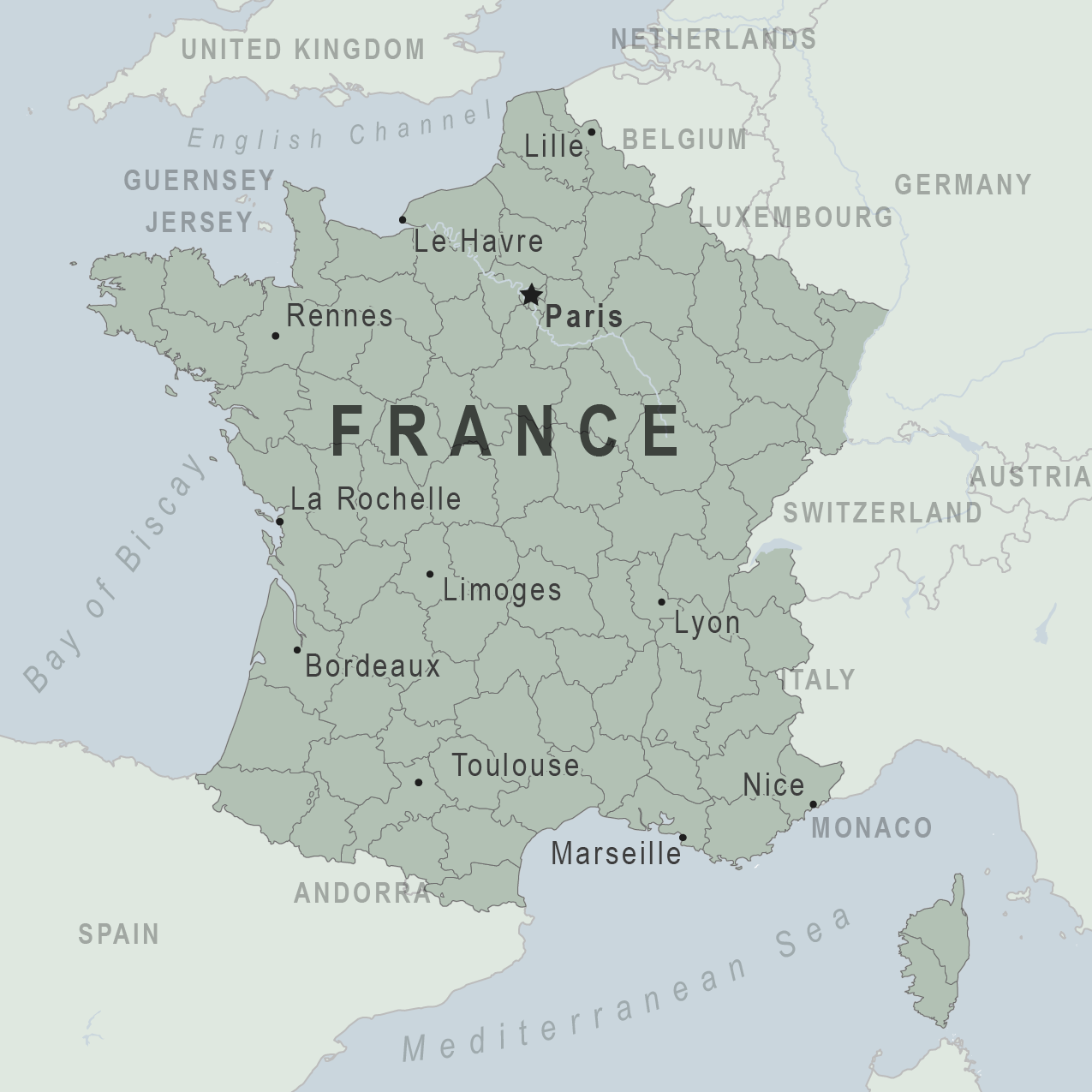
There are no notices currently in effect for France.
⇧ Top
Check the vaccines and medicines list and visit your doctor at least a month before your trip to get vaccines or medicines you may need. If you or your doctor need help finding a location that provides certain vaccines or medicines, visit the Find a Clinic page.
Routine vaccines
Recommendations.
Make sure you are up-to-date on all routine vaccines before every trip. Some of these vaccines include
- Chickenpox (Varicella)
- Diphtheria-Tetanus-Pertussis
- Flu (influenza)
- Measles-Mumps-Rubella (MMR)
Immunization schedules
All eligible travelers should be up to date with their COVID-19 vaccines. Please see Your COVID-19 Vaccination for more information.
COVID-19 vaccine
Hepatitis A
Consider hepatitis A vaccination for most travelers. It is recommended for travelers who will be doing higher risk activities, such as visiting smaller cities, villages, or rural areas where a traveler might get infected through food or water. It is recommended for travelers who plan on eating street food.
Hepatitis A - CDC Yellow Book
Dosing info - Hep A
Hepatitis B
Recommended for unvaccinated travelers younger than 60 years old traveling to France. Unvaccinated travelers 60 years and older may get vaccinated before traveling to France.
Hepatitis B - CDC Yellow Book
Dosing info - Hep B
Cases of measles are on the rise worldwide. Travelers are at risk of measles if they have not been fully vaccinated at least two weeks prior to departure, or have not had measles in the past, and travel internationally to areas where measles is spreading.
All international travelers should be fully vaccinated against measles with the measles-mumps-rubella (MMR) vaccine, including an early dose for infants 6–11 months, according to CDC’s measles vaccination recommendations for international travel .
Measles (Rubeola) - CDC Yellow Book
Dogs infected with rabies are not commonly found in France.
If rabies exposures occur while in France, rabies vaccines are typically available throughout most of the country.
Rabies pre-exposure vaccination considerations include whether travelers 1) will be performing occupational or recreational activities that increase risk for exposure to potentially rabid animals and 2) might have difficulty getting prompt access to safe post-exposure prophylaxis.
Please consult with a healthcare provider to determine whether you should receive pre-exposure vaccination before travel.
For more information, see country rabies status assessments .
Rabies - CDC Yellow Book
Tick-borne Encephalitis
Avoid bug bites.
Learn more about tick-borne encephalitis at your destination .
Tick-borne Encephalitis - CDC Yellow Book
Avoid contaminated water
Leptospirosis
How most people get sick (most common modes of transmission)
- Touching urine or other body fluids from an animal infected with leptospirosis
- Swimming or wading in urine-contaminated fresh water, or contact with urine-contaminated mud
- Drinking water or eating food contaminated with animal urine
- Avoid contaminated water and soil
- Avoid floodwater
Clinical Guidance
Leishmaniasis
- Sand fly bite
- Avoid Bug Bites
- Mosquito bite
- An infected pregnant woman can spread it to her unborn baby
Airborne & droplet
- Breathing in air or accidentally eating food contaminated with the urine, droppings, or saliva of infected rodents
- Bite from an infected rodent
- Less commonly, being around someone sick with hantavirus (only occurs with Andes virus)
- Avoid rodents and areas where they live
- Avoid sick people
Parvovirus B19
- Virus droplets from a cough or sneeze getting in your eyes, nose, or mouth
- Direct contact with the virus, like kissing the face of a child with parvovirus B19
- Touching a surface with the virus on it, like a doorknob, and then touching your face before washing your hands
- An infected pregnant person can spread it to their unborn baby
- Wash your hands often with soap and water
- Avoid touching your eyes, nose, and mouth
- Avoid crowded areas where you may be unable to maintain physical distance
- People who are pregnant , have blood disorders (e.g. sickle cell or thalassemia), or are immunocompromised are at higher risk for severe disease. If you are in these groups and are exposed to or contract parvovirus B-19, contact your healthcare provider.
Prevention and Treatment
Tuberculosis (TB)
- Breathe in TB bacteria that is in the air from an infected and contagious person coughing, speaking, or singing.
Learn actions you can take to stay healthy and safe on your trip. Vaccines cannot protect you from many diseases in France, so your behaviors are important.
Eat and drink safely
Food and water standards around the world vary based on the destination. Standards may also differ within a country and risk may change depending on activity type (e.g., hiking versus business trip). You can learn more about safe food and drink choices when traveling by accessing the resources below.
- Choose Safe Food and Drinks When Traveling
- Water Treatment Options When Hiking, Camping or Traveling
- Global Water, Sanitation and Hygiene | Healthy Water
- Avoid Contaminated Water During Travel
You can also visit the Department of State Country Information Pages for additional information about food and water safety.
Prevent bug bites
Although France is an industrialized country, bug bites here can still spread diseases. Just as you would in the United States, try to avoid bug bites while spending time outside or in wooded areas.
What can I do to prevent bug bites?
- Cover exposed skin by wearing long-sleeved shirts, long pants, and hats.
- Use an appropriate insect repellent (see below).
- Consider using permethrin-treated clothing and gear if spending a lot of time outside. Do not use permethrin directly on skin.
What type of insect repellent should I use?
- FOR PROTECTION AGAINST TICKS AND MOSQUITOES: Use a repellent that contains 20% or more DEET for protection that lasts up to several hours.
- Picaridin (also known as KBR 3023, Bayrepel, and icaridin)
- Oil of lemon eucalyptus (OLE) or para-menthane-diol (PMD)
- 2-undecanone
- Always use insect repellent as directed.
What should I do if I am bitten by bugs?
- Avoid scratching bug bites, and apply hydrocortisone cream or calamine lotion to reduce the itching.
- Check your entire body for ticks after outdoor activity. Be sure to remove ticks properly.
What can I do to avoid bed bugs?
Although bed bugs do not carry disease, they are an annoyance. See our information page about avoiding bug bites for some easy tips to avoid them. For more information on bed bugs, see Bed Bugs .
For more detailed information on avoiding bug bites, see Avoid Bug Bites .
Stay safe outdoors
If your travel plans in France include outdoor activities, take these steps to stay safe and healthy during your trip:
- Stay alert to changing weather conditions and adjust your plans if conditions become unsafe.
- Prepare for activities by wearing the right clothes and packing protective items, such as bug spray, sunscreen, and a basic first aid kit.
- Consider learning basic first aid and CPR before travel. Bring a travel health kit with items appropriate for your activities.
- If you are outside for many hours in the heat, eat salty snacks and drink water to stay hydrated and replace salt lost through sweating.
- Protect yourself from UV radiation : use sunscreen with an SPF of at least 15, wear protective clothing, and seek shade during the hottest time of day (10 a.m.–4 p.m.).
- Be especially careful during summer months and at high elevation. Because sunlight reflects off snow, sand, and water, sun exposure may be increased during activities like skiing, swimming, and sailing.
- Very cold temperatures can be dangerous. Dress in layers and cover heads, hands, and feet properly if you are visiting a cold location.
Stay safe around water
- Swim only in designated swimming areas. Obey lifeguards and warning flags on beaches.
- Do not dive into shallow water.
- Avoid swallowing water when swimming. Untreated water can carry germs that make you sick.
- Practice safe boating—follow all boating safety laws, do not drink alcohol if you are driving a boat, and always wear a life jacket.
Keep away from animals
Most animals avoid people, but they may attack if they feel threatened, are protecting their young or territory, or if they are injured or ill. Animal bites and scratches can lead to serious diseases such as rabies.
Follow these tips to protect yourself:
- Do not touch or feed any animals you do not know.
- Do not allow animals to lick open wounds, and do not get animal saliva in your eyes or mouth.
- Avoid rodents and their urine and feces.
- Traveling pets should be supervised closely and not allowed to come in contact with local animals.
- If you wake in a room with a bat, seek medical care immediately. Bat bites may be hard to see.
All animals can pose a threat, but be extra careful around dogs, bats, monkeys, sea animals such as jellyfish, and snakes. If you are bitten or scratched by an animal, immediately:
- Wash the wound with soap and clean water.
- Go to a doctor right away.
- Tell your doctor about your injury when you get back to the United States.
Reduce your exposure to germs
Follow these tips to avoid getting sick or spreading illness to others while traveling:
- Wash your hands often, especially before eating.
- If soap and water aren’t available, clean hands with hand sanitizer (containing at least 60% alcohol).
- Don’t touch your eyes, nose, or mouth. If you need to touch your face, make sure your hands are clean.
- Cover your mouth and nose with a tissue or your sleeve (not your hands) when coughing or sneezing.
- Try to avoid contact with people who are sick.
- If you are sick, stay home or in your hotel room, unless you need medical care.
Avoid sharing body fluids
Diseases can be spread through body fluids, such as saliva, blood, vomit, and semen.
Protect yourself:
- Use latex condoms correctly.
- Do not inject drugs.
- Limit alcohol consumption. People take more risks when intoxicated.
- Do not share needles or any devices that can break the skin. That includes needles for tattoos, piercings, and acupuncture.
- If you receive medical or dental care, make sure the equipment is disinfected or sanitized.
Know how to get medical care while traveling
Plan for how you will get health care during your trip, should the need arise:
- Carry a list of local doctors and hospitals at your destination.
- Review your health insurance plan to determine what medical services it would cover during your trip. Consider purchasing travel health and medical evacuation insurance for things your regular insurance will not cover.
- Carry a card that identifies, in the local language, your blood type, chronic conditions or serious allergies, and the generic names of any medicines you take.
- Bring copies of your prescriptions for medicine and for eye glasses and contact lenses.
- Some prescription drugs may be illegal in other countries. Call France’s embassy to verify that all of your prescription(s) are legal to bring with you.
- Bring all the medicines (including over-the-counter medicines) you think you might need during your trip, including extra in case of travel delays. Ask your doctor to help you get prescriptions filled early if you need to.
Many foreign hospitals and clinics are accredited by the Joint Commission International. A list of accredited facilities is available at their website ( www.jointcommissioninternational.org ).
Select safe transportation
Motor vehicle crashes are the #1 killer of healthy US citizens in foreign countries.
Be smart when you are traveling on foot.
- Use sidewalks and marked crosswalks.
- Pay attention to the traffic around you, especially in crowded areas.
- Remember, people on foot do not always have the right of way in other countries.
Riding/Driving
Choose a safe vehicle.
- Choose official taxis or public transportation, such as trains and buses.
- Make sure there are seatbelts.
- Avoid overcrowded, overloaded, top-heavy buses and minivans.
- Avoid riding on motorcycles or motorbikes, especially motorbike taxis. (Many crashes are caused by inexperienced motorbike drivers.)
- Choose newer vehicles—they may have more safety features, such as airbags, and be more reliable.
- Choose larger vehicles, which may provide more protection in crashes.
Think about the driver.
- Do not drive after drinking alcohol or ride with someone who has been drinking.
- Consider hiring a licensed, trained driver familiar with the area.
- Arrange payment before departing.
Follow basic safety tips.
- Wear a seatbelt at all times.
- Sit in the back seat of cars and taxis.
- When on motorbikes or bicycles, always wear a helmet. (Bring a helmet from home, if needed.)
- Do not use a cell phone or text while driving (illegal in many countries).
- Travel during daylight hours only, especially in rural areas.
- If you choose to drive a vehicle in France, learn the local traffic laws and have the proper paperwork.
- Get any driving permits and insurance you may need. Get an International Driving Permit (IDP). Carry the IDP and a US-issued driver's license at all times.
- Check with your auto insurance policy's international coverage, and get more coverage if needed. Make sure you have liability insurance.
- Avoid using local, unscheduled aircraft.
- If possible, fly on larger planes (more than 30 seats); larger airplanes are more likely to have regular safety inspections.
- Try to schedule flights during daylight hours and in good weather.
Helpful Resources
Road Safety Overseas (Information from the US Department of State): Includes tips on driving in other countries, International Driving Permits, auto insurance, and other resources.
The Association for International Road Travel has country-specific Road Travel Reports available for most countries for a minimal fee.
Maintain personal security
Use the same common sense traveling overseas that you would at home, and always stay alert and aware of your surroundings.
Before you leave
- Research your destination(s), including local laws, customs, and culture.
- Monitor travel advisories and alerts and read travel tips from the US Department of State.
- Enroll in the Smart Traveler Enrollment Program (STEP) .
- Leave a copy of your itinerary, contact information, credit cards, and passport with someone at home.
- Pack as light as possible, and leave at home any item you could not replace.
While at your destination(s)
- Carry contact information for the nearest US embassy or consulate .
- Carry a photocopy of your passport and entry stamp; leave the actual passport securely in your hotel.
- Follow all local laws and social customs.
- Do not wear expensive clothing or jewelry.
- Always keep hotel doors locked, and store valuables in secure areas.
- If possible, choose hotel rooms between the 2nd and 6th floors.
Healthy Travel Packing List
Use the Healthy Travel Packing List for France for a list of health-related items to consider packing for your trip. Talk to your doctor about which items are most important for you.
Why does CDC recommend packing these health-related items?
It’s best to be prepared to prevent and treat common illnesses and injuries. Some supplies and medicines may be difficult to find at your destination, may have different names, or may have different ingredients than what you normally use.
If you are not feeling well after your trip, you may need to see a doctor. If you need help finding a travel medicine specialist, see Find a Clinic . Be sure to tell your doctor about your travel, including where you went and what you did on your trip. Also tell your doctor if you were bitten or scratched by an animal while traveling.
For more information on what to do if you are sick after your trip, see Getting Sick after Travel .
Map Disclaimer - The boundaries and names shown and the designations used on maps do not imply the expression of any opinion whatsoever on the part of the Centers for Disease Control and Prevention concerning the legal status of any country, territory, city or area or of its authorities, or concerning the delimitation of its frontiers or boundaries. Approximate border lines for which there may not yet be full agreement are generally marked.
Other Destinations
If you need help finding travel information:
Message & data rates may apply. CDC Privacy Policy
File Formats Help:
- Adobe PDF file
- Microsoft PowerPoint file
- Microsoft Word file
- Microsoft Excel file
- Audio/Video file
- Apple Quicktime file
- RealPlayer file
- Zip Archive file
Exit Notification / Disclaimer Policy
- The Centers for Disease Control and Prevention (CDC) cannot attest to the accuracy of a non-federal website.
- Linking to a non-federal website does not constitute an endorsement by CDC or any of its employees of the sponsors or the information and products presented on the website.
- You will be subject to the destination website's privacy policy when you follow the link.
- CDC is not responsible for Section 508 compliance (accessibility) on other federal or private website.
- Best Travel Insurance 2024
- Cheapest Travel Insurance
- Trip Cancellation Insurance
- Cancel for Any Reason Insurance
- Seniors' Travel Insurance
- Annual Travel Insurance
- Cruise Insurance
- COVID-19 Travel Insurance
- Travel Medical Insurance
- Medical Evacuation Insurance
- Pregnancy Travel Insurance
- Pre-existing Conditions Insurance
- Mexico Travel Insurance
- Italy Travel Insurance
- France Travel Insurance
- Spain Travel Insurance
- Canada Travel Insurance
- UK Travel Insurance
- Germany Travel Insurance
- Bahamas Travel Insurance
- Costa Rica Travel Insurance
- Disney Travel Insurance
- Schengen Travel Insurance
- Is travel insurance worth it?
- Average cost of travel insurance
- Is airline flight insurance worth it?
- Places to travel without a passport
- All travel insurance guides
- Best Pet Insurance 2024
- Cheap Pet Insurance
- Cat Insurance
- Pet Dental Insurance
- Pet Insurance That Pays Vets Directly
- Pet Insurance For Pre-Existing Conditions
- Pet Insurance with No Waiting Period
- Paw Protect Review
- Spot Pet Insurance Review
- Embrace Pet Insurance Review
- Healthy Paws Pet Insurance Review
- Pets Best Insurance Review
- Lemonade Pet Insurance Review
- Pumpkin Pet Insurance Review
- Fetch Pet Insurance Review
- Figo Pet Insurance Review
- CarePlus by Chewy Review
- MetLife Pet Insurance Review
- Average cost of pet insurance
- What does pet insurance cover?
- Is pet insurance worth it?
- How much do cat vaccinations cost?
- How much do dog vaccinations cost?
- All pet insurance guides
- Best Business Insurance 2024
- Business Owner Policy (BOP)
- General Liability Insurance
- E&O Professional Liability Insurance
- Workers' Compensation Insurance
- Commercial Property Insurance
- Cyber Liability Insurance
- Inland Marine Insurance
- Commercial Auto Insurance
- Product Liability Insurance
- Commercial Umbrella Insurance
- Fidelity Bond Insurance
- Business Personal Property Insurance
- Medical Malpractice insurance
- California Workers' Compensation Insurance
- Contractor's Insurance
- Home-Based Business Insurance
- Sole Proprietor's Insurance
- Handyman's Insurance
- Photographer's Insurance
- Esthetician's Insurance
- Salon Insurance
- Personal Trainer's Insurance
- Electrician's Insurance
- E-commerce Business Insurance
- Landscaper's Insurance
- Best Credit Cards of 2024
- Best Credit Card Sign-Up Bonuses
- Best Instant Approval Credit Cards
- Best Cash Back Credit Cards
- Best Rewards Credit Cards
- Best Credit Cards for Bad Credit
- Best Balance Transfer Credit Cards
- Best College Student Credit Cards
- Best 0% APR Credit Cards
- Best First Credit Cards
- Best No Annual Fee Cards
- Best Travel Credit Cards
- Best Hotel Credit Cards
- Best American Express Cards
- Best Amex Delta SkyMiles Cards
- Best American Express Business Cards
- Best Capital One Cards
- Best Capital One Business Cards
- Best Chase Cards
- Best Chase Business Cards
- Best Citi Credit Cards
- Best U.S. Bank Cards
- Best Discover Cards
- Amex Platinum Card Review
- Amex Gold Card Review
- Amex Blue Cash Preferred Review
- Amex Blue Cash Everyday Review
- Capital One Venture Card Review
- Capital One Venture X Card Review
- Capital One SavorOne Card Review
- Capital One Quicksilver Card Review
- Chase Sapphire Reserve Review
- Chase Sapphire Preferred Review
- United Explorer Review
- United Club Infinite Review
- Amex Gold vs. Platinum
- Amex Platinum vs. Chase Sapphire Reserve
- Capital One Venture vs. Venture X
- Capital One Venture X vs. Chase Sapphire Reserve
- Capital One SavorOne vs. Quicksilver
- Chase Sapphire Preferred vs. Capital One Venture
- Chase Sapphire Preferred vs. Amex Gold
- Delta Reserve vs. Amex Platinum
- Chase Sapphire Preferred vs. Reserve
- How to Get Amex Pre-Approval
- Amex Travel Insurance Explained
- Chase Sapphire Travel Insurance Guide
- Chase Pay Yourself Back
- CLEAR vs. TSA PreCheck
- Global Entry vs. TSA Precheck
- Costco Payment Methods
- All Credit Card Guides
- Raisin (SaveBetter) Interest Rates
- Citibank Savings Account Interest Rate
- Capital One Savings Account Interest Rate
- American Express Savings Account Interest Rate
- Western Alliance Savings Account Interest Rate
- Barclays Savings Account Interest Rate
- Discover Savings Account Interest Rate
- Chase Savings Account Interest Rate
- U.S. Bank Savings Account Interest Rate
- Marcus Savings Account Interest Rate
- Synchrony Bank Savings Account Interest Rate
- Ally Savings Account Interest Rate
- Bank of America Savings Account Interest Rate
- Wells Fargo Savings Account Interest Rates
- SoFi Savings Account Interest Rate
- UFB Direct Savings Account Interest Rate
- Best Savings Accounts & Interest Rates
- Best High Yield Savings Accounts
- Best 7% Interest Savings Accounts
- Best 5% Interest Savings Accounts
- Savings Interest Calculator
- Emergency Fund Calculator
- Pros and Cons of High-Yield Savings Accounts
- Types of Savings Accounts
- Is Savings Account Interest Taxable?
- Checking vs Savings Accounts
- Average Savings by Age
- How Much Should I Have in Savings?
- How to Save Money
- Compare Best Checking Accounts
- Compare Online Checking Accounts
- Best Business Checking Accounts
- Compare Best Teen Checking Accounts
- Best Student Checking Accounts
- Best Joint Checking Accounts
- Best Second Chance Checking Accounts
- Chase Checking Account Review
- Bluevine Business Checking Review
- Amex Rewards Checking Account Review
- Best Money Market Accounts
- U.S. Bank Money Market Account
- Money Market vs. Savings Account
- Best CD Rates
- Best 1-Year CD Rates
- Best 6-Month CD Rates
- Best 3-Month CD Rates
- 6% CD Rates
- Synchrony Bank CD Rates
- Capital One CD Rates
- Barclays CD Rates
- All Insurance Guides
On This Page
- Key takeaways
Do Americans need travel insurance for France?
Best france travel insurance plans according to us, how much is travel insurance for france, what does france travel insurance cover, what does france travel insurance not cover, tips for choosing the best travel insurance for france, france travel information & requirements, tips for visiting france, france travel insurance faqs, related topics.
Best Travel Insurance for France Vacations in 2024
- Travel insurance is not required for France unless your trip is over than 3 months. (See Schengen travel visa requirements for more info).
- France almost never accepts U.S. health insurance. Therefore, medical travel insurance is a must to cover you for medical emergencies.
- Based on our research, the best travel insurance for France comes from: Tin Leg, Travel Insured International, Generali, Nationwide, Cat70, & Seven Corners ( skip ahead to see these plans ) .
- Expect travel delays, disruptions, and heightened crowds as France hosts the 2024 Summer Olympics this year (July 26th to August 11th).
- Comprehensive travel insurance can cover travel delays and disruptions including delays from French transportation strikes, public train/transport failures, congestion caused by the recent prohibition of many domestic flights, and more.
- If you plan to stay in France for more than 90 days , you’ll need to obtain a Schengen travel visa , which requires a minimum amount of insurance coverage for medical expenses and repatriation.
- We recommend using an online comparison tool to get quotes from multiple travel insurance providers at once.
Whether you’re in the mood for art museums or world-class beaches, France has something for everyone. If you have a trip coming up, it’s important to purchase the best travel insurance beforehand, as there’s always a chance that you’ll have an emergency while you’re overseas.
We created this guide to help you learn more about the best travel insurance for France, such as:
- Do you need travel insurance for France?
- How much travel insurance costs for France
- What travel insurance includes (and what not)
Here is a quick recap of the best travel insurance plans we recommend for France.
Our top picks for the best france travel insurance
- Generali Global Assistance: Best Value Travel Insurance
- Tin Leg: Best Rated Travel Insurance
- Travel Insured International: Best for Medical Evacutation Coverage
- Nationwide Mutual Insurance Company: Best for Claims Reiumbursement
- Cat 70: Best for Plans for Pre-Exisitng Conditions
- Seven Corners: Best Comprehensive Travel Insurance Plan
Our selection of the best travel insurance for France
Generali global assistance.
Travel Insured International
Travel insurance is not a legal requirement for traveling to France unless you plan to stay for longer than 90 days, but it’s highly recommended.
Most U.S. health insurance won’t cover you while abroad. Therefore, at a minimum, we recommended you opt for medical travel insurance when visiting France. Comprehensive travel insurance can also cover other trip costs in case you run into any travel mishaps such as delays or cancellations.
Here are some of the reasons Americans should get travel insurance for visiting France:
The 2024 Summer Olympics
Between the 26th of July and the 11th of August 2024, Paris will host the 33rd Summer Olympic Games . Expect delays, cancellations, and interruptions if visiting France during this period. With over 11,000 competitors and 10 million tickets set to go on sale , the increase in visitors is set to put an added strain on the transportation infrastructure of both Paris and France as a whole.
According to French news outlets , extra security will be a top priority for the game’s organizers and French officials, yet nothing can be wholly guaranteed.
Travel Insurance can cover you for missed connections and travel delays due to reasons out of your control.
Risk of terrorism
Check France’s Current Terror Alert Level Here
Despite the overall chances of attacks being relevantly rare, the US State Department notes there is a risk of terrorism while traveling throughout France’s major cities. Terrorist organizations continue to plan possible attacks on major events and cities across France and other nations. Possible targets often include tourist locations, busy shopping districts, places of worship, and many other public places.
In light of the 2024 Olympics and the recent Moscow attacks by IS, France has raised its terror alert to the highest level. According to the French government, “this threat has never been so strong, France is taking action at every level” to prevent terrorist attacks in France.
Travel insurance often allows reimbursements for cancellations or interruptions to your trip brought on by terrorist threats or attacks.
Risk of pickpockets & robbery
Americans are often targeted abroad by thieves and pickpockets. In France, where English sticks out like a sore thumb, Americans are at higher risk for having valuables stolen. Made world-famous by the Kim Kardashian armed robbery incident frequently visited cities such as Paris are often hubs for rings of thieves that target tourists . Less aggressive actions such as pickpocketing is a common occurrence in France around tourist hotspots and crowded areas like airports, train stations, and subways. It is therefore essential that you follow the US embassy’s advice and keep your valuables secure and out of sight, ensuring you are well aware of your surroundings at all times.
Travel insurance can reimburse you for stolen, lost, or damaged personal items while you are traveling.
France’s recent ban on short domestic flights
As we can see across US media outlets , in 2022, France initiated a legal ban on some short domestic flights . This legislation states that there is a ban on flights where journeys are possible in less than two-and-a-half hours by train. This being the case, it is important that you are aware of your travel plans and selected routes beforehand. The increase in travelers using the rail network to make their journey may also increase train delays.
Travel insurance can cover you if you are delayed or miss your connections due to force mayeur.
French workers’ strikes
As the LA Times has frequently documented , France is famous worldwide for its strikes. While this is not necessarily a bad thing, it can leave you in a predicament if your transportation is interrupted or canceled due to a strike. Travel insurance can easily cover delays, missed connections, or cancellations and interruptions to your travel itinerary. Highlighted by Euronews , workers at the state-owned public transport company have announced a seven-month strike notice from February to September, 2024 . This is highly likely to affect those traveling via France’s bus and metro network.
Travel insurance can reimburse you and help you rebook or reroute if your trip is affected by strikes, such as having your flight cancelled due to a pilot strike.
That said, here are some of our recommendations for the best travel insurance for France.
Best Value Travel Insurance
Why we like it.
Editor's take
Generali Global Assistance’s Standard plan offers some of the best value insurance coverage on our list. This plan provides 100% coverage for trip cancellations and 125% of the insured trip cost for trip interruption. For those worried about loss of baggage during their France vacation, the Standard plan comes with $1,000 per person in baggage coverage.
When it comes to the medical side of travel insurance, Generali Global Assistance’s Standard plan provides up to $50,000 in medical coverage and $250,000 in medical evacuation coverage. All this can be purchased with confidence due to Generali Global Assistance’s A rating from AM Best.
Read our full review
- Lowest cost of all Generali Global Assistance plans
- 24/7 emergency travel assistance included
- Telemedicine included
- Lower coverage than other Generali plans
- Pre-existing conditions are not covered by the Standard plan
- No coverage for accidental death and dismemberment during on-land travel
Best Rated Travel Insurance
Seen as one of the best-rated travel insurance providers on the market, all of Tin Leg’s policies have an A- rating or higher and are particularly praised for their financial strength. One of the most highly-rated policies is the Gold policy. Tin Leg’s Gold policy comes with both trip cancellation and interruption coverage for a myriad of medical instances.
Tin Leg’s Gold policy offers $500,000 coverage for both emergency medical expense protection and emergency medical evacuation, covering you should the worst happen during your French vacation. Gold policyholders may also qualify for travel delay protection and baggage insurance coverage.
- Excellent primary coverage for medical expenses
- High limit for emergency evacuation coverage
- Optional cancel for any reason (CFAR) coverage available
- Comes with coverage for hurricanes and inclement weather
- Coverage for pre-existing conditions is available if purchased within 14 days of the trip deposit
- Baggage delay coverage requires a 24-hour waiting period
- Low coverage limits for baggage and personal effects
Best for Medical Evacutation Coverage
Travel Insured International’s Worldwide Trip Protector is one of the best plans offered by this provider. This plan’s top highlight is its $1 million worth of evacuation coverage and $150,000 worth of non-medical evacuation coverage - covering you for nearly any evacuation scenario you will find yourself in during your trip to France. Along with its top medivac coverage, the Worldwide Trip Protector plan also includes $100,000 worth of secondary medical coverage.
This plan offers 100% coverage when it comes to trip cancellation and 150% coverage for any trip interrupted. Further added bonuses include $1,500 for trip delays and $500 for baggage delays after just a three-hour delay.
- Travel delay coverage kicks in after just six hours
- Generous $150,000 non-medical evacuation coverage
- CFAR and IFAR coverage not included
- Baggage delay coverage only kicks in after 12 hours
- No rental car coverage
Best for Claims Reiumbursement
Nationwide mutual insurance company.
Nationwide’s Essential plan is a popular travel insurance coverage plan for those who want bare-bones travel insurance protection, with a relatively low overall cost This plan comes with up to $250,000 in emergency evacuation coverage and 75,000 in emergency medical coverage. For any trip delays you experience during your France trip, Nationwide’s Essential plan will pay out $150 per day.
Both trip cancellation and trip interruption are covered in the Essential plan, offering 100% worth of trip cancelation coverage and 125% in coverage for trip interruptions. Any losses of baggage and personal effects will also be covered, up to a value of $600.
- Comes with a 10-day review period
- Relatively high limits for medical expenses and emergency evacuation
- The lowest cost for comprehensive coverage across providers we compared
- Lower coverage limits than other plans we compared
- Emergency medical coverage is secondary to your own insurance (when applicable)
Best for Plans for Pre-Exisitng Conditions
The Cat 70 Travel Plan is another plan on our list that offers a high rate for medical coverage, ideal for traveling outside of the US. This plan comes with $500,000 in coverage for emergency medical expenses and up to $500,000 in insurance for emergency medical evacuation. Further benefits include trip cancellation coverage, baggage insurance, travel delay coverage, protection for missed connections, and more.
What makes the Cat 70 Travel Plan stand out from the others on our list is the coverage provided for a pre-existing condition. This pre-existing condition coverage is granted to the policyholder if it is purchased within 14 days of the trip deposit.
- High limits for emergency medical expenses
- Affordable travel insurance with high limits for medical evacuation
- Includes extras like trip cancellation coverage & baggage insurance
- Not available in all destinations
Best Comprehensive Travel Insurance Plan
Seven corners.
According to official sales data from Squaremouth , travel insurance for France averages at around $326.90
Based on our own official sales figures over the past year, our customers paid, on average, $187.31 for France travel insurance.
Travel insurance for France can cost as little as $1 per day, depending on the type of plan you choose and other trip factors. Medical-only coverage is always the cheapest travel insurance option, but comprehensive plans with cancellation benefits can also work out to be quite affordable.
As an example, we got several quotes for a month long French vacation set for August 2024, and the average cost was $11.14 per day for comprehensive travel insurance for France .
The table below shows four examples of plans we found using travel parameters for a 35-year-old traveler living in California, who spent a total of $6,000 on their trip, and plans to spend 29 days in France in August 2024
The average cost of travel insurance for France based on this example is $11.14 per day. At this price, you would receive comprehensive coverage for medical emergencies, trip cancellation, trip interruption, and more.
Please note that these numbers are for example purposes only. Actual plan costs will vary depending on your unique travel parameters and could be cheaper or more expensive.
Is travel insurance necessary for france?
“As a French native, I always advise my foreign friends to consider travel insurance when visiting France. While France is a safe country to visit, you need to be mindful of pickpockets, transportation strikes or demonstrations that happen often.
Since the Charlie Hebdo and Bataclan terrorist attacks in 2015, the country is also on high alert with a plan called “ vigipirate ” in place. So, I recommend travel insurance just to protect you in case you need to cancel due to these events.
While health care is almost free to French citizens, it does not currently apply to tourists. I recommend taking out a medical health plan. My friend broke his ankle while hiking with us in the Alps, with his travel health coverage he did not have to pay a cent!
Stay safe and enjoy your trip to France :)” – Kathia Gorius
Travel insurance covers you for any unforeseen circumstances that occur during your trip to France.
To obtain a visa, you’ll need coverage for medical expenses and repatriation costs. Many companies also offer coverage for trip cancellations, trip delays, trip interruptions, lost/damaged baggage, and other problems.
Trip cancellation insurance
Trip cancellation insurance is a type of insurance that protects you in case you have to cancel a trip due to unforeseen circumstances. This type of travel insurance reimburses you for prepaid trip expenses, such as airline tickets and prepaid hotel bookings. It doesn’t reimburse you for expenses you haven’t yet incurred.
Some policies may also provide you with cancel for any reason (CFAR) insurance . With this type of coverage, you can cancel your trip for any reason and get back between 50% and 70% of your prepaid travel expenses.
Trip delay insurance
Trip delay insurance reimburses you for certain expenses associated with travel delays. This insurance only kicks in if you’re delayed while traveling via a common carrier. To qualify as a common carrier, the company must offer its services to the public. Therefore, airlines, bus companies, passenger railways, and ferries all count as common carriers.
If a delay occurs, this type of travel insurance may reimburse you for toiletries, medications, hotel accommodation, meals, and transportation to and from your hotel.
Trip interruption insurance
Trip interruption insurance reimburses you for any unused, prepaid expenses if you have to end your trip early for a covered reason. For example, if you arrive as planned, enjoy a few days in Paris, and then have to leave early due to an emergency evacuation, your travel insurance will cover the unused, nonrefundable hotel fees.
This type of insurance doesn’t reimburse you for refundable expenses, so if you can get a hotel or a travel vendor to issue a refund, your policy won’t reimburse you a second time.
Covered reasons include terrorist attacks, serious illnesses, and injuries, natural disasters, required quarantines, and medical evacuations.
Travel medical coverage
Health insurance is the most important part of your travel insurance policy. To get a visa for this zone, you must have insurance that covers at least €30,000 in medical expenses. Your travel health insurance must also cover the cost of repatriation to the United States if you develop a serious illness or injury during your trip.
Regardless of whether you are staying for 90 days or two, medical problems can appear unexpectedly at any time. Unfortunately, you can’t use your American health insurance in France. This is why it’s really important to purchase a travel medical insurance plan .
Let’s say you break your leg after tripping over your beach towel at Antibes. This type of health insurance will cover X-rays, casting, and other related expenses.
This type of medical insurance covers many illnesses and injuries, including heart attacks, broken bones, and strokes. What it doesn’t cover are pre-existing conditions, which are health problems that developed before you purchased your policy.
Medical evacuation insurance
Medical evacuation insurance covers the cost of transporting you to the nearest adequate medical facility. For example, if you’re visiting Castelnou, a remote village known for its idyllic countryside, you may need to be transported to a hospital several hours away.
If necessary, this type of travel insurance may pay for you to return to the United States for continuing medical treatment, for a family member to come to France to be with you while you’re sick, or for a medical escort to accompany you on your return flight.
Baggage insurance
Even if you make it to your destination as planned, your luggage may not make it with you. Or if it does, it may not be in one piece. Baggage insurance gives you extra peace of mind in these situations. If your policy covers lost baggage, you will be reimbursed for the cost of your missing belongings. If your policy covers damaged baggage, it will cover the cost of replacing covered items. This type of insurance usually has coverage limits, so your policy may limit you to $500 per lost bag or $1,000 for replacing your damaged belongings.
Travel insurance typically doesn’t cover the following:
- Cancellation due to a foreseeable event, such as severe storms.
- Restrictions implemented by government agencies, such as restricted travel due to the threat of a terrorist attack.
- Dangerous activities, such as skydiving.
- As noted above, travel insurance doesn’t cover pre-existing medical conditions. Elderly travelers should look into travel insurance for seniors .
If you have a European vacation coming up, follow these tips for finding the best travel insurance plan.
Use a comparison tool
Comparison tools allow you to view multiple plans and prices before enrolling. You may be able to get comprehensive coverage for a much lower price than if you buy direct.
Decide how much flexibility you need
Some travel insurance plans allow optional add-ons which can allow you more flexibility when you travel. For example, you can often buy Cancel For Any Reason coverage or Interruption For Any Reason coverage which can allow you to to cancel or interrupt your trip whenever necessary and be reimbursed. A comprehensive plan gives you more freedom, but also costs a good bit extra.
Choose your transportation methods carefully
Some travel insurance policies won’t cover trip delays unless you’re traveling via a common carrier. Therefore, if you are delayed while traveling in a rental car or private car, you may not be reimbursed.
Adventure sports may not be covered
You may not be covered for many common adventure sports such as hiking or snorkeling. Review your itinerary to determine if there are any adventure sports planned and be sure to check your plan to see if it covers these.
The table below provides an overview of entry requirements and travel information for your trip to France from the United States.
COVID-19 restrictions for entering France
France instated a health check system early during the COVID-19 pandemic. That system was removed on August 1, 2022, so you no longer need to provide proof of vaccination, take a COVID-19 test upon your arrival in France, or give authorities a compelling reason for your travel plans.
Reports from the CDC show COVID cases on the rise, therefore you may want to consider having a COVID travel insurance policy lined up in case you or a travel companion falls ill.
Do I need a visa or passport to travel to France?
If you plan to stay in France for longer than 90 days, you’ll need a long-stay Schengen visa. This visa works in France and 26 other countries in the Schengen Zone .
Is France in the Schengen?
Yes. France belongs to the Schengen Area. Under the Schengen Agreement and the Schengen Convention, countries in this zone allow their citizens to cross internal borders without going through border checks. This means you can pass from France to Italy easily, for example. If you plan to visit more than one destination throughout the year, consider an annual travel insurance plan.
Do I need to speak French to visit France?
Although French is the official language of the country, France is a popular tourist destination and is accustomed to hosting travelers from all over the world. English is spoken by many, especially in major cities and at popular tourist spots. This being said it is always advisable to make an attempt to learn some French. This will both adhere you to the local population and make your trip run far more smoothly.
Is it worth getting travel insurance for France?
Yes, it’s worth getting travel insurance before you travel to any country in the Schengen area. If you want to stay in this zone for more than 90 days, you’ll need to apply for a Schengen visa , which requires you to purchase travel insurance. Although you don’t need a Schengen visa for trips lasting 90 days or less, it’s still helpful to have insurance coverage for medical emergencies and other unforeseen events.
Am I required to have travel insurance to visit France?
You don’t need travel insurance for trips of 90 days or less. You are required to have travel insurance if you plan to visit a Schengen country for more than 90 days.
Will my U.S. health insurance cover me in France?
U.S. health insurance, including Medicare, doesn’t cover medical costs incurred in other countries. That’s why it’s so important to purchase an insurance policy before your trip.
Can Americans get free healthcare in France?
According to InterNations , you may qualify for coverage through the French national health care system if you plan to stay in France in a “stable and regular manner” for at least 6 months during the year. Otherwise, Americans don’t qualify for free health insurance in France.
About the Author

Alana Luna (Musselman) is a versatile storyteller with over a decade of writing experience. She is passionate about helping people build their business through unique and engaging content.
Some examples of her current freelance projects include building content strategies for small businesses, completing industry research to build case studies, crafting buyer guides and more.
She has a passion and keen ability to simplify complex ideas through storytelling to make it easier for readers to understand hard-to-digest information. To accomplish this, Alana’s writing holds strong three principles – content that educates, engages and entertains.
Explore related articles by topic
- All Travel Insurance Articles
- Learn the Basics
- Health & Medical
- Insurance Provider Reviews
- Insurance by Destination
- Trip Planning & Ideas
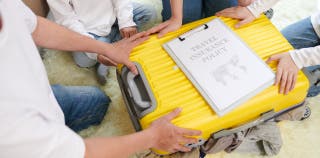
Best Travel Insurance Companies & Plans in 2024
Best Medical Evacuation Insurance Plans 2024

Best Travel Insurance for Seniors

Best Cruise Insurance Plans for 2024

Best COVID-19 Travel Insurance Plans for 2024

Best Cheap Travel Insurance Companies - Top Plans 2024

Best Cancel for Any Reason (CFAR) Travel Insurance

Best Annual Travel Insurance: Multi-Trip Coverage

Best Travel Medical Insurance - Top Plans & Providers 2024

- Is Travel Insurance Worth It?

Is Flight Insurance Worth It? | Airlines' Limited Coverage Explained
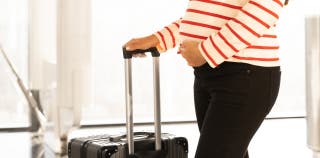
Guide to Traveling While Pregnant: Pregnancy Travel Insurance

10 Romantic Anniversary Getaway Ideas for 2023

Best Travel Insurance for Pre-Existing Medical Conditions July 2024

22 Places to Travel Without a Passport in 2024

Costa Rica Travel Insurance: Requirements, Tips & Safety Info

Best Spain Travel Insurance: Top Plans & Cost

Best Italy Travel Insurance: Plans, Cost, & Tips

Best Travel Insurance for your Vacation to Disney World

Guide to Chase Sapphire Travel Insurance Benefits 2024

2024 Complete Guide to American Express Travel Insurance
Schengen Travel Insurance: Coverage for your Schengen Visa Application

Mexico Travel Insurance: Top Plans in 2024

Best Places to Spend Christmas in Mexico this December

Travel Insurance to Canada: Plans for US Visitors
Travel Insurance for Germany: Top Plans 2024

Best UK Travel Insurance: Coverage Tips & Plans July 2024

Best Travel Insurance for Trips to the Bahamas

Europe Travel Insurance: Your Essential Coverage Guide

Best Trip Cancellation Insurance Plans for 2024
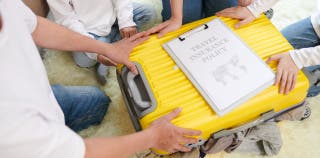
What Countries Require Travel Insurance for Entry?
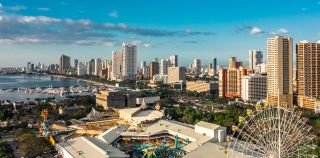
Philippines Travel Insurance: Coverage Requirements & Costs

Travel Insurance for the Dominican Republic: Requirements & Tips
Travel Insurance for Trips Cuba: Tips & Safety Info
AXA Travel Insurance Review July 2024

Best Travel Insurance for Thailand in 2024

Travel Insurance for a Trip to Ireland: Compare Plans & Prices

Travel Insurance for a Japan Vacation: Tips & Safety Info

Faye Travel Insurance Review July 2024

Travel Insurance for Brazil: Visitor Tips & Safety Info

Travel Insurance for Bali: US Visitor Requirements & Quotes

Travel Insurance for Turkey: U.S. Visitor Quotes & Requirements

Travel Insurance for India: U.S. Visitor Requirements & Quotes

Australia Travel Insurance: Trip Info & Quotes for U.S. Visitors

Generali Travel Insurance Review July 2024

Travelex Travel Insurance Review for 2024

Tin Leg Insurance Review for July 2024

Travel Insured International Review for 2024

Seven Corners Travel Insurance Review July 2024

HTH WorldWide Travel Insurance Review 2024: Is It Worth It?

Medjet Travel Insurance Review 2024: What You Need To Know

Antarctica Travel Insurance: Tips & Requirements for US Visitors

Travel Insurance for Kenya: Recommendations & Requirements

Travel Insurance for Botswana: Compare Your Coverage Options

Travel Insurance for Tanzania: Compare Your Coverage Options

Travel Insurance for an African Safari: Coverage Options & Costs
Nationwide Cruise Insurance Review 2024: Is It Worth It?
Travel Insurance for Hurricane Season: All You Need To Know
- Travel Insurance
- Travel Insurance for Seniors
- Cheap Travel Insurance
- Cancel for Any Reason Travel Insurance
- Travel Health Insurance
- How Much is Travel Insurance?
- Is Flight Insurance Worth It?
- Anniversary Trip Ideas
- Travel Insurance for Pre-Existing Conditions
- Places to Travel Without a Passport
- Christmas In Mexico
- Europe Travel Insurance
- Compulsory Insurance Destinations
- Philippines Travel Insurance
- Dominican Republic Travel Insurance
- Cuba Travel Insurance
- AXA Travel Insurance Review
- Travel Insurance for Thailand
- Ireland Travel Insurance
- Japan Travel Insurance
- Faye Travel Insurance Review
- Brazil Travel Insurance
- Travel Insurance Bali
- Travel Insurance Turkey
- India Travel Insurance
- Australia Travel Insurance
- Generali Travel Insurance Review
- Travelex Travel Insurance Review
- Tin Leg Travel Insurance Review
- Travel Insured International Travel Insurance Review
- Seven Corners Travel Insurance Review
- HTH WorldWide Travel Insurance Review
- Medjet Travel Insurance Review
- Antarctica Travel Insurance
- Kenya Travel Insurance
- Botswana Travel Insurance
- Tanzania Travel Insurance
- Safari Travel Insurance
- Nationwide Cruise Insurance Review
- Hurricane Travel Insurance
Policy Details
LA Times Compare is committed to helping you compare products and services in a safe and helpful manner. It’s our goal to help you make sound financial decisions and choose financial products with confidence. Although we don’t feature all of the products and services available on the market, we are confident in our ability to sound advice and guidance.
We work to ensure that the information and advice we offer on our website is objective, unbiased, verifiable, easy to understand for all audiences, and free of charge to our users.
We are able to offer this and our services thanks to partners that compensate us. This may affect which products we write about as well as where and how product offers appear on our website – such as the order in which they appear. This does not affect our ability to offer unbiased reviews and information about these products and all partner offers are clearly marked. Given our collaboration with top providers, it’s important to note that our partners are not involved in deciding the order in which brands and products appear. We leave this to our expert freelance writers who review and rate each product independently.
At LA Times Compare, our mission is to help our readers reach their financial goals by making smarter choices. As such, we follow stringent editorial guidelines to ensure we offer accurate, fact-checked and unbiased information that aligns with the needs of the Los Angeles Times audience. Learn how we are compensated by our partners.
Cookies on GOV.UK
We use some essential cookies to make this website work.
We’d like to set additional cookies to understand how you use GOV.UK, remember your settings and improve government services.
We also use cookies set by other sites to help us deliver content from their services.
You have accepted additional cookies. You can change your cookie settings at any time.
You have rejected additional cookies. You can change your cookie settings at any time.
Bring photo ID to vote Check what photo ID you'll need to vote in person in the General Election on 4 July.
- Passports, travel and living abroad
- Travel abroad
- Foreign travel advice
Before you travel check that:
- your destination can provide the healthcare you may need
- you have appropriate travel insurance for local treatment or unexpected medical evacuation
This is particularly important if you have a health condition or are pregnant.
Emergency medical number
Dial 112 and ask for an ambulance.
Contact your insurance or medical assistance company promptly if you’re referred to a medical facility for treatment.
For more information, read guidance on healthcare when travelling in Europe .
Vaccinations and health risks
At least 8 weeks before your trip check:
- the latest information on health risks and what vaccinations you need in TravelHealthPro’s France guide
- where to get vaccines and whether you have to pay on the NHS travel vaccinations page
There have been cases of the mosquito-borne disease, dengue fever, in France. You should take appropriate precautions to avoid being bitten by mosquitoes .
The legal status and regulation of some medicines prescribed or bought in the UK can be different in other countries.
TravelHealthPro explains best practice when travelling with medicines .
The NHS has information on whether you can take your medicine abroad .
Healthcare facilities in France
FCDO has a list of English-speaking doctors in France .
COVID-19 healthcare in France
The French government advises people with possible COVID-19 symptoms to take a COVID-19 test. You can buy PCR and self-administered rapid antigen tests from pharmacies. For more information on how to get COVID-19 tests, see the French government’s COVID-19 website .
If you test positive, the French authorities recommend you contact your doctor, follow basic hygiene rules, alert your direct contacts, work from home if possible and avoid contact with vulnerable people.
Health insurance cards
Apply for a free UK Global Health Insurance Card (GHIC) or European Health Insurance Card (EHIC) before leaving the UK. If you already have an EHIC, it will still be valid as long as it remains in date.
The GHIC or EHIC entitles you to state-provided medical treatment necessary during your trip. Any treatment provided is on the same terms as French nationals. If you do not have your EHIC with you or you’ve lost it, contact the NHS Overseas Healthcare Team .
It’s important to take out appropriate travel insurance for your needs. A GHIC or EHIC is not an alternative to travel insurance and you should have both before you travel. An EHIC or GHIC does not cover all health-related costs, for example, medical repatriation, ongoing medical treatment and non-urgent treatment. Read more about what your travel insurance should cover .
EHIC and GHIC cover state healthcare only, not private treatment. You will be responsible for the cost of any treatment provided by a private doctor or private clinic.
Travel and mental health
Read FCDO guidance on travel and mental health . There is also mental health guidance on TravelHealthPro .
Related content
Is this page useful.
- Yes this page is useful
- No this page is not useful
Help us improve GOV.UK
Don’t include personal or financial information like your National Insurance number or credit card details.
To help us improve GOV.UK, we’d like to know more about your visit today. Please fill in this survey (opens in a new tab) .
Javascript est desactivé dans votre navigateur.
République Française
Service-Public.fr
Le site officiel de l’administration française
- Se connecter
- Accéder au site pour les entreprises
This page has been automatically translated. Please refer to the page in French if needed.
Share the page
Link copied
Le lien vers cette page a été envoyé avec succès aux destinataires.
Health insurance of a foreigner on holiday (or short stay) in france.
Verified 11 May 2023 - Legal and Administrative Information Directorate (Prime Minister)
Austria, Belgium, Bulgaria, Croatia, Cyprus, Czech Republic, Denmark, Estonia, Finland, France, Germany, Greece, Hungary, Iceland, Ireland, Italy, Latvia, Liechtenstein, Lithuania, Luxembourg, Malta, Netherlands, Norway, Poland, Portugal, Romania, Slovakia, Slovenia, Spain, Sweden
A person who derives his or her right to sickness and maternity insurance by virtue of his or her relationship with an insured person
Citizen of the European Union, Iceland, Liechtenstein, Norway or Switzerland
United kingdom national, national of another country.
You wish to make a short stay in France as a insured national of the European Economic Area (EEA) or Switzerland? You must hold a European Health Insurance Card (EHIC). This allows you to benefit from the care of your care in France by accessing the French health system more easily. To obtain this card, and before leaving for France , you must apply to your health insurance organization.
How do I get the EHIC?
To benefit from the EHIC , you must:
- Be insured by a social security scheme of a member country the European Economic Area (EEA) or Switzerland,
- And stay temporarily in France.
It doesn't matter:
- Your status (worker, student, pensioner, entitled ...)
- And the reason for your stay (weekend, holidays, studies, language or professional stay...).
You must ask for your EHIC before you leave , with the competent health insurance body in your country of affiliation.
Every person in your family should have their own EHIC, including your children.
Please note
In some European countries, the EHIC is confused with the national health insurance card. Ask your health insurance organization in your country.
What does the EHIC allow?
Your EHIC allows you to:
- Receive unplanned and medically necessary care in France (care that cannot wait for your return to your country)
- Be reimbursed for your health expenses (medical, pharmaceutical, dental, hospitalization and laboratory tests).
You can address in France to a contracted doctor or a contracted or approved care facility. You have the same access conditions as the French insured.
Depending on the professional consulted (liberal doctor, mutual health center or public hospital for example), you may or may not have to advance the costs.
What to do if your EHIC is refused?
If the doctor or hospital in France refuses your EHIC, you can ask your health insurance organization to intervene.
If your approach does not solve the problem, you can ask Solvit for help.
Submit a complaint to Solvit
How do I get reimbursed for paying for care?
If you pay the trader, you will be able to get a refund once you return to your country, from your affiliation organization, on presentation of invoices and proof of payment. Your organization will tell you what to do.
You can also be reimbursed in France from the primary health insurance fund of the place of care on presentation of proof (medical prescription, care sheet...). Inquire at the local credit union.
Who shall I contact
- Primary health insurance fund (CPAM)
You can search according to your place of stay the healthcare professionals and their rates .
The different reimbursement rates for health expenses can also be consulted (part of the expenditure is generally borne by the insured person).
What should be done if the EHIC is forgotten?
If you have forgotten your EHIC, you can be treated in France but you must make advance of all your medical expenses, including your hospital care.
Once back in your country, you will be able to get a refund from your health insurance agency. Keep your invoices and receipts. They'll be asked of you.
Are you a national of the United Kingdom and would like to come to France? You must have the comprehensive health insurance card issued by the United Kingdom. This card replaces the EHIC. Only persons whose EHIC has expired need to apply for this comprehensive health insurance card from their health insurance fund in the UK.
How do I get my Global Health Insurance Card (GHIC)?
You must apply for the GHIC from your UK sickness insurance fund.
That request has to be made before coming to France .
Since 11 January 2021, the GHIC has replaced the EHIC issued by the United Kingdom. The EHIC remains valid in France until the card expires. Only persons whose EHIC has expired need to apply for the comprehensive health insurance card.
What is the purpose of the Global Health Insurance Card (GHIC)?
Benefits in kind shall cover:
- Medical expenses
- Pharmaceutical costs
- Costs of dental care and dentures
- Hospitalization costs
- Costs of laboratory tests and tests
- Medical transportation costs.
What to do in case of loss, theft or forgetting your card?
Your health insurance fund can issue you a “replacement certificate” ( Provisional Replacement Certificate or PRC ).
This certificate, issued for a limited period of validity, can then be used under the same conditions as the GHIC.
How do I get reimbursed for health care?
The signed, dated care sheet, along with the prescription and a copy of your GHIC or CRP card, must be given to the CPAM of the place where you received your care.
You will need to specify your permanent address and bank details (bank name, address, SWIFT code, account number with IBAN or BIC).
As a general rule, the health insurance fund does not reimburse all expenses.
Are you a national of another country and would like to stay in France? The rules are not the same depending on your country of origin.
If you are a citizen of a country that does not belong to the European Economic Area and if you are not a UK national, you should get in touch with your UK health insurance before coming to France. This way, you will know if and under what conditions they are taking care of the patients abroad.
You may be advised to take out private insurance.
Who can help me?
Find who can answer your questions in your region
Center for European and International Social Security Liaison (Cleiss)
General information on social security abroad and assistance in the application of individuals
By telephone
+33 (0) 1 45 26 33 41
- mondays and wednesdays: 9am to 12.30pm
- tuesday and thursday: 1:30 p.m. to 4:15 p.m.
- Wednesday from 9 am to 12:30 pm.
Access to contact form
Online services and forms
Online service
Additional topics
European Health Insurance Card
European Commission
What is refunded
National Health Insurance Fund (Cnam)
Health Directory - Ameli Site
- Skip to primary navigation
- Skip to main content
- Skip to primary sidebar
- Skip to footer

- Best Global Medical Insurance Companies
- Student Insurance
- Overseas Health Insurance
- Insurance for American Expats Abroad
- Canadian Expats – Insurance and Overseas Health
- Health Insurance for UK Citizens Living Abroad
- Expat Insurance for Japanese Abroad
- Expat Insurance for Germans Living Abroad
- Travel Medical Insurance Plans
- Trip Cancellation Insurance
- Annual Travel Insurance
- Visitors Insurance
- Top 10 Travel Insurance Companies
- Best Travel Insurance for Seniors
- Evacuation Insurance Plans
- International Life Insurance for US Citizens Living Abroad
- The Importance of a Life Insurance Review for Expats
- Corporate and Employee Groups
- Group Global Medical Insurance
- Group Travel Insurance
- Group Life Insurance
- Foreign General Liability for Organizations
- Missionary Groups
- School & Student Groups
- Volunteer Programs and Non-Profits
- Bupa Global Health Insurance
- Cigna Close Care
- Cigna Global Health Insurance
- Cigna Healthguard
- Xplorer Health Insurance Plan
- Navigator Health Insurance Plan
- Voyager Travel Medical Plan
- Trekker Annual Multi-Trip Travel Insurance
- Global Medical Insurance Plan
- Patriot Travel Insurance
- Global Prima Medical Insurance
- Student Health Advantage
- Patriot Exchange – Insurance for Students
- SimpleCare Health Plan
- WorldCare Health Plan
- Seven Corners Travel Insurance
- Trawick Safe Travels USA
- SafeTreker Travel Insurance Plan
- Unisure International Insurance
- William Russell Life Insurance
- William Russell Health Insurance
Atlas Travel Insurance
- StudentSecure Insurance
- Compare Global Health Insurance Plans
- Compare Travel Insurance Plans
- Health Insurance in the USA
- Health Insurance in Mexico
- Health Insurance in Canada
- Health Insurance in Argentina
- Health Insurance in Colombia for Foreigners
- Health Insurance in Chile
- UK Health Insurance Plans for Foreigners
- Health Insurance in Germany
- French Health Insurance
- Italian Health Insurance
- Health Insurance in Sweden for Foreigners
- Portuguese Health Insurance
- Health Insurance in Spain for Foreigners
- Health Insurance in China
- Health Insurance in Japan
- Health Insurance in Dubai
- Health Insurance in India
- Thailand Health Insurance
- Malaysian Health Insurance for Foreigners
- Health Insurance in Singapore for Foreigners
- Australian Health Insurance for Foreigners
- Health Insurance in New Zealand
- South Africa Health Insurance for Foreigners
- USA Travel Insurance
- Australia Travel Insurance
- Mexico Travel Insurance
- News, Global Health Advice, and Travel Tips
- Insurance Articles
- Travel Advice and Tips
- Best Hospitals in the United States
- Best International Hospitals in the UK
- Best Hospitals in Mexico
Or call for a quote: 877-758-4881 +44 (20) 35450909
International Citizens Insurance
Medical, Life and Travel Plans!
U.S. 877-758-4881 - Intl. +44 (20) 35450909
France Travel Insurance Advice
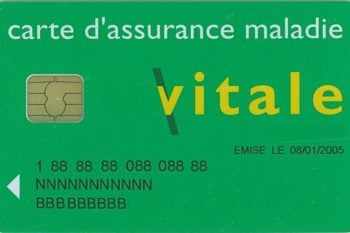
Safety Advice Travel Insurance for Visitors to France
France is a leading travel destination for world travelers. It is the 4th most popular destination in the world for American students studying abroad (IIE). And the capital city, Paris, is the third most visited spot in the world. With cosmopolitan cities, medieval villages, and legendary wine regions, France is one of the most popular expat destinations in the world. On the other hand, according to the Global Peace Index , France is ranked 51 out of 163 countries and has the lowest rating of all countries in Europe. So before you run away to a lavender field in Provence, take a moment to review important safety tips and travel insurance advice for visitors to France .
French System and Travel Insurance Options
France has excellent public services. It is first in the world in the World Health Organization’s ranking of healthcare efficiency. The country operates on a system of universal cover funded by taxation on salaries. Services are not limited to French citizens. As of 2016, anyone who has resided in France as an expat in a “stable and regular manner” for three months and intends to legally remain in France on a permanent basis is eligible to apply for public coverage. As a result, there is now a new application process for expats.
Read: Healthcare System in France
Travel Insurance for Visitors to France
As stated above, France has excellent medical facilities but is also one of the riskier places to visit in Europe due to the above-average crime and risk of terrorism. A good travel insurance plan for visitors to France will include coverage for trip cancellation, terror, and lost or stolen items. For recommended providers, please look at our list of the best travel insurance companies .
The Atlas Travel Insurance plan is an excellent option for most applicants, providing affordable coverage and a wide range of benefits.

- Emergency medical, evacuation, repatriation benefits
- Choose between the basic and more extensive coverage
- Meets Schengen visa insurance requirements
- 24/7 worldwide travel and emergency medical assistance
Travel Insurance for US Citizens Traveling to France
We recommend the Trawick Safe Travels trip cancellation plan to US citizens traveling abroad. An alternative option would be the GeoBlue Voyager plan which offers comprehensive travel medical benefits but does not include trip cancellation benefits.
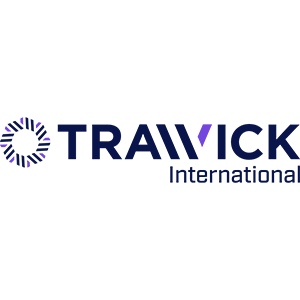
Safe Travels Voyager
- Comprehensive coverage for trip cancellation, trip interruption, emergency medical and post-departure travel coverage
- Cancel for Any Reason available
- Up to $250,000 in emergency medical coverage

GeoBlue Voyager Plan
- For U.S. citizens up to age 95
- Includes pregnancy coverage, baggage loss, trip interruption & more
- 24/7/365 service and assistance
Vaccines Required of Visitors to France
There are no mandatory vaccinations for travel to France. All travelers should travel with updated routine vaccinations , including measles-mumps-rubella (MMR) vaccine, diphtheria-tetanus-pertussis vaccine, varicella (chickenpox) vaccine, polio vaccine, and a yearly flu shot.
Rabies is present in France. Adventure travelers who plan on exploring French caves should speak with their doctor about a preventative vaccine.
Food and water safety standards in France are similarly high as in other developed nations. Tap water is safe to drink. Pregnant women should speak with a physician to see if there are any restrictions for consuming French unpasteurized cheese.
Emergency Travel Assistance
Hotel Dieu : Adjacent to the Notre Dame Basilica in central Paris, this easy-to-find hospital is well-regarded and has experience treating tourists.
The American Hospital , on the outskirts of Western Paris, is a private bilingual facility. It is more expensive than other providers in Paris, but their familiarity with American health insurance procedures may make you feel more comfortable.
Hôpital Necker – Enfants Malades , Paris’ leading pediatric hospital, is a teaching facility affiliated with the University of Paris. It is the oldest pediatric hospital in the world.
The University Hospital of Bordeaux receives top marks as the best French hospital. Rounding out the top 5 are CHU Lille, CHU Toulouse, Strasbourg University Hospital, and the Pitié-Salpêtrière in Paris.
Furthermore, the service SOS Médecins provides house visits with a doctor for 50-70 Euros, 24 hours a day. This means you don’t have to leave your house when you’re feeling unwell. It is perfect for non-life-threatening emergencies.
Finally, in French pharmacies, staff can treat minor medical concerns. They can also provide extra help, such as requesting an ambulance. The staff can also recommend a number of assistance programs, including:
- Protection Civile Paris (List of French emergency services, in French)
- SOS Help (English-speaking listening & counseling line)
Insurance Coverage for Internationals Living in France
France does provide coverage to its citizens and to foreigners after a certain period of residency. Many citizens and foreigners choose to supplement their local coverage with a global insurance plan.
Read: French Health Insurance for Expats in France
Extra Travel Insurance Considerations
France currently operates on a reimbursement program. Therefore, you pay for the cost of your treatment and then apply for reimbursement. A regular doctor’s visit is just 23 Euros and typically 70% of that cost will be returned to you. This system is being phased out. As a result, by the end of 2017, most doctors will bill the government or insurer directly.
If you need global coverage, your application is rejected, or if your time in France will amount to less than 50% of the year, you will require privately held international health insurance to cover your needs.
Embrace The French Lifestyle
People in France rank 10th among all nations for life expectancy. Thus, for ex-pats looking for a permanent relocation, you couldn’t ask for a healthier spot to enjoy the finer things in life. Make the most of your new home-away-from-home and embrace the French joie de vivre!
- American Travel Insurance for visits to the USA
- Canada Travel Insurance for Visitors to Canada
- China Travel Insurance Plans
Get a fast, free, international insurance quote.
Global medical plans, specialty coverage, company info, customer service.
Are you are preparing for your holidays in France, or coming to watch the Paris 2024 Olympic Games? What health insurance cover do you need?
If you need healthcare, it may not be covered unless an international agreement or your health insurance specifies this. If you do not make arrangements before coming to France, you may have to pay substantial costs if you have health problems during your stay.
If you are insured in a State of the European Union, Iceland, Liechtenstein, Norway or Switzerland
Apply for your CEAM ( find out more ).
If you are insured in the United Kingdom
Apply for your GHIC ( find out more ).
If you are insured in another Country
Before arriving in France, check with your social security body whether it covers healthcare in France, and under what conditions; or whether you have to buy a travel insurance policy covering any medical costs you may incur on French territory. Such insurance policy is mandatory to obtain a tourist visa.
Most agreements signed by France do not stipulate provisions allowing coverage of healthcare during a temporary stay.
However, subject to certain very strict conditions, coverage is possible if you are insured in one of the following Countries or territories:
- Bosnia-Herzegovina
- North Macedonia
- New Caledonia
- French Polynesia
- Saint Pierre and Miquelon
Centre des Liaisons Européennes et Internationales de Sécurité Sociale 11 rue de la tour des Dames - 75436 Paris cedex 09 Tél. : +33(0)1 45 26 33 41
Qui sommes-nous ? Contact Informations légales Accessibilité Donnez votre avis sur ce site Twitter Abonnements
Healthcare System in France: everything you need to know
how does the healthcare system work in france.
France has a high quality healthcare system which offers universal coverage for all citizens, regardless of their income level or age . Regional health agencies are responsible for the planning and delivery of medical services following the strategy and budgets set by the national government.
It is mandatory in France to enroll in the health insurance system, which covers prescription drugs, long-term care costs hospital fees. The insurance system is financed through taxes paid by employers and employees, a national income tax, and taxes on certain industries and products. The social security system, to which these taxes are paid, covers 70% of the cost of treatment. If you have a long-term medical condition, it may cover 100%.
The remaining 30%, which corresponds to co-payment, co-insurance, and doctor's charges that exceed the covered rates, comes out of the patient's pocket . Because of this, 95% of citizens have supplemental insurance to cover additional charges, as well as dental, auditory and vision care.
How do I access the healthcare system as a foreigner?
If you are moving to France for an extended period of time , after three months of residence you can register to the local healthcare system through the Protection Universelle Maladie (PUMA), a system created in 2016 exclusively for foreigners.
Tourists coming from countries members of the European Union, European Economic Area and Switzerland have access to the public healthcare system simply by shwoing their European Health Insurance Card (EHIC).
If you are traveling from another country for vacation, the best option is to have a travel insurance plan.
At InternationalHealth.com you can compare, quote and hire the best insurance plans for your next trip to France. Simply fill out your information and find the best option based on your profile.

What do I do if I have an emergency in France?
The general emergency hotline is 112 . However, there are also specific lines for police, fire or ambulance services. The important numbers to have at hand are:
Police: 17. Ambulance (SAMU): 15. Fire Department: 18.
In these situations, especially if you require medical attention and ambulance service, it is important to have medical insurance , either travel insurance or international health insurance, because if you do not have it you will have to pay the full amount for the service.
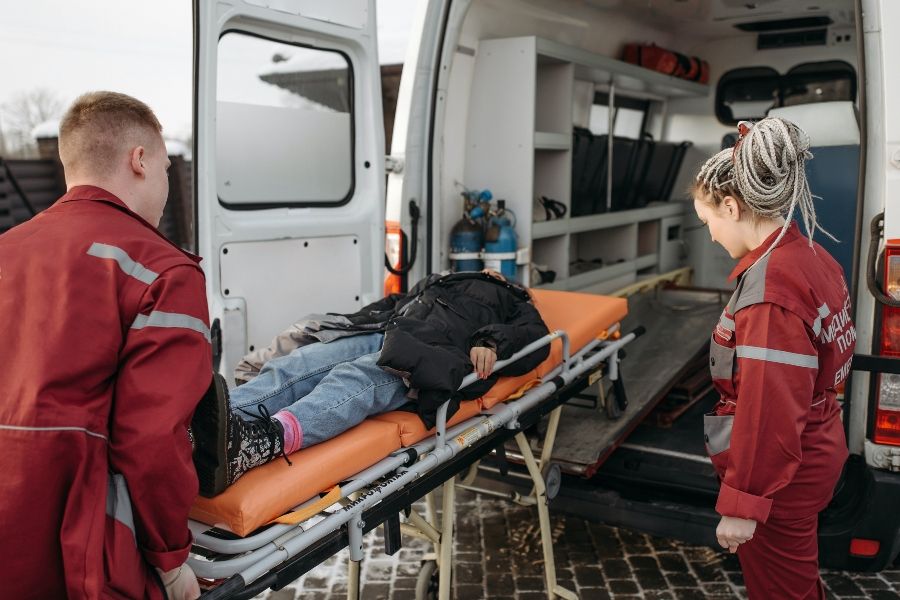
Can I enter France with medication?
If you are under medical treatment that requires permanent medication, you can bring them into the country, but you must carry the prescription issued in your country of origin. The maximum supply you can bring in is three months , and cannot exceed the amount required for the treatment.
How do pharmacies operate in France?
France is one of the countries with the most pharmacies, about 23,000 nationwide. Therefore, you will have no problem finding one, and you can identify them by the characteristic green cross at the entrance.
In local pharmacies you will find a wide variety of hygiene and beauty products . They also have a pharmacist (usually the owner of the pharmacy) who can recommend medications and also validate your prescription . Many people in France consult a pharmacist rather than their family doctor for basic health problems. They may, therefore, be the place to go if you have a cold or a common health issue.
Pharmacies have exclusivity to sell over-the-counter medications, you will not find them in supermarkets or other stores . There are no chain pharmacies either, since the owner of the pharmacy must be a pharmacist and cannot own more than one.
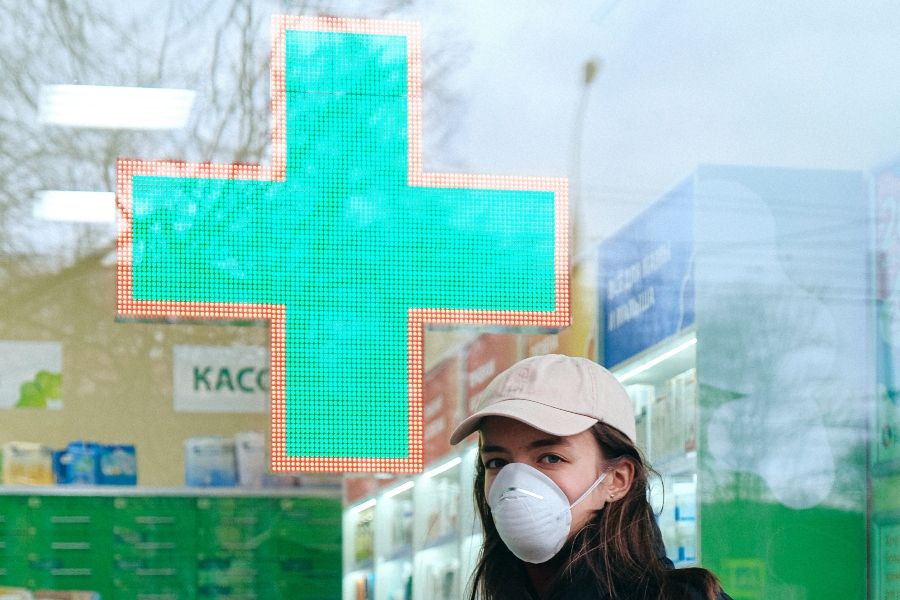
Entry Requirements
Foreigners traveling to France are not required to show proof of vaccination against Covid-19. There are no restrictions imposed by Covid-19.
However, they must have medical insurance and the corresponding visa in case they need it.
Compare Healthcare System in France: everything you need to know and choose the best
Update date: 28 de mayo de 2024, products available: 55.
Content Creator at QPTech. Generating dynamic and entertaining content to help you become familiar with different healthcare systems around the world.
Subscribe to our newsletter
Do you want to take out medical insurance quickly and safely, do you want to see travel insurances .

7 Best France Travel Insurance Plans for US Citizens in 2024
Updated on January 10, 2024 by Matthew H. Nash – Licensed Insurance Agent
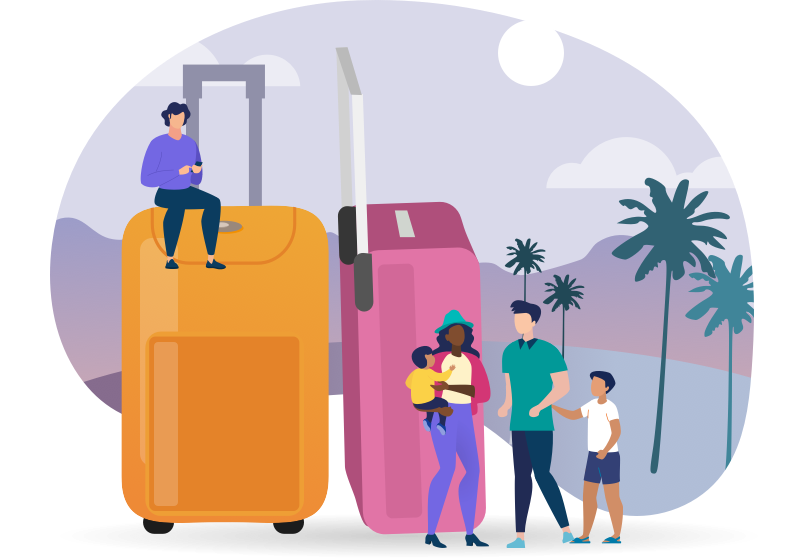
- SwiftScore Our SwiftScore is a unique and proprietary insurance ranking system objectively comparing key metrics which are most important to France travelers. Learn more at the end of this page.
STARTING PRICE FOR 2-WEEK TRIP TO THE FRANCE
CAN YOU CANCEL YOUR TRIP FOR ANY REASON?
BEST WEBSITE FOR
Comparing Policies
- Compare dozens of the best France travel insurance policies from all the major providers in one place
- Easily filter for the features you want and get support from their award-winning customer service team
- Founded in 2013, TravelInsurance.com has helped hundreds of thousands of travelers find affordable insurance coverage

Fast Claims

- SwiftScore Our SwiftScore is a unique and proprietary insurance ranking system objectively comparing key metrics which are most important to travelers. Learn more at the end of this page.
BEST POLICY FOR
Travelers Aged 55+
- Pre-existing medical conditions are covered for a reasonable fee and they offer “cancel for any reason” as an add-on
- $2,000 COVID quarantine coverage available w/ Safe Travels Voyager plan
- Founded in 1998 and underwritten by Nationwide and GBG Insurance

BEST WEBSITE FOR
Filtering Plans
- This comparison website has the most comprehensive filters especially for Covid-19 which helps you search for the specific benefits you need
- They have “Zero Complaint Guarantee” which promises a fair claims process
- Established in 2003, Squaremouth has consistently been recognized for it’s exceptional customer service

BEST POLICY FROM
An Established Brand
- Well rounded, inexpensive travel insurance plans from an established and top rated global insurance company
- AXA has plans that cover pre-existing conditions and their “Platinum” plan covers “cancel for any reason” with an optional add-on. They also offer helpful 24/7 Worldwide Travel Assistance Services
- Founded in 1959 and underwritten by Nationwide

Family Travel
- Their “Trip Interruption for any Reason” feature allows you to get a 75% reimbursement for any additional expenses if you decide to go home early from your trip
- They have a variety of insurance products to suit any travel needs
- Founded in 1993 and underwritten by Nationwide Insurance

$521 Per Year
Long-term Travel
- Ideal for digital nomads and long-term travel, available to anyone anywhere
- Scored lower because short-term travel coverage isn’t as robust as competitors
- Founded in 2018 and is underwritten by Lloyds of London

CAN YOU CANCEL YOUR TRIP FOR ANY REASON?
- Compare dozens of travel insurance policies from all the major providers in one place
France travel insurance FAQs
Should i get travel insurance for france.
France travel insurance can protect you against the financial consequences of trip delays or cancellations, medical emergencies and evacuations, and lost, stolen or damaged luggage. Trip insurance can support you in a medical emergency by coordinating medical evacuations to hospitals that deliver US-quality medical treatment. Throughout my travels, I have found that getting the best policy provides peace of mind that we may not have otherwise. Purchasing France trip insurance is worth it and very affordable since most plans are priced at only 2-3% of the total trip cost.
Will travel insurance cover my medical bills if I am hospitalized in France?
Most traditional health insurance policies do not cover any medical services you may require when traveling outside the US. Also, be aware that Medicare never reimburses for international medical care. Therefore, the only way to ensure that you’ll have the medical coverage you need is to buy the best trip insurance policy as soon as you book your French vacation.
How many people can I insure on one travel plan?
To insure more than one traveler on a single insurance plan, all travelers must have identical travel itineraries and live in the same state. You can cover up to 10 people, including yourself, on single trip plans. However, purchasing a group plan may be more economical if there are 8 or more of you. With a group policy, insured travelers can reside in any state and have different travel itineraries without sacrificing the same great coverage a single trip policy would provide.
How long does it take to process a travel insurance claim?
After submitting a claim with all of the requested documentation, your insurer may process it for 6 to 8 weeks. Of course, this varies from one provider to another.
Do I have any recourse if my claim is rejected?
Travel insurance providers reject claims for several potential reasons, such as the policy does not cover the reason for the claim or an insured traveler did not adhere to the required procedures, list an accurate total trip cost, or disclose a pre-existing medical condition upon application for coverage. If an insurer rejects your claim, they will provide the necessary reasons for doing so and notify you of possible recourse.
What is Trip Interruption?
Trip Interruption benefits cover any unpredictable or unforeseen events that lead to your trip being interrupted and requiring you to return home prematurely. Coverage typically applies to extraordinary events like terrorist attacks, inclement weather, job termination and the injury, illness or death of a traveler insured by your policy.
Will my travel insurance policy cover a relative’s death?
Every policy is different concerning this issue, so it’s essential to read the full details of your plan. For example, under some policies, bereavement benefits might not be available to you if a relative dies by suicide or from a pre-existing health condition. That said, travel insurance plans with higher premiums will often reimburse you, irrespective of your relative’s cause of death. Also, it’s vital to determine who your insurer defines “covered relatives’ to be. Does it include siblings? Grandparents? In-laws? Cousins? Pets? Remember, every travel insurance provider is different, so it’s best to clarify this before you purchase a policy.
How is Baggage Loss defined? How do Baggage Loss benefits work?
Insurance providers will reimburse you for luggage or personal effects lost, damaged, destroyed or stolen during your trip to France, including the times a hotel, travel supplier or common carrier is in possession of them. In such situations, you can expect your insurer to reimburse you to the Maximum Benefit listed in your policy less whatever amount the responsible party reimburses you. So, what is a Maximum Benefit Amount? It is the highest value your insurer will reimburse you should anything mentioned above happen to your belongings with which you are traveling. Remember that the amount specified in your policy is listed per person. This amount can be affected by a couple of other benefit limits. The first is a Per Article Benefit, which is the highest dollar amount your provider will reimburse you per item in such situations. The other benefit limit that helps define the reimbursement parameters under your policy is the Combined Article Limit, which is specific to things like watches, jewelry, furs and electronics (such as cameras, smartphones, laptops, video cameras, etc.). Should anything happen to one or more of your items that fall under the Combined Article Limit, your provider will most reimburse you the dollar amount listed in this part of your plan. This holds true even if their total value is higher. It’s worth mentioning that depending upon the state you live in, your policy may not have a Combined Article Limit. Let’s run through a hypothetical scenario to understand how these amounts and limits determine the reimbursement you expect. Imagine your policy has a Maximum Benefit of $2,000, a Per Article Benefit of $500 and a Combined Article Limit of $500. With this policy, say you lost a designer coat valued at $600. Your insurer would reimburse you only $500, even if you haven’t used your Maximum Benefit because the Per Article Benefit applies first. Now, let’s say you lose a watch and your smartphone. Both of these items fall under the Combine Article Limit, so even though their total value may be $800, you will receive $500 total. This is because the individual and combined item limits are first accounted for and then applied against your Maximum Benefit Amount. Therefore, the highest reimbursement amount you can receive is $2,000 total. Remember that your claim process will go a lot smoother if you have documentation proving ownership, condition and loss. Valid documentation includes photographs of the items, receipts of purchase, letters from the responsible carrier/party re: loss or damage of items and police reports. Also, check your insurance plan’s full details for further specifications.
Most common problems while traveling in France and how to avoid them:
Unlike more exotic destinations, there is less in the way of illnesses you need to concern yourself with while in France. Besides the flu, cold or Covid, food poisoning seems a common affliction tourists experience. Of course, this isn’t specific to France. It happens everywhere, but in France, you have the excellent assistance of helpful pharmacists. Look for a building with a green lit-up cross to find your nearest la pharmacie. When it is your turn, explain to the pharmacist your issue and any concerns you may have. They will then recommend a remedy and explain the proper dosage and frequency in which you take it. Many French pharmacies even have natural remedies, but you must consult a pharmacist first. That said, trust your instincts. If you think you need medical care, seek it immediately. If you plan to visit the French countryside, it is essential to know that ticks abound, and bites resulting in Lyme Disease are increasing yearly. To avoid being bitten by ticks, it’s best to wear long, light-colored clothing and tuck your pant legs into your socks. This will make it easy to spot ticks should they decide to crawl or jump on you. If you have long hair, tie it up as high as possible so that they don’t hide in your hair and come out to bite you later. Another crucial step is to use a strong insect repellent with DEET. If you get bitten by a tick, use tweezers to remove it and visit a doctor immediately, especially if red rings appear around the bite location. The sooner you seek medical help, the better. The great news is that whatever illness you may come down with, France has one of the world’s leading medical systems, so you can trust that you will receive excellent care.
The most typical injuries tourists experience in France are due to simple things like tripping and falling. Adventure activities and sports can lead to open wounds, sprained ankles or wrists, and broken bones. To prevent yourself from becoming one of the many automobile-related casualties, study up on French road rules before renting a car. Regardless of what may happen, you can rest easy knowing that the French medical system is one of the best in the world.
Muggings and pickpocketing are pretty common in France, especially in the cities. So your first line of protection is not to stand out as a tourist since they are the primary targets of such crimes. Blending in will go a long way in helping you. To do so, consider dressing like the French: wearing classic clothes of neutral colors (or black) and free of patterns. Avoid bright clothes, fanny packs, backpacks, cheap flip-flops, and running shoes. And whatever you do, don’t speak loudly or make it obvious that you speak English. As with anywhere, trust your instincts and use common sense. Don’t walk alone in desolate and unlit areas at night or in the empty metro, bus or train stations. You can also minimize your risk of mugging by using only ATMs inside banks. Steer clear of neighborhoods not recommended by your hotel concierge and travel guide or that seem “sketchy.” And never carry large amounts of cash or valuables with you. Remember, if something in your surrounding environment doesn’t feel right, it probably isn’t, so remove yourself immediately and seek help if necessary.
Emergency resources for France
Phone numbers.
In an emergency, dial 112 to reach the police, ambulance or fire services. 112 is known as the European Emergency Assistance Number (EEAN) and will always connect you with emergency services specific to your location.
US embassy or consulate details
The US has an embassy in Paris, along with consulates in Lyon, Bordeaux, and Rennes, and consulate generals in Marseille and Strasbourg. You can find addresses, phone numbers, and details of citizen services on the website . For those who like to take extra precautions, you can register your travel plans with the consulate or embassy closest to your destination in France by applying for the Department of State’s Smart Traveler Enrollment Program . After listing your trip itinerary, you will receive health and security advisories that may affect your vacation. It also allows the US Embassy or Consulate to liaise with you or your family in the event of an emergency.
Additional information to help travelers have a better experience in France:
Communication.
For many travelers, staying connected is extremely important, even when on vacation. WiFi is available in most places but not necessarily free. The good news for US travelers is that McDonald’s locations throughout France have free WiFi. (The French call it McDo, pronounced with a long ‘o’ as in dough.) Plenty of public spaces in Paris offer free WiFi too. WiFi in hotels varies. Some will offer it free in their lobbies or lounges, but not in guest rooms. That said, in-room WiFi may be available for an hourly or daily rate. If this is important to you, I recommend contacting any hotel you consider booking to clarify this beforehand. Nevertheless, messaging and calling apps that you can use via WiFi are probably the cheapest options for communicating with loved ones back home. If you need to be easily reached anytime or night, you can inquire about getting an international roaming plan for France with your wireless carrier in the States. Or, if you have an unlocked GSM phone, you can purchase a French SIM card instead. Local carriers like Le French Mobile, Orange, Lycamobile, etc. offer pay-as-you-go options.
France, like many EU countries, uses the euro (€). Despite the fees, using your US debit card to withdraw cash from French ATMs will get you the best exchange rate. Before leaving home, alert the bank of your travel destination and dates, so they do not block your card. While credit and debit cards are widely accepted in France, card processing machines require that you use both your chip and PIN. So be sure to learn yours before you leave home. ATMs are ubiquitous throughout French cities but a bit scarcer in more rural areas. Yet, you will most likely need cash in these areas, especially for small shops, cafés and farmer’s markets. Therefore, always have cash on hand throughout your trip, as it will also come in handy for tipping, taking public transportation and paying for taxis.
Getting Around
How you choose to get around France will depend on your travel style and budget. For those heading off for a city break in Paris or other urban centers, it’s worth mentioning that they are usually quite walkable and offer affordable public transportation. However, be aware that taxis are pricey and not always an efficient alternative.
Visitors looking to explore beyond the city limits of Paris inevitably rent a car as it gives them the freedom to visit charming, small villages along the way. Should this be your preference, you will be greatly relieved that the French drive on the right side of the road as they do in the US. Renting a car is relatively straightforward in France, but remember that you will need a valid US driver’s license and your international driver’s permit, which you can get the same day from your nearest AAA office
That said, I recommend reading up on the current driving rules before leaving the US, as they can differ significantly from those in the US. It is also worth consulting ViaMichelin to plan your routes and determine how much you’ll pay in toll fees. To find rest stops and service stations or to view traffic alerts, check out Bison Futé or Sociétés d’Autoroutes . Click the British flag in the top right corner of each site to have it translated into English.
Another way to travel around France is to use both rental cars and trains. This allows you to rent a car as you need it, instead of the entirety of your stay in France. France is well-linked by rail, with trains connecting Paris with most other major domestic cities. Book your tickets via SNCF . Depending upon the time of day and year, trains may be far more efficient, even more so than planes. Most major train stations in France have rental car agencies, so you can pick up a car right after disembarking from a train.
Air France offers the most domestic flights of any air carrier for those who prefer to fly between French cities. Other airlines that may feature lower ticket prices include Air Corsica , Chalair Aviation , Twin Jet , and easyJet .
Lastly, if you love cycling, consider joining a cycling tour of your favorite region of France. It will give you the chance to experience the countryside, exquisite cuisine and the French way of life.
Having some useful words and phrases under your belt will go a long way during your time in France. Here are the essentials to help you get by:
- bonjour – good morning or good day
- bonsoir – good evening
- bonne nuit – good night
- au revoir – goodbye
- s’il vous plait – please (also appears on signs as SVP)
- merci – thank you
- merci beaucoup – thank you very much
- bienvenue – welcome!
- Comment ça va? – How are you?
- Ça va bien – I’m good/well
- Ça va mal – I’m not doing well
- À bientôt – See you soon
- garçon – waiter/server (male)
- L’addition, s’il vous plaît – The check/bill, please
- ticket – un billet
- subway – le métro
- train station – gare
- aéroport – airport
- Où est…? – Where is…?
- pardon – excuse me (if you bump into someone or need to get by)
- excusez moi – excuse me (to call on someone when you need their help)
I recommend using an online tutorial to practice your pronunciation, as French is rarely phonetic.
Local Customs
The cultural differences between France and the US are vast, so don’t expect everyone and everything to operate as they do in the States. The French take their time in many areas of life, so don’t be in a rush. Do not always expect to be right as the customer. This is not a perspective the French share. One of the most common social missteps foreigners make in France is to enter a shop, café, restaurant or bakery without greeting the shopkeeper. This is immensely rude in French culture. A friendly “Bonjour, Madame!” or “Bonsoir, Monsieur!” will go a long way. You can expect curt responses and minimal service without a proper greeting. Dress well. French people take pride in their appearance, even when they wear casual clothes. For the most part, you will not see French people in velour pants, sweatpants, gym clothes, t-shirts, extra-short shorts or flip-flops. Aside from McDonald’s (McDo, as it’s called in France) or other fast food establishments, you may be ignored or turned away for attempting to dine in a restaurant wearing any of the attire mentioned above. If you want to blend in a bit more, opt for black, gray or more neutral, solid-colored clothing. Most other faux pas tourists commit are around the table. The French take food and eating seriously, so much so that you’ll rarely find them eating on the go. Instead, the French expect you to make time for your meals and to eat at a table. Proper etiquette when at a table is essential. Upon being seated, immediately place your napkin on your lap. Unlike in the US, French people eat with their wrists or forearms resting against the table and use both fork and knife throughout the meal. Always keep your elbows off the table. In French restaurants, do not ask to split a meal, substitute ingredients or alter your meal, have extra ice added to your drink, have free refills on sodas or coffee, or take your leftovers to go. Also, do not expect your servers to lavish you with attention. They are not working for tips and will do their job as they see fit. Ask for your check when ready to leave since French servers will not rush you out. If a French person invites you to their home, remember that bread is not cut in France. It is broken and eaten with your meal, never as an appetizer. They only use butter in baking and cooking, so don’t request butter for your bread. The exception is breakfast, when they may butter their toast or a pastry. The French hold their soup spoon sideways and spoon the soup towards them, sipping from the side of the spoon. Salads tend to be eaten with only a fork, folding the lettuce or greens as opposed to cutting them. When visiting a French home, always bring a small gift such as chocolate or flowers. Avoid wine, if possible, as most French people purchase wines that pair well with the meal they are preparing. Coming from the US, there are some other social norms you may not be used to, such as not getting a tour of your host’s home or apartment, not seating yourself at the table (usually planned seating arrangements) and not eating until your host says “Bon appetit!”. Lastly, never discuss politics, religion or other controversial issues at the table.
Tipping in France is standard, but you’ll usually see it added to your bill as a 15% service charge (service compris). Always double-check, though. Despite the inclusion of a service charge on the bill, most people in France leave a little extra for their server. For example, if you sat down for coffee, rounding the total up to the next euro or leaving at least 50 cents is acceptable. In other circumstances, consider leaving a few extra euros, depending upon the quality of the service and the size of your bill. At your hotel, expect to leave your housekeeper €1-€2 per night. Bellhops/porters usually get €2-€3 for each bag they deliver to your room. And for your concierge, consider tipping them anywhere from €5-€20 if they help you make reservations or book you onto a tour or other activities. Other people whom you can expect to tip during your trip to France are taxi drivers (10%), tour guides (€2-€5/day/person in your group), tour drivers (€2/day/person), ushers and museum docents (€2) and spa and salon technicians (10-20%). Like in the US, the amount you tip should reflect the level and quality of the service you received.
What to pack for France
Apart from Travel Insurance, we recommend you bring the following items for maximum health, safety and enjoyment of your trip to France.
A final note about travel insurance for France
I have spent dozens of hours researching travel insurance, including getting quotes and comparing coverage from all the most popular brands. Regardless of where you’re going I am confident that you will also find that WithFaye.com offers the best way to compare policies with the ideal combo of coverage and price.
I wish you and yours an incredible journey.
SwiftScore Ranking Methodology
- Average price for a 2-week vacation based on a 35-year-old California resident traveling to the France with a $3,500 trip cost
- Coronavirus coverage
- Cancel for any reason (CFAR)
- AM Best rating of the underwriter
- Key policy details including cancellation, interruption, emergency medical evacuation, and baggage & personal effects
- Ease of sign up
- Policy language clarity
- User reviews
- Best Extended Auto Warranty
- Best Used Car Warranty
- Best Car Warranty Companies
- CarShield Reviews
- Best Auto Loan Rates
- Average Auto Loan Interest Rates
- Best Auto Refinance Rates
- Bad Credit Auto Loans
- Best Auto Shipping Companies
- How To Ship a Car
- Car Shipping Cost Calculator
- Montway Auto Transport Review
- Best Car Buying Apps
- Best Sites To Sell a Car
- CarMax Review
- Carvana Review (July 2024)
- Best LLC Service
- Best Registered Agent Service
- Best Trademark Service
- Best Online Legal Services
- Best Accounting Software
- Best Receipt Scanner Apps
- Best Free Accounting Software
- Best Online Bookkeeping Services
- Best Mileage Tracker Apps
- Best Business Expense Tracker Apps
- Best CRMs for Small Business
- Best CRM Software
- Best CRM for Real Estate
- Best Marketing CRM
- Best CRM for Sales
- Best SEO Services
- Best Mass Texting Services
- Best Email Marketing Software
- Best SEO Software
- Best Free Time Tracking Apps
- Best HR Software
- Best Payroll Services
- Best HR Outsourcing Services
- Best HRIS Software
- Best Project Management Software
- Best Construction Project Management Software
- Best Task Management Software
- Free Project Management Software
- Best Personal Loans
- Best Fast Personal Loans
- Best Debt Consolidation Loans
- Best Personal Loans for Fair Credit
- HOME EQUITY
- Best Home Equity Loan Rates
- Best Home Equity Loans
- Best Checking Accounts
- Best Online Checking Accounts
- Best Online Banks
- Bank Account Bonuses
- Best High-Yield Savings Accounts
- Best Savings Accounts
- Average Savings Account Interest Rate
- Money Market Accounts
- Best CD Rates
- Best 3-Month CD Rates
- Best 6-Month CD Rates
- Best 1-Year CD Rates
- Best 5-Year CD Rates
- Best Hearing Aids
- Best OTC Hearing Aids
- Most Affordable Hearing Aids
- Eargo Hearing Aids Review
- Best Medical Alert Systems
- Best Medical Alert Watches
- Best Medical Alert Necklaces
- Are Medical Alert Systems Covered by Insurance?
- Best Online Therapy
- Best Online Therapy Platforms That Take Insurance
- Best Online Psychiatrist Platforms
- BetterHelp Review
- Best Mattress
- Best Mattress for Side Sleepers
- Best Mattress for Back Pain
- Best Adjustable Beds
- Best Home Warranty Companies
- Best Home Appliance Insurance
- American Home Shield Review
- Liberty Home Guard Review
- Best Moving Companies
- Best Interstate Moving Companies
- Best Long-Distance Moving Companies
- Cheap Moving Companies
- Best Window Brands
- Best Window Replacement Companies
- Cheap Window Replacement
- Best Gutter Guards
- Gutter Installation Costs
- Best Solar Companies
- Best Solar Panels
- How Much Do Solar Panels Cost?
- Solar Calculator
- Best Car Insurance Companies
- Cheapest Car Insurance Companies
- Best Car Insurance for New Drivers
- Cheap Same Day Car Insurance
- Best Pet Insurance
- Cheapest Pet Insurance
- Pet Insurance Cost
- Pet Insurance in Texas
- Pet Wellness Plans
- Best Life Insurance
- Best Term Life Insurance
- Best Whole Life Insurance
- Term vs. Whole Life Insurance
- Best Travel Insurance Companies
- Best Homeowners Insurance Companies
- Best Renters Insurance Companies
- Best Motorcycle Insurance
- Cheapest Homeowners Insurance
- Cheapest Renters Insurance
Partner content: This content was created by a business partner of Dow Jones, independent of the MarketWatch newsroom. Links in this article may result in us earning a commission. Learn More

Travel Insurance for a France Vacation (2024)
See how travel insurance for France can help protect you from financial loss due to trip cancellation, medical emergencies and other unexpected interruptions.
with our comparison partner, Squaremouth

Alex Carver is a writer and researcher based in Charlotte, N.C. A contributor to major news websites such as Automoblog and USA Today, she’s written content in sectors such as insurance, warranties, shipping, real estate and more.

Tori Addison is an editor who has worked in the digital marketing industry for over five years. Her experience includes communications and marketing work in the nonprofit, governmental and academic sectors. A journalist by trade, she started her career covering politics and news in New York’s Hudson Valley. Her work included coverage of local and state budgets, federal financial regulations and health care legislation.
When planning a trip to France, purchasing travel insurance can offer peace of mind if medical emergencies, travel interruptions or other unforeseen circumstances occur. Travel insurance for France can reimburse you for canceled flights, trip delays, lost baggage, medical coverage and more.
We at the MarketWatch Guides Team have reviewed the best travel insurance providers to help you find the right coverage for your vacation to France. Read on for France travel requirements and to learn the benefits and costs of travel insurance plans.

Compare France Travel Insurance Companies
Use the chart below to compare pricing and included benefits from leading travel insurance carriers for your trip to France.
Why Trust MarketWatch Guides
Our editorial team follows a comprehensive methodology for rating and reviewing travel insurance companies. Advertisers have no effect on our rankings.
Companies Reviewed
Quotes Collected
Rating Factors
Do I Need Travel Insurance for France?
It is not mandatory to have travel insurance coverage to visit France — unless you are traveling from a country that requires a Schengen visa. U.S. citizens can enter France with a valid passport for up to 90 days, after which they must submit a visa application.
Although travel insurance is not required for American tourists , you may still choose to buy coverage. Travel insurance can reimburse you for prepaid, nonrefundable costs (subject to conditions) in the event of unexpected trip cancellations or delays. Most policies also protect your belongings, including your luggage, against theft, loss and damage.
The U.S. Department of State recommends you purchase travel insurance if you do not have health care coverage abroad. France does not offer free health coverage to tourists, and treatment may be expensive if you require medical treatment while on vacation. It’s a good idea to choose an insurance policy that covers sporting accidents and injuries if you’re participating in activities such as snow sports in the French Alps or water sports along the French Riviera.
Cancel for Any Reason Coverage
Cancel for any reason (CFAR) coverage is supplemental travel insurance for those who prefer flexibility when planning a trip. Standard travel insurance policy includes predetermined reasons for which you can claim reimbursement for travel cancellations, including medical emergencies, the death of a family member and legal obligations.
CFAR ensures you can cancel your travel plans at your discretion. Say you’re traveling to Paris for a wedding, but the wedding gets canceled, and you decide to visit Lyon instead. With CFAR coverage, your provider can reimburse part of your prepaid trip costs.
It’s important to note that CFAR coverage is subject to disclaimers, deductibles and restrictions. For example, many insurance companies include time restrictions for reimbursement, such as a clause to cancel within 48 or 72 hours of departure.
Gear Theft Protection
You may plan to take valuables with you for activities on your French vacation, from photographing the Eiffel Tower to rock climbing in Fontainebleau and cycling in Bordeaux. Gear theft protection is useful to help recoup the cost of lost or stolen goods. For a trip to France, you may wish to take the following:
- Smartphone or tablet
- Professional camera and equipment
- Sports equipment, including snowboards
As general advice, trip insurance is subject to predetermined coverage limits and exclusions may apply. Your policy may not cover the full value of stolen or damaged items. For this reason, consider leaving irreplaceable items at home or in a locked hotel safe.
Medical Emergency Insurance and Emergency Medical Evacuation
France has a highly-ranked healthcare system , but the country does not extend coverage to tourists. And European health insurance cards (EHIC) are not available to residents of non-European Union countries without Schengen visa insurance.
Travel medical insurance is recommended for U.S. citizens as Medicare doesn’t apply overseas. However, you may have coverage if you have private insurance.
Medical costs may be significant if you require treatment for pre-existing conditions or emergencies in the absence of insurance. Travel insurance for medical emergencies can cover a range of expenses, including:
- Hospital fees
- Operating room charges and anesthesia
- Dental emergencies
- Lab tests and X-rays
Most travel health insurance plans include emergency medical evacuation and repatriation if local medical care is not available and you need to fly back to your home country.
Rental Car Protection
Though public transportation offers an easy way to explore France, you may prefer the freedom of renting a car. Car rental rates include unlimited liability and fire insurance coverage in France. Rental companies may also offer premium car insurance to further limit liabilities while on the road.
Premium insurance policies typically include the following safeguards:
- Collision damage waiver and theft protection
- Tire and windshield protection
- Roadside protection
- Personal effects coverage
- Personal injury insurance
In addition to local car insurance, some travel insurance covers rental vehicles to help you recover losses if you’re liable for damaged or stolen cars.
Trip Cancellation Insurance
If your trip to Europe is canceled, travel insurance can help protect you against financial loss. Standard travel insurance generally offers reimbursement for nonrefundable and prepaid costs (like your flight or hotel) up to a predetermined limit.
As a general rule, standard travel insurance policies accept cancelation claims due to the following reasons:
- Hospitalization or serious injury
- Death of a family member
- Severe weather conditions (excluding some natural disasters)
- Jury duty or other legal obligation
- Military orders
- Acts of domestic or international terrorism
If you need more flexibility for a French vacation, opt for CFAR insurance.
How Much Does France Travel Insurance Cost?
Travel insurance premiums depend on your coverage preferences, destination and the overall cost of your trip to France. Many companies also allow you to choose from single-trip coverage or an annual multi-trip policy.
Be prepared with the following information to get an insurance quote:
- Your home location
- The number of travelers in your group
- Destination country
- Trip duration
- Total trip price
We requested quotes from ten travel insurance companies for their most affordable plan for a trip to France. The below quotes are for a 30-year-old traveler from Florida, traveling to France for ten days in September 2024, with a total trip cost of $4,000. Policies include coverage for cancellations, interruptions, delays, medical care and evacuation.
These quotes were collected in April 2024 for a trip in September 2024.
We collected the above quotes from each company’s website in May 2023. Each international travel insurance plan covers trip cancellation, baggage loss or delay, emergency medical expenses and emergency evacuation.
If you are on a budget, you can also compare cheap travel insurance options .
How Do I Get Travel Insurance for France?
When planning a vacation to France, check if your credit cards or health insurance covers travel-related expenditures. For example, your credit card may include rental car coverage, and your health care might extend abroad. You may also be able to book comprehensive travel insurance through your airline to cover flights.
Compare policies and pricing from numerous travel insurance providers before making a decision. Consider personal factors, such as pre-existing medical conditions and what activities you’re planning, and ensure you find adequate coverage.
France Safety Tips
We compiled basic travel and safety tips for peace of mind during your French vacation.

Crime and Safety
The U.S. Department of State lists the France Travel Advisory at Level 2: Exercise Increased Caution. The advisory is due to an increased risk of terrorism and civil unrest. The State Department recommends you avoid demonstrations, protests or areas with significant police activity while in France.
In general, France is considered safe for tourists . However, it’s important to remain aware of your surroundings at popular tourist destinations due to pickpocketing and other petty crime.
Day Trips, Tours and Excursions
Tours are a great way to discover France, from exploring the Louvre to sightseeing in Marseille. You may also choose to take a day trip to Belgium or Switzerland or spend multiple days traveling around the Schengen area.
Always book excursions through reputable tour organizations, with recommendations from travel agents or hotel concierges. Find more information on the official France tourism site . If you opt for travel insurance, look for a policy that covers travel excursions, rental gear, or sporting events such as golf, snow skiing and scuba diving.
According to the government of France , the country has removed COVID-19 restrictions for international travelers. Check with local authorities regarding changes to local coronavirus policies.
The Bottom Line: Is Travel Insurance for a France Vacation Worth It?
If you are traveling from the U.S., you are not required to have travel insurance to visit France for a vacation. However, travel insurance can help cover unexpected medical costs and avoid financial loss due to trip cancellations. A policy can also reimburse the cost of damaged or stolen baggage , personal gear (like a camera) or even a rental car.
While it is ultimately up to you to decide if travel insurance is worth it , coverage can offer peace of mind knowing you are covered if unforeseen events occur.
Frequently Asked Questions About Travel Insurance for France
Can i claim flight compensation for a canceled trip to france.
Refunds for flights are subject to the airline and are not always guaranteed. However, an airline may compensate you if a flight gets canceled for a reason outside the company’s control or your trip becomes delayed. But travel insurance can provide additional protection against financial loss for canceled and delayed flights.
Do you need travel insurance to travel to France?
U.S. citizens do not need travel insurance for France vacations. However, you may require a visa and travel insurance if you stay in the country for longer than 90 days.
Does Medicare work in France?
Medicare and Medicaid don’t offer coverage outside the U.S. If you have private health insurance, check with your provider to see if you have coverage abroad.
How much is travel insurance for a trip to France?
Based on quotes we gathered, travel insurance for a two-week trip to France costs between $110 to $153. Your cost of insurance may vary depending on your age, coverage preferences and specific travel details.
If you have feedback or questions about this article, please email the MarketWatch Guides team at editors@marketwatchguides. com .
More Resources:

Subscribe to The Connexion
See prices & plans
HELP GUIDES
Income Tax in France
Healthcare in France
Inheritance Law and Wills in France
Visas and residency cards for France
French health insurance travel card: How it works and how to get one
We explain france’s carte européene d’assurance maladie and who is eligible for one.
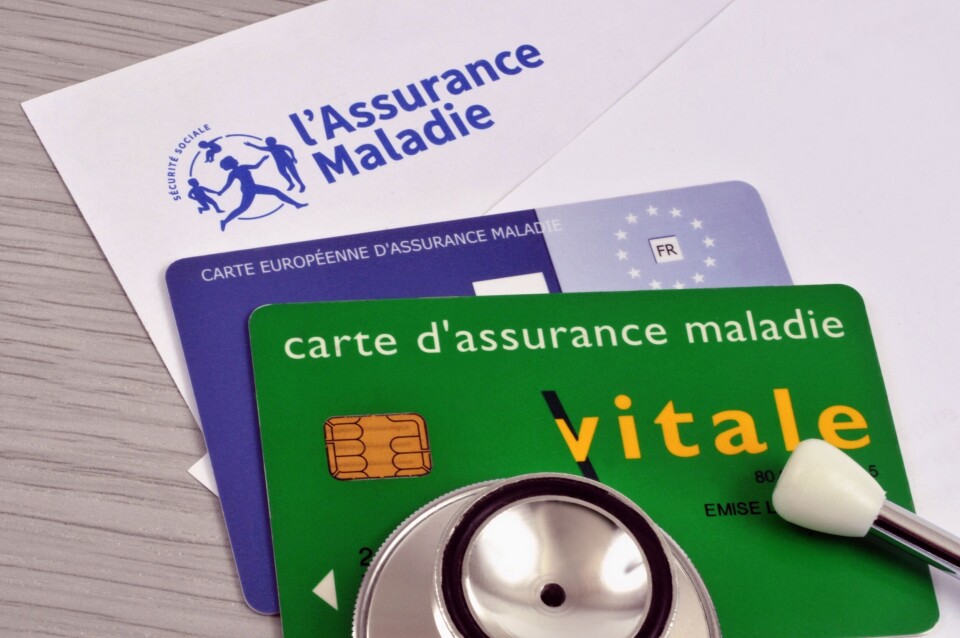
What is the carte européene d’assurance maladie ?
The carte européene d’assurance maladie (Ceam) is the French version of the European health insurance card (Ehic) which enables you to receive state healthcare if you are travelling in an EU/EEA country or the UK (see below for specific countries covered).
If residents in the country receive free healthcare, then you will be entitled to that. If residents pay, you will receive healthcare at the same rates.
The card is individual and named, meaning that every separate family member must have their own, including children under age 16. The French Ceam card is valid for two years.
If you are a resident in France it will enable you to show your healthcare rights as part of the French Assurance maladie , to make sure that your medical costs are covered during your trip. Note, however, that state pensioners of other EU countries or the UK (whose healthcare is paid by them, via the S1 system) have Ehics from those countries and not French Ceams, and the UK version cannot be used in the UK.
Read more: How French residents can access care in the UK on trips
The card is valid in public hospitals and with doctors and pharmacies across Europe.
However, it is only valid for care that has become necessary during your trip, is medically necessary, and cannot wait until you return to your home country (for example, accidental injury). Usually, whether a case is necessary must be decided by a health professional. Treatment that is planned in advance of travel is not covered.
The Ehic is not an alternative to travel insurance and does not cover, for example, mountain or sea rescue or a flight home in case of injury. It will also not usually cover private care and in countries where the state does not fully cover healthcare costs, it will equally not reimburse you 100%.
Which countries are covered?
The card is valid if you are travelling in the European Union, as well as the wide European Economic Area (EEA, which also includes Iceland, Liechtenstein, and Norway), Switzerland, and the UK.
What time period is covered? Will it work if I stay in the country for a longer time?
The card itself is valid for two years. If you are still resident elsewhere, and travelling in another country, you can use your card even for a long trip. However, if you become a resident in the other country, you will need to register for state healthcare separately instead.
Who is entitled to one?
Anyone living in any of the countries covered under the scheme and registered with its healthcare system (see the countries covered, above). Most state healthcare, including that of France and the UK, is residency-based.
How do I get one?
If you are registered with the French Assurance Maladie , you can order a Ceam card online via your Ameli website account. You need to log in and head to the Mes démarches section. Your card will then be posted to your registered address within a few days. The card is free.
You can also use the Ameli app to get a digital version, or request one by phone on 3646 within France, or +33 1 84 90 36 46 from outside of France. You can also request a card via the ameliBOT chatbot.
Is there anything else I need to know?
If healthcare in the country you are visiting is normally free for residents, it will be free to you too on presentation of the card. Otherwise, you have to pay upfront and obtain a reimbursement, either by applying in the country through its usual channels, or on return home.
You can present the invoices and proof of payment to your local Cpam when you return to France or if you have an Ameli account you can get reimbursed for the care via your Ameli account.
It is also possible to register for and use a digital card instead of a physical one.
The Ceam must be requested at least 20 days before you travel.
If you are travelling within the next 15-20 days, it is advised to ask for a provisional replacement certificate instead. This is valid for three months and is valid in the same situations as a normal Ceam.
Related articles
What medical insurance should I get to visit my second home in France?
Post-Brexit travel healthcare: What is a UK ‘CRA’ Ehic card?
healthcare europe assurance maladie french news

Baffled by the Tour de France rules? Read these four points
It is one of the most-watched sporting events in the world but do you know what the jersey colours mean and why riders are not only trying to finish in the fastest time?

Three drown off the coast of Nice in separate incidents
Police evacuated beaches along the popular Promenade des Anglais

Far-right French election candidate withdraws over pic of her in Nazi hat
Photo posted on social media shows candidate wearing officer’s hat with a swastika

Five things to know to understand the French mindset
Why being polite means not being too friendly and arriving late is sometimes best
Seven key French expressions to help you understand Le Tour de France
The 100-year-old annual bicycle race has long-standing traditions and even its own vocabulary
How do I check my French retirement funds?

Rocamadour’s famous sword in the rock is missing, theft suspected
The sword was made famous by an epic of French literature

What do UK parties offer for Britons abroad in election manifestos?
We look at policies from the Conservatives, Lib Dem, Labour, Reform, the Greens and more

Letters: House prices are set by the free market - even in France
Connexion reader says the American who bought a house in the south-west was free to do so even if it upset locals

Access to physiotherapists, nurses, and opticians now easier in France
The rules will be trialled for five years

UK election: Low take-up by overseas British voters with new rights
Reasons may include the early date, lack of funding for publicity for ‘votes for life’, and voter disenchantment with politics

What happens to my French estate when I die (I live alone)?
Who will perform the administrative tasks?

Map: confirmed results around country from French election first round
The far right has a strong lead in rural areas but struggled to gain a foothold in many major cities
French communes offer help for low-income residents to go on holiday
The means-tested scheme is thought to be the first of its kind and aims to help 10,000 people
Strike by public transport workers in Lille may delay Olympic torch
Tour de france 2024: day-by-day route tracker, forest fire warnings raised in the south of france.

ZCR, ZFE, ZPAd... complicated French rules will not put me off my road trip
If you are planning a summer road trip, make sure you are up to date with the Crit'Air sticker rules

Five things they don’t tell you about... la kermesse in France
We look at how fundraisers for the local church turned into annual school parties that are a huge part of French village life

Man who speaks 50 languages gives his tips on learning French
It should not be a difficult language to learn for English-speakers due to significant common ground, although a sympathetic ear may be necessary, says hyperpolyglot Alexander Argüelles

‘They eat everything’: New type of invasive ant spreading in France
The insects can be particularly difficult to get rid of, and were first spotted in France in 2017
Films and series to watch to improve your French in July
Work on your language skills and celebrate the annual Fête du cinéma
Best and worst anti-mosquito products in test by French consumer group
Reform to tighten france’s unemployment rules suspended after election, covid-19: advice for tests, masks, isolation as cases rise in france.

Property in France: Buying power up slightly amid falling prices
Buyers have gained an extra 3m2 for their money in 20 of the largest towns, a new study claims

Chicken sold in French supermarkets recalled over listeria concerns
Products include thighs and wings from the well-known Loué brand. Refunds are available

How to know when to use jour vs journée in French
There is an easy rule to remember to avoid getting these similar words mixed up

Three die as light aircraft crashes onto motorway near Paris
Four-seater Cessna plane hit a high-voltage wire shortly after take-off

Three die when tree falls on car as weekend storms hit northern France
A fourth passenger is in critical condition

Weather in France July 1 – July 5: Forecast by area this week
Latest predictions for temperatures, sun, clouds, rain and more for your area for the next 5 days. Temperatures will remain warm around Marseille but in Normandy frequent rainfall is expected

What happens now after the first round of voting in French elections?
The high turnout and low number of candidates has led to many three-way votes in the second round

Election first round: see how people voted in your area of France
More than 70 candidates have already been elected due to number of votes won in the first round

Travel Guide
- Things to Do
- Health & Insurance
- Visitor Information
- Entry Requirements & Customs
- Getting Around
- Regions in Brief
- Calendar of Events
- Tips on Accommodations
- Getting There
- Escorted & Package Tours
- Special-Interest Vacations
- Tips for Multicultural Travelers
- Sustainable Travel & Ecotourism
- Tips for Families
- Tips for Gay and Lesbian Travelers
- Tips for Senior Travelers
- Tips for Travelers with Disabilities
- Staying Connected
- Suggested Itineraries
Health and Insurance in France
General Availability of Healthcare
In general, France is a safe destination. You don't need shots, most food is safe, and the water is potable. It is easy to get a prescription filled, and nearly all destinations have English-speaking doctors at hospitals with well-trained staffs.
Contact the International Association for Medical Assistance to Travelers ( IAMAT; tel. 716/754-4883 or 416/652-0137 in Canada; www.iamat.org) for tips on travel and health concerns in the countries you're visiting, and for lists of local English-speaking doctors. The United States Centers for Disease Control and Prevention (tel. 800/311-3435 or 888/232-6348; www.cdc.gov) provides up-to-date information on health hazards by region or country and offers tips on food safety. Travel Health Online (www.tripprep.com), sponsored by a consortium of travel medicine practitioners, may also offer helpful advice on traveling abroad. You can find listings of reliable medical clinics overseas at the International Society of Travel Medicine (www.istm.org).
The following government websites offer up-to-date health-related travel advice:
- Australia: www.smartraveller.gov.au
- Canada: www.hc-sc.gc.ca
- U.K.: www.nathnac.org
- U.S.: www.cdc.gov/travel
What to Do If You Get Sick Away from Home -- For travel abroad, you may have to pay all medical costs upfront and be reimbursed later. Medicare and Medicaid do not provide coverage for medical costs outside the U.S. Before leaving home, find out what medical services your health insurance covers. To protect yourself, consider buying medical travel insurance.
U.K. nationals will need a European Health Insurance Card ( EHIC; tel. 0845/605-0707; www.ehic.org.uk) to receive free or reduced-costs health benefits during a visit to a European Economic Area (EEA) country (European Union countries plus Iceland, Liechtenstein, and Norway) or Switzerland.
If you suffer from a chronic illness, consult your doctor before your departure. Pack prescription medications in your carry-on luggage and carry them in their original containers, with pharmacy labels -- otherwise they won't make it through airport security. Carry the generic name of prescription medicines, in case a local pharmacist is unfamiliar with the brand name.
The most common menace, especially in large cities -- particularly Paris -- is the plague of pickpockets. Take precautions and be vigilant at all times: Don’t take more money with you than necessary, keep your passport in a concealed pouch or leave it at your hotel, and ensure that your bag is firmly closed at all times. In cafes, bars, and restaurants, it’s best not to leave your bag under the table, on the back of your chair, or on an empty chair beside you. Keep it between your legs or on your lap. Never leave valuables or luggage in a car, and never travel with your car unlocked.
In general, Paris is a safe city and it is safe to use the Métro late at night, though it is always best to not drawn attention to the fact you are foreign by speaking loudly in English. Use common sense when taking public transport at night.
Much of the country, particularly central France, the northeast, Normandy, and Brittany, remains relatively safe, although no place in the world is crime-free. Those intending to visit the south of France, especially the Riviera, should exercise caution; robberies and muggings are more likely to occur here than in other parts of the country. It's best to check your baggage into a hotel and then go sightseeing instead of leaving it unguarded in the trunk of a car, which can easily be broken into. Marseilles is among the most dangerous French cities.
Female travelers should not expect any more hassle than in other major cities, and the same precautions apply. Avoid walking alone at night and never get into an unmarked taxi. If you are approached in the street or on public transportation, it’s best to avoid entering into conversation, and walk into a well-lit, populated area.
If you take regular medication, pack it in its original pharmacy containers, along with a copy of your prescription.
Medical Insurance -- For travel overseas, most U.S. health plans (including Medicare and Medicaid) do not provide coverage, and the ones that do often require you to pay for services upfront and reimburse you only after you return home.
As a safety net, you may want to buy travel medical insurance, particularly if you're traveling to a remote or high-risk area where emergency evacuation might be necessary. If you require additional medical insurance, try MEDEX Assistance (tel. 410/453-6300; www.medexassist.com) or Travel Assistance International (tel. 800/821-2828; www.travelassistance.com; for general information on services, call the company's Worldwide Assistance Services, Inc. at tel. 800/777-8710; www.worldwideassistance.com).
Canadians should check with their provincial health plan offices or call Health Canada (tel. 866/225-0709; www.hc-sc.gc.ca) to find out the extent of their coverage and what documentation and receipts they must take home in case they are treated overseas.
Travelers from the U.K. should carry their European Health Insurance Card (EHIC), which replaced the E111 form as proof of entitlement to free/reduced cost medical treatment abroad (tel. 0845/605-0707; www.ehic.org.uk). Note, however, that the EHIC only covers "necessary medical treatment," and for repatriation costs, lost money, baggage, or cancellation, travel insurance from a reputable company should always be sought (www.travelinsuranceweb.com).
Travel Insurance -- The cost of travel insurance varies widely, depending on the destination, the cost and length of your trip, your age and health, and the type of trip you're taking, but expect to pay between 5% and 8% of the vacation itself. You can get estimates from various providers through InsureMyTrip.com (tel. 800/487-4722 ). Enter your trip cost and dates, your age, and other information, for prices from more than a dozen companies.
U.K. citizens and their families who make more than one trip abroad per year may find an annual travel insurance policy works out cheaper. Check www.moneysupermarket.com (tel. 0845/345-5708 ), which compares prices across a wide range of providers for single- and multitrip policies.
Most big travel agencies offer their own insurance and will probably try to sell you their package when you book a holiday. Think before you sign. Britain's Consumers' Association recommends that you insist on seeing the policy and reading the fine print before buying travel insurance. The Association of British Insurers (tel. 020/7600-3333; www.abi.org.uk) gives advice by phone and publishes Holiday Insurance, a free guide to policy provisions and prices. You might also shop around for better deals: Try Columbus Direct (tel. 0870/033-9988; www.columbusdirect.net).
Trip-Cancellation Insurance -- Trip-cancellation insurance will help retrieve your money if you have to back out of a trip or depart early, or if your travel supplier goes bankrupt. Trip cancellation traditionally covers such events as sickness, natural disasters, and State Department advisories. The latest news in trip-cancellation insurance is the availability of expanded hurricane coverage and the "any-reason" cancellation coverage -- which costs more but covers cancellations made for any reason. You won't get back 100% of your prepaid trip cost, but you'll be refunded a substantial portion. TravelSafe (tel. 888/885-7233; www.travelsafe.com) offers both types of coverage. Expedia also offers any-reason cancellation coverage for its air-hotel packages. For details, contact one of the following recommended insurers: Access America (tel. 866/284-8300; www.accessamerica.com); Travel Guard International (tel. 800/826-4919; www.travelguard.com); Travel Insured International (tel. 800/243-3174; www.travelinsured.com); and Travelex Insurance Services (tel. 800/228-4602; www.travelex-insurance.com).
Note : This information was accurate when it was published, but can change without notice. Please be sure to confirm all rates and details directly with the companies in question before planning your trip.

- All Regions
- Australia & South Pacific
- Caribbean & Atlantic
- Central & South America
- Middle East & Africa
- North America
- Washington, D.C.
- San Francisco
- New York City
- Los Angeles
- Arts & Culture
- Beach & Water Sports
- Local Experiences
- Food & Drink
- Outdoor & Adventure
- National Parks
- Winter Sports
- Travelers with Disabilities
- Family & Kids
- All Slideshows
- Hotel Deals
- Car Rentals
- Flight Alerts
- Credit Cards & Loyalty Points
- Cruise News
- Entry Requirements & Customs
- Car, Bus, Rail News
- Money & Fees
- Health, Insurance, Security
- Packing & Luggage
- -Arthur Frommer Online
- -Passportable
- Road Trip Guides
- Alaska Made Easy
- Great Vacation Ideas in the U.S.A.
- Best of the Caribbean
- Best of Mexico
- Cruise Inspiration
- Best Places to Go 2024
- Introduction
- Pick your city
- Create account
- App overview
- Partnerships
- Bienvenue en France
- Schedule a demo
- Student visa
Mandatory health insurance
- Complementary health insurance
- Local bank account Free
- Mobile phone plans
- International student card
- Home insurance
- Housing aid ~€150/month
- Electricity and gas
- Broadband deals
- Travelling in France
- Travelling in Europe
- CREATE ACCOUNT

Last update, Sept. 2021 5-min read
| What should I remember?
Health insurance is mandatory in France and understanding how it works can be quite a pickle, even for French citizens! Don’t worry though, we’ll walk you through what matters : how you can apply, how much it is, what does it cover…
We will also introduce you to the Vitale card and explain why you should always carry it with you 😉
Here is a quick recap’ of what you need to remember:
- Registration to the French Healthcare is mandatory if you are staying more than 3 months .
- Registration is free. Once registered, you will receive a ‘Vitale card’, a physical card with a chip in it that you use to identify yourself for healthcare.
- Registration is done online, application is available in English, Spanish and French. A tutorial has also been translated in Mandarin and Arabic.
How can I apply?
We explain how health insurance works and how to apply for it.
Healthcare in France
France has a universal healthcare system. It’s managed by the Ministry of Health and supplemented by private insurers. Health insurance is mandatory for all citizens, whether they’re employed or not.
France also requires all foreigners or long-term visitors (more than 3 months) to have health coverage. This coverage provides access to the typical health insurance that all French citizens receive. EU citizens may opt for the European health insurance card instead.
Mandatory vs complementary health insurance
The mandatory health insurance , administered through the French Social Security office, covers up to 70% of services for all typical health care needs, including general practitioners, hospitals, dentists, and pharmacy costs.
To pay for additional services like chiropractors or long-term care at private hospitals, or to cover the remaining 30% of the basic care, you can purchase private insurance: that’s the complementary health insurance .
Mandatory health insurance is free and registration is done online, via a website dedicated to international students that is available in both French and English.
Registration is done in two steps, you will first get a temporary certificate . The processing of your file may take time (more than a month) but don’t worry, you will be covered from the moment you receive your temporary certificate 😊
Vitale card and social security number
Once you have registered for French health insurance, you will receive a “ social security number ” and a “ Vitale card ”. What are those, you may ask?
• Your “ social security number ” is your ID number for the healthcare system. It proves that you are registered to the French mandatory health insurance and that your health care expenses are covered, up to 70%. Your “social security number” will be frequently requested by the French administration (e.g. if you decide to sign up for complementary health insurance).
• Your “Vitale card” is a physical card with a chip in it that you use to identify yourself for healthcare. It has your photo on it as well. You’ll use this at your GP’s office, dentist, when buying glasses and for other health-related expenses.

Download our documentation
You’ve got a question? Contact-us 😊
STUDENT HUB New!
Schools & universities, studyinfrance.
© 2023 StudyinFrance.
Legal Notice
Privacy Policy
- Skip navigation
- Find a branch
- Help and support
Popular searches
- Track a parcel
- Travel money
- Travel insurance
- Drop and Go
Log into your account
- Credit cards
- International money transfer
- Junior ISAs
Travel and Insurance
- Car and van insurance
- Gadget insurance
- Home insurance
- Pet insurance
- Travel Money Card
- Parcels Online
For further information about the Horizon IT Scandal, please visit our corporate website
- Travel insurance for France
It may be a short hop away, but a trip to France is not without its travel risks. Make sure you’re clued up on what they are and have travel insurance in place to help protect you, so you can concentrate on just enjoying your break.
Here we’ve shared some notes on how to access medical care if needed as a UK citizen in France, what to consider when buying travel insurance, plus points of local culture and how to get around.

Fancying France? Go in the know
Whether you’re spending a romantic weekend in the City of Lights, taking a daytrip to eat seafood in Bourgogne, skiing Briançon’s dizzy heights or degusting by your gite in the Dordogne, make sure you’ve packed good travel insurance along with your faint, childhood memories of how to order a 'croque monsieur'. Check your chosen policy provides all the cover you need, such as coronavirus cover .
And if you’re one of the millions of Brits driving to our closest European neighbour in a typical year, be aware of the rules that govern road traffic, as well as customs limitations for your return.
As it’s just a short hop away from most parts of the southern coast, a huge number of us have been to France at some point in our lives. There’s a large expat community and a great many cultural similarities.
The currency in France is the euro . You can use a prepaid travel money card to access your holiday money easily, and euros are one of the currencies available on them.
Protect what matters when you go with good travel insurance
Healthcare in france.
French healthcare is on a par with the rest of Western and Northern Europe and medical facilities are common.
If you're a UK citizen, you can apply for a Global Health Insurance Card (Ghic) that will give you access to emergency or necessary state healthcare in France and other EU countries for free or at a lower cost. If you have the previous Ehic card and it's still in date, you can use it until it expires.
Neither the Ghic or Ehic cover all eventualities, including repatriation to get you home. So it’s vital to have travel insurance in place to cover any medical eventualities – including medical repatriation or even helicopter mountain rescue.
While it’s sensible to bring any prescription drugs you need with you, if you run out and need to acquire more from a French pharmacy, you’ll require a prescription to do so. It’s also wise to bring a doctor’s note to explain why you’re taking these medicines.
Travel risks in France
Most trips to France are trouble-free and crime is relatively low in large parts of the country. There are, however, crime hotspots in large cities such as Paris and Marseilles.
It’s important to take caution against scams and street crime just as you would in any populous city. If you are driving into or out of Paris, you may get unwanted attention from ‘windscreen cleaners’ in the banlieues.
Similarly, you may find that you are asked to sign bogus petitions and donate to fictional charity schemes by strangers on the street in the centre of town.
Beyond the risks faced by a tourist in any major city, travel risks in France are few. Always be cautious when engaging in activities that pose inherent risk, such as kayaking or skiing , and make sure that your travel insurance covers you for these activities. Check the Foreign, Commonwealth and Development Office (FCDO) travel advice for France before taking a trip there. Travelling against this advice could invalidate your insurance.
Regional considerations
Do not take it for granted that locals will have a firm grasp of English. It’s always wise to learn a few key phrases if you don’t already know what you need to get by. This applies particularly in rural France.
According to the FCDO guidance on terrorism in France attacks are likely and recent years have borne witness to the country’s terrible suffering at the hands of terrorists. Attacks are likelier to target cities and, when in these areas, always follow the local advice being given.
In Paris, street crime is present and it is advisable to take all the necessary precautions against it. Do not carry your passport or valuables with you unless you need to, and keep all money and valuables somewhere safe about your person. For instance, do not carry your wallet in your back pocket as this is easier to steal. The Gare du Nord station is particularly bad for pickpocketing and attempted scams, and some of the banlieues (autonomous suburbs) have higher crime rates. Read our guide to travel document safety .
Getting around
Lots of Brits drive to France due to the ease of access for drivers. Like all EU countries, the French drive on the right-hand side of the road.
French law requires you to have a few things in place to drive there. Firstly, you will need your full UK driving licence, your adult passports , and children's passports , your V5C (registration document) and your insurance documents. RAC guidance for driving in France points out you will also need your car to have a GB sticker, spare bulbs, a traffic triangle, breathalyser tests, snow chains, headlight deflector stickers and reflective jackets. Kits can be purchased cheaply that contain all you need to avoid breaking the law and being fined. You will not need an International Driving Permit to drive in France.
Motorcyclists must always wear helmets when riding. Some motorcycling laws might be expansions of those we have here, so read Drive France's guide to seeing the country on two wheels if you plan on doing so.
The drink drive limit is 0.5 per litre for fully-qualified car drivers. However, since it is very difficult to know what this means in terms of drinks, it is best not to drink and drive at all.
French motorways are privately owned, so if you break down on one you must use the orange phone boxes to call the licensed recovery firm for help. They will transport you to an area where you can contact your own breakdown service.
In cities, there are often limits on how much you can drive in order to lower pollution levels. These change between cities, but the RAC has a guide to driving laws in French cities .
Intercity rail travel is fast and clean, however it can also be pricey. Within cities, bus transport is usually cheap and reliable and some cities, including Paris, Marseilles, Toulouse and Rennes have metro lines, which are a cost-effective and speedy way of getting around.
It’s normally not too taxing to walk around large parts of many French cities, which is a fantastic way of seeing sights.
In rural France, it is very likely that you will need a car to get around. Buses are infrequent and do not serve wide-ranging areas.
Cycling is common however cycle lanes, particularly outside of cities, are not. It is always wise to exercise caution when cycling and wear a helmet, and wearing a helmet is a legal requirement for children under 12. Make sure that your travel insurance covers you for cycling before renting your bike. Wearing a helmet may also be a requirement of your insurance.
Travel insurance for activities in France
In rural France, a large proportion of what there is to do involves outdoor activities. As well as being fun, adventure activities also come with inherent risks and it is imperative to check your travel insurance policy to make sure that you’re covered.
It’s always a good idea to take a copy of your travel insurance policy with you on holiday so that you can check on the spur of the moment whether you’re covered.
Some activities will require a specific add on, such as ski cover. If you find that you’re not covered for an activity that you really want to do, then you can always call your insurer to find out whether they can assist you.
Do I need travel insurance for France?
If you’re visiting France, it’s important to have travel insurance in place for all kinds of reasons. Not least, it will help make sure you’re covered for emergency medical expenses if you fall ill or are injured while you’re away, and even repatriation if you need to be transported home.
Healthcare in France is on a par with the rest of western Europe but can be costly if you’re paying for it yourself. With good-quality travel cover you shouldn’t have to. You can claim back the costs on your policy.
Travel insurance will also protect you against cancellation of your trip or delay and other types of disruption to your travel plans. It will also reimburse you for replacing lost, damaged or stolen belongings like luggage and passports. Make sure you check the latest FCDO travel advice for France as travelling against it could invalidate your holiday insurance.
Is travel insurance mandatory for France?
France isn’t a country where it’s compulsory to have travel insurance to visit but there are always risks associated with travel anywhere and it’s important to safeguard against them.
From cancelled, delayed or disrupted journeys to illness, injury or lost, stolen or damaged belongings when you’re there, various events – however unlikely they may seem – could put a dampener on your holiday. Travel insurance can help overcome or reduce their impact.
It can reimburse you for the costs of medical treatment, repatriation to the UK if needed and replacement of possessions. It can also provide access to emergency assistance if you need it during your stay.
It’s also important to check the details of any policy before you buy to make sure everything you need is covered. For instance, cruises, activities such as skiing and some of the gadgets you take aren’t usually covered so you may need to buy additional cover for them.
Interested in travel insurance?
Other travel products.
Order foreign currency online or in selected branches. Pick up in any branch or get it delivered to your home.
One prepaid Mastercard™ that stores up to 22 currencies.
Get your passport application right the first time. We can even complete and submit it for you digitally.
This might interest you
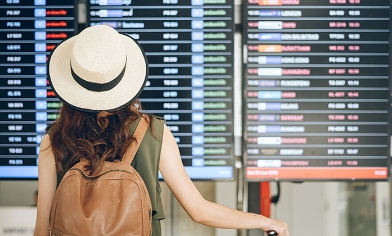
Travel’s a great way to unwind, see the world, open the mind and expand ...

People flock to the Canary Islands from all over Europe. No wonder, with such ...

Greece and the Greek islands have long been a popular travel destination for us ...

If you’re jetting off to Japan soon make sure you have good travel insurance to ...

How safe is South Africa to visit and why is having travel insurance important ...

Find out what medical care Brits can access in New Zealand and travel risks to ...

Today, Cuba is more accessible than it has been for many decades, and those who ...

Do UK residents need travel insurance for Ireland? And what healthcare is ...
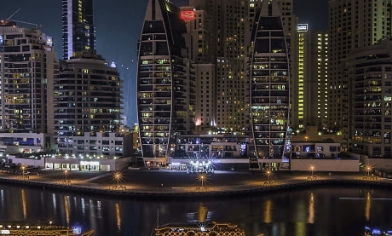
Planning on living the high life with a trip to the UAE’s iconic mega-city, ...

Booking a last-minute holiday can get the blood pumping with the sudden thrill ...

Find out about medical care available to Brits in Mexico, as well as travel ...

Find out about the safety of travelling to Italy as well as the medical care ...

The status of Schengen visas for international students resident in the UK is ...

Every year, millions of holidaymakers from the UK head to Spain for its ...

The famous cliché of America is that it's big. And it is. Across its six time ...

Heading down under for a trip to or around Australia? Make sure you’ve got the ...

Perched on the northern tip of Africa, Morocco’s long been a popular ...

Canada is a vast country of diverse delights – everything from bustling cities ...
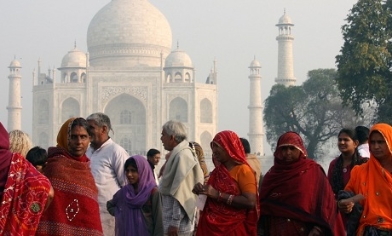
For many UK holidaymakers, India is an intriguing and diverse culture with ...

Thailand’s idyllic beaches, azure-blue sea, buzzing cities and exciting ...

Make sure you’re travelling safely in Egypt with the latest advice and risks, ...

Holidays for teenagers can take some imagination to make sure they’ve got the ...

Exploring the globe can be scary, but there’s so much to find at the edge of ...

If you're the type of sunchaser who looks forward to that sizzling summer ...

It’s one of the most popular holiday hotspots for UK holidaymakers. But what ...
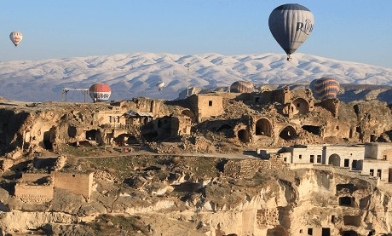
A trip to Turkey offers toasty beaches and tourist treats aplenty. No wonder ...
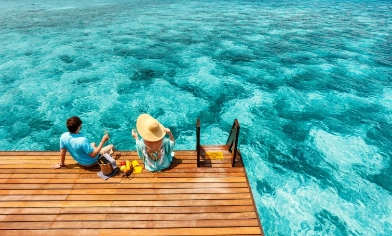
Dark mornings, cold hands, heating bills and chapped lips are among the most ...

Travelling solo means freedom and independence, making new connections and ...
- Skip to main content
- Skip to "About this site"
Language selection
Search travel.gc.ca.
Help us to improve our website. Take our survey !
COVID-19: travel health notice for all travellers
France travel advice
Latest updates: Safety and security – updated information on cybercrime
Last updated: July 2, 2024 14:10 ET
On this page
Safety and security, entry and exit requirements, laws and culture, natural disasters and climate, france - exercise a high degree of caution.
Exercise a high degree of caution in France due to the elevated threat of terrorism.
Back to top
"Attack emergency" alert
On March 24, 2024, the Prime Minister of France raised the security threat level within the “Vigipirate” plan to “urgence attentat” (“attack emergency”). This is the highest level in the Vigipirate plan, a set of measures to prepare and protect the population and public places. The decision was made following a terrorist attack in Moscow claimed by the Islamic State.
Always be aware of your surroundings when in public places. Be particularly alert during public gatherings and demonstrations.
If you are in France:
- expect enhanced security measures and an increased police presence at the border and in public places
- monitor local media for the most recent information
- follow the instructions of local authorities
Vigipirate plan – Government of France (in French)
Legislative elections
Legislative elections are scheduled for June 30 and July 7, 2024. Political rallies and demonstrations could occur before, during, and after the elections.
- Avoid areas where demonstrations and large gatherings are taking place
- Follow the instructions of local authorities
- Monitor local media for the latest information
Olympic and Paralympic Games
The Olympic Games will take place in Paris from July 26 to August 11, followed by the Paralympic Games from August 28 to September 8, 2024.
Public events will take place across France starting on May 8 and will continue until the opening ceremony.
If you plan to travel to France during this time, plan your travel accordingly.
During the Olympic Games, especially in Paris, you should expect:
- an increased presence of security forces
- major disruptions to traffic and movement
- large crowds and public gatherings
Useful links
- Games-related information and advice for Canadians
- Olympic and Paralympic Games Paris 2024 – official site
There is a threat of terrorism in Europe. Terrorists have carried out attacks in several European cities.
Over the past few years in France, several opportunistic and premeditated attacks have occurred. These have resulted in many deaths and injuries. Further attacks are likely.
Vigipirate plan
The Vigipirate plan is a set of measures established by the French government to prepare and protect the French population, infrastructure and institutions in the event of an attack. The aim is also to allow rapid deployment of intervention measures if necessary.
As part of this plan, the government maintains a 3-level public alert system for terrorism. Changes in the threat level are communicated online and through local and national media.
Operation sentinelle
Operation Sentinelle allows the deployment of military brigades in public places to patrol and deter terrorist acts. Enhanced security measures have been deployed in various strategic locations, including:
- transport hubs
- public places
- tourist locations, especially in Paris
Expect an increased police or military presence in public places, including some tourist locations, particularly in Paris.
Attacks can occur anywhere. Terrorists may target:
- government buildings and those of local authorities
- schools/universities
- places of worship
- places dedicated to culture, such as exhibition galleries, museums, concert halls and theatres
- airports, railway stations and other transportation hubs and networks
- public areas such as tourist attractions, monuments, restaurants, bars, coffee shops, shopping centres, markets, hotels and other sites frequented by foreigners
While in France:
- always be aware of your surroundings when in public places
- be particularly vigilant if attending large gatherings such as sporting events and religious celebrations or other public celebrations
- Information on the terrorist threat in France - Ministry of the Interior (in French)
- How to react in case of a terrorist attack - Government of France (in French)
- Social media accounts of the Ministry of the Interior - Ministry of the Interior (in French)
- Vigipirate – General secretary of defense and national security (in French)
Petty crime
Petty crimes, such as pickpocketing, and purse and mobile phone snatching are common.
Thieves are very skilled. They often act in groups and are often minors. They may use various techniques to divert your attention and steal your belongings.
Thieves are mainly active in large cities and busy places, such as:
- the main tourist sites
- department stores
- restaurants and patios
- hotel lobbies
- public transport, in particular the Paris metro and the Île-de-France regional express network (RER) lines linking the capital to its surroundings
Violent crimes
Violent crimes are rarer, but still occur.
Tourists are sometimes victims of violent attacks by groups of young people who want to rob them. These attacks usually occur :
- around major tourist attractions
- near railway stations
- on trains of the Île-de-France regional express network (RER) connecting the capital to its surroundings
Assaults can also occur outside night-time establishments and in more isolated areas at night.
Residential break-ins
Residential break-ins occur, especially in large cities and coastal areas. Burglars sometimes target houses or holiday rental apartments.
- be vigilant, particularly when approached by strangers
- ensure that your belongings, including passports and other travel documents, are secure at all times
- avoid showing signs of affluence and carrying large sums of cash
- limit the use of mobile phones on public transportation and in crowded areas to ensure you remain aware of your surroundings and to avoid attracting attention
- don’t keep your credit, debit cards and cash in the same place
- never leave your bags unsupervised
- choose well-secured accommodation and make sure you lock doors and windows at night and when you’re away
Parked vehicles and vehicles on the road
Vehicle break-ins are frequent. Theft of parked cars or their contents is particularly common on beach roads in the south of France and at highway rest stops throughout the country, especially during the summer, when there is a high number of travellers.
- Leave nothing in view in the vehicle
- Use secure parking facilities
- Be particularly vigilant when renting automobiles, as rented vehicles are a target of choice
Drivers are often tricked into stopping their cars by thieves who either obstruct the road or distract the driver by flashing their headlights. They may also pretend that you have a flat tire or even puncture a tire themselves. Once the vehicle is stopped, the thieves seize the opportunity to steal a bag or other valuable objects.
- Beware of any person who waves at you to stop on the highway
- Be especially vigilant when stopped at traffic lights, as bags are often snatched from the front passenger seat by thieves travelling on scooters
- Keep windows closed and doors locked at all times
Victims of crime
If you’re a victim of theft, go to the nearest police station to report the crime. Keep a copy of your theft report, as you will need it if you wish to make a claim to your insurer. If the incident takes place in the metro, a metro officer can direct you to the nearest police station.
You can complete an online pre-complaint for certain types of minor crime, such as property theft, before going to the police station. This may speed up the process once you get there.
- Prevention advice for tourists - Préfecture de police de Paris
- Online pre-complaint - Ministry of the Interior (in French)
Bomb threats
Since October 2023, there have been a number of bomb threats sent to public places across France.
Bomb threats and hoaxes can target any location, including:
- tourist areas
- shopping centres
- transportation hubs
- government facilities
- religious institutions
If you are in an area targeted by a bomb threat, follow the instructions of local authorities including evacuation orders.
Credit card and ATM fraud
Credit card and ATM fraud occurs.
When using debit or credit cards:
- pay careful attention if other people are handling your cards
- use ATMs located in public areas or inside a bank or business
- avoid using card readers with an irregular or unusual feature
- cover the keypad with one hand when entering your PIN
- check for any unauthorized transaction on your account statements
Cybercrime and online extortion, including phishing scams, occur.
Cybercriminals can compromise public Wi-Fi networks to steal personal data or credit information. They may try to trick you with communications that seem legitimate but are fraudulent. These could include promises of discounted merchandise or accommodations, or free event tickets.
- Use secure public Wi-Fi networks
- Carry your own USB adaptor or carry an extra battery pack instead of using public charging stations
- Make online purchases only from secure and official websites
- Be cautious when posting information or photos on social media
- Beware of people who show a keen interest in you online
- Always meet new acquaintances in a secure and familiar location
- Overseas fraud
- Cyber security while travelling
- Don’t take the bait : Recognize and avoid phishing attacks
Demonstrations
Demonstrations occur frequently. They are usually planned as permission from the local authorities is required. However, unauthorized and spontaneous demonstrations also take place.
Even peaceful demonstrations can turn violent at any time. They can also lead to disruptions to traffic and public transportation.
Radical activists and vandals have a history of using aggressive and violent tactics during demonstrations in order to cause damage and provoke a strong response from the police. They sometimes throw stones, smoke grenades, bottles and other debris at rallies. The police normally respond with tear gas to disperse the crowds.
- Monitor local media for information on ongoing demonstrations
Mass gatherings (large-scale events)
Strikes and pressure tactics occur regularly, particularly in key sectors such as transport. These strikes can sometimes complicate travel and disrupt public services.
- Consult local media to be aware of strikes that may affect your stay or travel plans
- In the event of a transport strike, plan extra time to get to your destination
Swimming, boating and water safety
Coastal waters can be dangerous. Always obey warning flags at beaches.
The main warning flags used in France are:
- Green: calm waters, swimming is allowed
- Yellow: agitated waters, swim with precautions
- Red: dangerous waters, swimming is prohibited
- Purple: contaminated waters or presence of dangerous aquatic species, swimming is prohibited
In autumn and winter, be cautious when walking on the shore, as waves can be unpredictable, breaking further than expected and causing strong undertows.
- Avoid visiting beaches or coastal areas during periods of severe weather warnings
- Look out for signs warning of cliff erosion and falling rocks
- Don’t dive into unknown waters, as hidden rocks or shallow depths can cause serious injury or death
- Exercise caution and follow the advice of the local authorities
Recreational boating
If you are planning to go boating:
- know the capacity of your boat (people and weight) and don’t exceed it
- know the navigation rules
- follow safe practices for all activities on the water: personal watercraft, water-skiing and towed devices, diving or swimming, fishing, etc.
- equip your boat with a VHF marine radio that will generate your position in case of emergency
- be prepared for emergencies
Search and rescue missions in France are carried out by the Regional Operational Surveillance and Rescue Centres (CROSS). In case of emergency, contact the centre on VHF radio channel 16 or by dialling 196.
- Surveillance and rescue at sea - Ministry of the Sea (in French)
- Water safety abroad
Mountain activities
Mountain activities, such as hiking, can be dangerous, especially if they are not well prepared. Trails are not always marked and weather conditions can change rapidly, even in summer.
In winter, heavy snowfall can make it difficult to reach some villages and ski centres. Roads may become impassable. There is also a risk of avalanches, some of which can be fatal.
If you intend to go hiking, mountaineering or skiing:
- never do so alone and do not part with your hiking companions
- buy travel insurance that includes helicopter rescue and medical evacuation
- ensure that your physical condition is good enough to meet the challenges of your activity
- do not venture off marked trails or slopes
- ensure that you’re adequately equipped
- stay informed about weather and other conditions that may pose a hazard
- inform a family member or friend of your itinerary
- know the symptoms of acute altitude sickness, which can be fatal
- obtain detailed information on your activity and on the environment in which you will be doing it before setting out
- Information on mountain conditions - Association nationale pour l'étude de la neige et des avalanches (ANENA) (in French)
- Specialised mountain units - Gendarmerie nationale (in French)
- Avalanche forecasts and warnings - European Avalanche Warning Service (EAWS)
Road safety
French roads are well maintained.
Drive carefully and respect the Highway Code.
Public transportation
Urban and intercity public transportation is reliable. When using these types of transport, make sure you validate your ticket and keep it until the end of your journey. The authorities carry out regular random checks and you may be fined if you do not have a validated ticket.
There is a problem of illegal taxis in Paris airports and train stations. These scammers charge much higher rates than the official ones.
- Ignore direct solicitations when leaving the airport or train station
- Use only official taxis or a trusted ride-sharing app
- Don’t share a taxi with strangers
We do not make assessments on the compliance of foreign domestic airlines with international safety standards.
Information about foreign domestic airlines
Every country or territory decides who can enter or exit through its borders. The Government of Canada cannot intervene on your behalf if you do not meet your destination’s entry or exit requirements.
We have obtained the information on this page from the French authorities. It can, however, change at any time.
Verify this information with the Foreign Representatives in Canada .
- Schengen area
France is a Schengen area country. Canadian citizens do not need a visa for travel to countries within the Schengen area. However, visa-free travel only applies to stays of up to 90 days in any 180-day period. Stays are cumulative and include visits to any Schengen area country.
If you plan to stay in the Schengen area for a longer period of time, you will need a visa. You must contact the high commission or embassy of the country or countries you are travelling to and obtain the appropriate visa(s) prior to travel.
- Foreign Representatives in Canada
Temporary border controls
The French government has reintroduced internal border controls at certain ports of entry. You may be required to pass through immigration controls when entering France, even if arriving from another Schengen area country.
Entry requirements vary depending on the type of passport you use for travel.
Before you travel, check with your transportation company about passport requirements. Its rules on passport validity may be more stringent than the country’s entry rules.
Regular Canadian passport
Your passport must be valid for at least 3 months beyond the date you expect to leave the Schengen area.
Passport for official travel
Different entry rules may apply.
Official travel
Passport with “X” gender identifier
While the Government of Canada issues passports with an “X” gender identifier, it cannot guarantee your entry or transit through other countries. You might face entry restrictions in countries that do not recognize the “X” gender identifier. Before you leave, check with the closest foreign representative for your destination.
Other travel documents
Different entry rules may apply when travelling with a temporary passport or an emergency travel document. Before you leave, check with the closest foreign representative for your destination.
- Foreign Representatives in Canada
- Canadian passports
Tourist visa: not required for stays up to 90 days in any 180-day period Long-stay or residency visa: required for stays longer than 90 days Work permit: required Student visa: required for stays longer than 90 days
More information on Visas - Government of France
Other entry requirements
Customs officials may ask you to show them a return or onward ticket and proof of sufficient funds to cover your stay.
- Children and travel
To leave France, any child under the age of 18 who normally resides in France must be accompanied by at least one parent. Children travelling without at least one parent must be in possession of:
- an authorization to leave the country signed by one of the parents
- a photocopy of the signing parent’s identification
- More information on the authorization to leave the country - French administration services
- More about travelling with children
Yellow fever
Learn about potential entry requirements related to yellow fever (vaccines section).
Relevant Travel Health Notices
- Global Measles Notice - 13 March, 2024
- Zika virus: Advice for travellers - 31 August, 2023
- COVID-19 and International Travel - 13 March, 2024
- 2024 Summer Olympics and Paralympics – France - 6 June, 2024
This section contains information on possible health risks and restrictions regularly found or ongoing in the destination. Follow this advice to lower your risk of becoming ill while travelling. Not all risks are listed below.
Consult a health care professional or visit a travel health clinic preferably 6 weeks before you travel to get personalized health advice and recommendations.
Routine vaccines
Be sure that your routine vaccinations , as per your province or territory , are up-to-date before travelling, regardless of your destination.
Some of these vaccinations include measles-mumps-rubella (MMR), diphtheria, tetanus, pertussis, polio, varicella (chickenpox), influenza and others.
Pre-travel vaccines and medications
You may be at risk for preventable diseases while travelling in this destination. Talk to a travel health professional about which medications or vaccines may be right for you, based on your destination and itinerary.
Yellow fever is a disease caused by a flavivirus from the bite of an infected mosquito.
Travellers get vaccinated either because it is required to enter a country or because it is recommended for their protection.
- There is no risk of yellow fever in this country.
Country Entry Requirement*
- Proof of vaccination is not required to enter this country.
Recommendation
- Vaccination is not recommended.
* It is important to note that country entry requirements may not reflect your risk of yellow fever at your destination. It is recommended that you contact the nearest diplomatic or consular office of the destination(s) you will be visiting to verify any additional entry requirements.
About Yellow Fever
Yellow Fever Vaccination Centres in Canada
Tick-borne encephalitis (TBE) is a risk in some areas of this destination. It is a viral disease that affects the central nervous system (brain and spinal cord). It is spread to humans by the bite of infected ticks or occasionally when unpasteurized milk products are consumed.
Travellers to areas where TBE is found may be at higher risk during April to November, and the risk is highest for people who hike or camp in forested areas.
Protect yourself from tick bites . The vaccine is not available in Canada. It may be available in the destination you are travelling to.
In this destination, rabies may be present in some wildlife species, including bats. Rabies is a deadly disease that spreads to humans primarily through bites or scratches from an infected animal.
If you are bitten or scratched by an animal while travelling, immediately wash the wound with soap and clean water and see a health care professional.
Before travel, discuss rabies vaccination with a health care professional. It may be recommended for travellers who will be working directly with wildlife.
Measles is a highly contagious viral disease. It can spread quickly from person to person by direct contact and through droplets in the air.
Anyone who is not protected against measles is at risk of being infected with it when travelling internationally.
Regardless of where you are going, talk to a health care professional before travelling to make sure you are fully protected against measles.
Hepatitis B is a risk in every destination. It is a viral liver disease that is easily transmitted from one person to another through exposure to blood and body fluids containing the hepatitis B virus. Travellers who may be exposed to blood or other bodily fluids (e.g., through sexual contact, medical treatment, sharing needles, tattooing, acupuncture or occupational exposure) are at higher risk of getting hepatitis B.
Hepatitis B vaccination is recommended for all travellers. Prevent hepatitis B infection by practicing safe sex, only using new and sterile drug equipment, and only getting tattoos and piercings in settings that follow public health regulations and standards.
Coronavirus disease (COVID-19) is an infectious viral disease. It can spread from person to person by direct contact and through droplets in the air.
It is recommended that all eligible travellers complete a COVID-19 vaccine series along with any additional recommended doses in Canada before travelling. Evidence shows that vaccines are very effective at preventing severe illness, hospitalization and death from COVID-19. While vaccination provides better protection against serious illness, you may still be at risk of infection from the virus that causes COVID-19. Anyone who has not completed a vaccine series is at increased risk of being infected with the virus that causes COVID-19 and is at greater risk for severe disease when travelling internationally.
Before travelling, verify your destination’s COVID-19 vaccination entry/exit requirements. Regardless of where you are going, talk to a health care professional before travelling to make sure you are adequately protected against COVID-19.
The best way to protect yourself from seasonal influenza (flu) is to get vaccinated every year. Get the flu shot at least 2 weeks before travelling.
The flu occurs worldwide.
- In the Northern Hemisphere, the flu season usually runs from November to April.
- In the Southern Hemisphere, the flu season usually runs between April and October.
- In the tropics, there is flu activity year round.
The flu vaccine available in one hemisphere may only offer partial protection against the flu in the other hemisphere.
The flu virus spreads from person to person when they cough or sneeze or by touching objects and surfaces that have been contaminated with the virus. Clean your hands often and wear a mask if you have a fever or respiratory symptoms.
Safe food and water precautions
Many illnesses can be caused by eating food or drinking beverages contaminated by bacteria, parasites, toxins, or viruses, or by swimming or bathing in contaminated water.
- Learn more about food and water precautions to take to avoid getting sick by visiting our eat and drink safely abroad page. Remember: Boil it, cook it, peel it, or leave it!
- Avoid getting water into your eyes, mouth or nose when swimming or participating in activities in freshwater (streams, canals, lakes), particularly after flooding or heavy rain. Water may look clean but could still be polluted or contaminated.
- Avoid inhaling or swallowing water while bathing, showering, or swimming in pools or hot tubs.
Insect bite prevention
Many diseases are spread by the bites of infected insects such as mosquitoes, ticks, fleas or flies. When travelling to areas where infected insects may be present:
- Use insect repellent (bug spray) on exposed skin
- Cover up with light-coloured, loose clothes made of tightly woven materials such as nylon or polyester
- Minimize exposure to insects
- Use mosquito netting when sleeping outdoors or in buildings that are not fully enclosed
To learn more about how you can reduce your risk of infection and disease caused by bites, both at home and abroad, visit our insect bite prevention page.
Find out what types of insects are present where you’re travelling, when they’re most active, and the symptoms of the diseases they spread.
- In this country, risk of dengue is sporadic. It is a viral disease spread to humans by mosquito bites.
- Dengue can cause flu-like symptoms. In some cases, it can lead to severe dengue, which can be fatal.
- The level of risk of dengue changes seasonally, and varies from year to year. The level of risk also varies between regions in a country and can depend on the elevation in the region.
- Mosquitoes carrying dengue typically bite during the daytime, particularly around sunrise and sunset.
- Protect yourself from mosquito bites . There is no vaccine or medication that protects against dengue fever.
Zika virus is a risk in this country.
Zika virus is primarily spread through the bite of an infected mosquito. It can also be sexually transmitted. Zika virus can cause serious birth defects.
During your trip:
- Prevent mosquito bites at all times.
- Use condoms correctly or avoid sexual contact, particularly if you are pregnant.
If you are pregnant or planning a pregnancy, you should discuss the potential risks of travelling to this destination with your health care provider. You may choose to avoid or postpone travel.
For more information, see Zika virus: Pregnant or planning a pregnancy.
Animal precautions
Some infections, such as rabies and influenza, can be shared between humans and animals. Certain types of activities may increase your chance of contact with animals, such as travelling in rural or forested areas, camping, hiking, and visiting wet markets (places where live animals are slaughtered and sold) or caves.
Travellers are cautioned to avoid contact with animals, including dogs, livestock (pigs, cows), monkeys, snakes, rodents, birds, and bats, and to avoid eating undercooked wild game.
Closely supervise children, as they are more likely to come in contact with animals.
Person-to-person infections
Stay home if you’re sick and practise proper cough and sneeze etiquette , which includes coughing or sneezing into a tissue or the bend of your arm, not your hand. Reduce your risk of colds, the flu and other illnesses by:
- washing your hands often
- avoiding or limiting the amount of time spent in closed spaces, crowded places, or at large-scale events (concerts, sporting events, rallies)
- avoiding close physical contact with people who may be showing symptoms of illness
Sexually transmitted infections (STIs) , HIV , and mpox are spread through blood and bodily fluids; use condoms, practise safe sex, and limit your number of sexual partners. Check with your local public health authority pre-travel to determine your eligibility for mpox vaccine.
Medical services and facilities
Health care is excellent and available throughout the country. Up-front payment may be required.
Make sure you get travel insurance that includes coverage for medical evacuation and hospital stays.
Travel health and safety
Keep in Mind...
The decision to travel is the sole responsibility of the traveller. The traveller is also responsible for his or her own personal safety.
Be prepared. Do not expect medical services to be the same as in Canada. Pack a travel health kit , especially if you will be travelling away from major city centres.
You must abide by local laws.
Learn about what you should do and how we can help if you are arrested or detained abroad .
Transfer to a Canadian prison
Canada and France are signatories to the Convention on the Transfer of Sentenced Persons. This enables a Canadian imprisoned in France to request a transfer to a Canadian prison to complete a sentence. The transfer requires the agreement of both Canadian and France authorities.
This process can take a long time, and there is no guarantee that the transfer will be approved by either or both sides.
Penalties for possession, use or trafficking of illegal drugs are severe. Convicted offenders can expect jail sentences or heavy fines.
Drugs, alcohol and travel
Identity checks
You may be subject to identity checks during your stay in France.
Always carry valid identification such as a driver's licence, passport or a copy of it.
Keep photocopies or digital copies of the following documents, in case of loss or seizure:
- the identification page of your passport
- your birth certificate
- your Canadian citizenship card
- your driver’s licence
Keep originals and copies in separate safe locations.
Concealing your face in public places
In France, it’s illegal to cover your face in public places, including international airport arrivals areas.
Offenders risk a very high fine. There is no exemption for tourists or for religious reasons.
- Identity checks - French administration services
- Concealment of the face in public places - French administration services
Dual citizenship
Dual citizenship is legally recognized in France.
If you are a Canadian citizen, but also a citizen of France, our ability to offer you consular services may be limited while you're there. You may also be subject to different entry/exit requirements .
Travellers with dual citizenship
International Child Abduction
The Hague Convention on the Civil Aspects of International Child Abduction is an international treaty. It can help parents with the return of children who have been removed to or retained in certain countries in violation of custody rights. The convention applies between Canada and France.
If your child was wrongfully taken to, or is being held in France, and if the applicable conditions are met, you may apply for the return of your child to the French court.
If you are in this situation:
- act as quickly as you can
- contact the Central Authority for your province or territory of residence for information on starting an application under The Hague Convention
- consult a lawyer in Canada and in France to explore all the legal options for the return of your child
- report the situation to the nearest Canadian government office abroad or to the Vulnerable Children's Consular Unit at Global Affairs Canada by calling the Emergency Watch and Response Centre
If your child was removed from a country other than Canada, consult a lawyer to determine if The Hague Convention applies.
Be aware that Canadian consular officials cannot interfere in private legal matters or in another country's judicial affairs.
- List of Canadian Central Authorities for the Hague Convention
- International Child Abductions: A guide for affected parents
- The Hague Convention – Hague Conference on Private International Law
- Canadian embassies and consulates by destination
- Request emergency assistance
You must be at least 18 years old to drive a car in France.
You should carry an International Driving Permit. You can drive with your Canadian licence for up to 1 year. If you stay in France, you will have to exchange your Canadian licence for a French licence.
Numerous roadside cameras have been installed to help enforce traffic regulations. You could receive heavy fines if you do not obey the speed limit or the Highway Code. Local authorities may also confiscate your driver’s licence.
Fines must generally be paid within 3 days. They may be increased in case of delay of payment.
A reflective vest and warning triangle are mandatory in all vehicles.
From November 1 to March 31, winter tires or chains are compulsory in some cities and regions in mountainous areas.
Priority to the right
The “priority to the right” system is in effect in France. Drivers must give way to vehicles approaching from the right at intersections, even on secondary roads. This is often a surprise to foreign drivers and results in accidents.
In general, traffic in a roundabout has priority over vehicles trying to enter it. Priority switches to vehicles from the left.
Low-emission zones
Some cities and territories have put in place low emission zones to reduce air pollution.
Access to these zones is restricted to vehicles that meet certain environmental standards. You may need to get a permit to drive in these areas.
- More information about road travel in France - European Commission
- Obligations to equip vehicles in winter - French administration services (in French)
- Air quality certificates: Crit'Air - Ministry of Ecological Transition (in French)
The currency of France is the euro (EUR).
If you are carrying €10,000 or more, or the equivalent in other currencies, you must make a declaration to customs when you enter or leave the European Union. It includes sums in:
- banknotes and coins
- bearer negotiable instruments such as cheques, travellers’ cheques, promissory notes and money orders
- bonds, shares
- gold coins with a gold content of at least 90 %
- gold bars, nuggets or clumps with a gold content of at least 99.5 %
- any other convertible asset
This does not apply if you are travelling within the European Union or in transit to a non-EU country.
EU cash controls - European Commission
There is a risk of avalanches in mountainous areas, which can cause fatal accidents. If you intend to ski or climb, find out about the weather and safety conditions and follow the advice given.
- Familiarise yourself with the avalanche risk levels - French administration services
There is a risk of seasonal flooding, particularly in areas along major rivers and streams. Flooding can hamper overland travel and the provision of essential services.
The French government has a flood forecasting service called Vigicrues.
- Exercise caution
- Stay informed of the latest regional weather forecasts
Flooding risk - Vigicrues
Forest and maquis fires
Forest and maquis fires often occur in summer, particularly on the Mediterranean coast and in Corsica.
The air quality in areas near active fires may deteriorate due to heavy smoke.
There is a ban on smoking in woods and forests during high forest fire risk periods as defined by the prefecture. This ban applies equally to areas situated within 200m of wooded areas.
In case of a major fire:
- stay away from affected areas, particularly if you suffer from respiratory ailments
- follow the advice of local authorities
- monitor local media for up-to-date information on the situation
Forest weather – Météo France (in French)
Local services
Dial 112 for emergency assistance.
Dial 17 to connect to the police.
French Guiana, Guadeloupe, Martinique, Mayotte, Monaco, La Réunion, Saint-Barthélemy, Saint-Martin, Saint-Pierre-et-Miquelon
South Region.
Rhône-Alpes Region
American Samoa, Cook Islands, Fiji, French Polynesia, Kiribati, Niue, Samoa, Tokelau, Tonga, Tuvalu, Wallis and Futuna
Consular assistance - France
Please call the consulates before visiting them.
For emergency consular assistance, call the Embassy of Canada to France, in Paris, and follow the instructions
Consular assistance - Wallis and Futuna
For emergency consular assistance, call the High Commission of Canada to New Zealand, in Wellington, and follow the instructions.
At any time, you may also contact the Emergency Watch and Response Centre in Ottawa.
The decision to travel is your choice and you are responsible for your personal safety abroad. We take the safety and security of Canadians abroad very seriously and provide credible and timely information in our Travel Advice to enable you to make well-informed decisions regarding your travel abroad.
The content on this page is provided for information only. While we make every effort to give you correct information, it is provided on an "as is" basis without warranty of any kind, expressed or implied. The Government of Canada does not assume responsibility and will not be liable for any damages in connection to the information provided.
If you need consular assistance while abroad, we will make every effort to help you. However, there may be constraints that will limit the ability of the Government of Canada to provide services.
Learn more about consular services .
Risk Levels
take normal security precautions.
Take similar precautions to those you would take in Canada.
Exercise a high degree of caution
There are certain safety and security concerns or the situation could change quickly. Be very cautious at all times, monitor local media and follow the instructions of local authorities.
IMPORTANT: The two levels below are official Government of Canada Travel Advisories and are issued when the safety and security of Canadians travelling or living in the country or region may be at risk.
Avoid non-essential travel
Your safety and security could be at risk. You should think about your need to travel to this country, territory or region based on family or business requirements, knowledge of or familiarity with the region, and other factors. If you are already there, think about whether you really need to be there. If you do not need to be there, you should think about leaving.
Avoid all travel
You should not travel to this country, territory or region. Your personal safety and security are at great risk. If you are already there, you should think about leaving if it is safe to do so.
- Credit cards
- View all credit cards
- Banking guide
- Loans guide
- Insurance guide
- Personal finance
- View all personal finance
- Small business
- Small business guide
- View all taxes
You’re our first priority. Every time.
We believe everyone should be able to make financial decisions with confidence. And while our site doesn’t feature every company or financial product available on the market, we’re proud that the guidance we offer, the information we provide and the tools we create are objective, independent, straightforward — and free.
So how do we make money? Our partners compensate us. This may influence which products we review and write about (and where those products appear on the site), but it in no way affects our recommendations or advice, which are grounded in thousands of hours of research. Our partners cannot pay us to guarantee favorable reviews of their products or services. Here is a list of our partners .
HTH Travel Insurance Review: Is It Worth the Cost?

After spending seven years in the U.S. Air Force as an Arabic linguist, Carissa is now a freelance writer using points and miles to fund a four-year (and counting!) adventure. She previously worked as a reporter for The Points Guy. Her writing has since been featured in numerous publications, including Forbes, Business Insider, and The Balance. When she's not flying, you'll usually find her in a Priority Pass lounge somewhere, sipping tea and cursing slow Wi-Fi.

Megan Lee joined the travel rewards team at NerdWallet with over 12 years of SEO, writing and content development experience, primarily in international education and nonprofit work. She has been published in U.S. News & World Report, USA Today and elsewhere, and has spoken at conferences like that of NAFSA: Association of International Educators. Megan has built and directed remote content teams and editorial strategies for websites like GoAbroad and Go Overseas. When not traveling, Megan adventures around her Midwest home base where she likes to attend theme parties, ride her bike and cook Asian food.

Many or all of the products featured here are from our partners who compensate us. This influences which products we write about and where and how the product appears on a page. However, this does not influence our evaluations. Our opinions are our own. Here is a list of our partners and here's how we make money .
Table of Contents
What is HTH travel insurance?
What does hth cover, hth policy overview, what’s not covered by an hth plan, how hth compares to its competitors, how much is hth travel insurance, how to buy an hth policy, which hth travel insurance plan is best for me, does hth offer 24/7 travel assistance, how to file a claim with hth travel insurance, is hth travel insurance worth it, hth travel insurance recapped, star rating methodology.

HTH Travel Insurance
- Covers travelers up to 95 years old.
- Includes direct pay option so members can avoid having to pay up front for services.
- A 24-hour delay is required for baggage delay coverage on the TripProtector Economy plan.
- No waivers for pre-existing conditions on the lower-level plan.
HTH travel insurance provides plans for all types of travelers, including those going on a single trip, those looking for an annual policy, ship crew members, missionaries and students.
Combined with the ability to have your health care providers paid directly by your policy, this makes HTH travel insurance a good choice for many.
Why trust NerdWallet?
Our Nerdy editorial team aims to be a starting point in your travel insurance research. We default toward transparency and follow a comprehensive methodology for rating and reviewing travel insurance companies. Advertisers and advertising relationships do not influence our ratings. Learn more about our strict editorial guidelines .
Founded in 1997, HTH travel insurance provides coverage to more than 700,000 customers a year. HTH has policies offering wide range of coverage to many types of travelers, so odds are you’ll find a plan that suits your needs.
HTH’s travel insurance policies are underwritten by Nationwide Mutual Insurance Company. Nationwide Mutual Insurance Company scores a Financial Strength Rating (FSR) of A (excellent) from credit rating firm AM Best.
Many specialized HTH travel insurance medical coverage plans exist, though HTH travel’s insurance coverage still provides limited trip protections.
Generally speaking, here’s what you can expect when you purchase an HTH travel insurance plan:
HTH health insurance coverage : Covers doctor visits, inpatient visits, surgery and more, whether routine or an emergency.
Medical evacuation : Reimburses costs for when your medical care requires evacuation to another location.
Trip interruption : Covers costs for nonrefundable expenses as a result of your trip being interrupted.
Trip delay : Pays for costs incurred as a result of your travel being delayed.
Lost luggage : Reimburses you for loss, theft or damage to personal effects during a covered trip.
HTH’s policies have a broad array of inclusions. It offers five single-trip plans that fall into two main categories, medical and travel.
It also offers two annual travel insurance plans for specific kinds of travelers.
Some plans focus on medical care, whether or not you have a primary health insurance plan in the U.S. These provide high limits for medical care but limited and fixed benefits for trip protections.
Single Trip Option for Travelers with Primary Health Insurance.
Single Trip Option for Travelers Without Primary Health Insurance.
TripProtector plans, meanwhile, have a lower maximum on health costs and they cover only accidents or illnesses while you’re traveling, not routine care. At the same time, they provide more trip protections, which can be better for those on expensive vacations.
TripProtector Economy.
TripProtector Classic.
TripProtector Preferred.
Here's an overview of HTH's single-trip plan options and what is included.
Long-term travel insurance
HTH also offers long-term travel medical options for those who travel often or who are away for longer than six months.
HTH offers two types of annual plans:
Plans for standard or corporate travelers, called the Xplorer plan.
Plans for maritime crew members, missionaries and students, called the Navigator plan.
Both plans provide only medical coverage and don’t offer other trip protection benefits.
» Learn more: How does annual travel insurance work?
Add-on options
HTH doesn’t provide many options when it comes to add-ons. However, it's most expensive TripProtector Preferred plan allows you to purchase Cancel For Any Reason (CFAR) insurance, which will reimburse you for up to 75% of expenses if you cancel your trip.
Don’t want to shell out for travel insurance? A variety of travel credit cards offer complimentary trip insurance assuming you pay for the trip with your card.
» Learn more: The best travel credit cards right now
The coverage you’ll receive with an HTH plan will depend on which plan you’re purchasing. For example, TripProtector Preferred comes with rental car insurance , though none of the other available options do.
HTH’s medical-focused plans are also missing trip cancellation insurance , which is included on each of the TripProtector policies.
Whether you have pre-existing conditions included on your HTH plan is also going to depend on which plan you choose. TripProtector Economy and a Single Trip plan for those without health insurance do not have this option.
Beyond this, most travel insurance plans have specific exclusions to their coverage, including:
Activities when you’re under the influence of drugs or alcohol.
Extreme sports.
Named storms.
Participation in athletic events.
» Learn more: How to find the best travel insurance
On a 5-star scale, NerdWallet rated HTH 4.5 stars. Jump to see our methodology.
A sample trip for a 36-year-old traveler from Indiana to Canada for five days found that the cheapest HTH plan cost $146. If you were to spring for the premium plan, which increases your coverage limits, expect to pay $233.
When looking across multiple providers, the basic plan for the same sample trip ranges in cost from $10-$202. Note that price isn't the only differentiating factor. Coverage is not identical across plans; each company offers various levels of scope, limits and exclusions.
How much does HTH travel insurance cost? To find out the cost of various HTH travel insurance policies, we generated a sample quote for a 28-year-old from Nevada on a three-week vacation to Ireland, with a total trip cost of $4,700.
As you can see, HTH travel insurance costs much more when you add in greater trip protection benefits.
Purchasing an HTH travel insurance policy can be done online. To do so, you’ll first want to generate a quote on HTH’s website .
Before getting a quote, you’ll want to decide if you want more medical benefits or trip protections. Based on this, you can select Single Trip Medical or Trip Cancellation from the drop-down menu on the homepage.
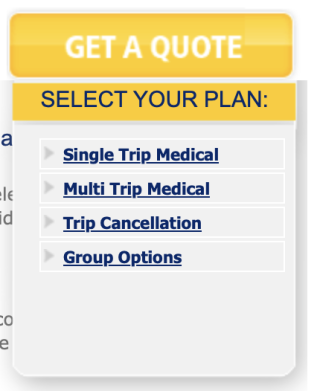
Once you’ve put in all your travel information, HTH will generate quotes for each plan level. You can then select the one that suits your needs and check out with your new policy.
Consider comparison shopping
If you're not 100% sold on purchasing a plan from HTH, you can use a travel insurance aggregator to compare policies across multiple companies at once.
The HTH plan that best suits you will vary based on your needs. For example, if you anticipate having health needs while traveling abroad, you may want to opt for medical-focused plans.
But if you’re planning a more extended trip with many moving parts and want to be reimbursed for things like delayed luggage or missed connections, a TripProtector plan may be more appropriate.
Not everyone has the same needs when traveling, so not everyone should choose the same insurance policy. Here are some things to consider before purchasing a plan.
Look at coverage details
Scour your plan benefits to see what’s covered. If you won't need trip interruption insurance, don’t buy it. Similarly, depending on your health status, you may feel comfortable purchasing a less expensive plan with fewer medical benefits.
Think long term
How often do you travel? If you’re frequently out of the country, you’ll want to weigh the cost of purchasing multiple single-trip plans versus one annual plan. Do the math and see where you’d come out ahead.
Use existing coverage
Many travel credit cards offer travel insurance, though coverage levels will vary. To qualify for this complimentary insurance, you’ll need to pay for your trip using your eligible card. Common card benefits include trip interruption insurance, baggage delay reimbursement and emergency medical insurance.
HTH offers 24/7 travel assistance on its TripProtector plans. The issues with which HTH can help you range from prescription replacements and passport replacements to lost luggage retrieval.
You can contact HTH at 877-865-5979, 610-254-8771 or via email at [email protected] .
One of the best features of HTH travel insurance is its Direct Pay option. This allows your HTH policy to pay your medical costs directly to the provider, eliminating the need for a refund.
If you can't use a provider within HTH’s network and the one you choose won’t accept Direct Pay, it’s possible to submit a claim.
To do so, you’ll need to log in to your HTH account.
From there, you can fill out and submit the paperwork for your claim. This is also true of any trip protection claims you have, such as lost luggage or a trip delay.
Is HTH travel insurance good? You'll rarely find health care plans for travel abroad unless they’re just covering accidents and illnesses.
That’s what makes HTH’s medical policies stand out. The fact that HTH provides long-term policies for expats is another bonus, as many countries require that you provide independent medical coverage.
But its TripProtector plans are somewhat limited in scope compared with those from other insurance companies, plus they lack customization opportunities.
Overall, HTH may be a good option for you if you need to seek health care while traveling and don’t mind missing out on many trip protection benefits. Otherwise, you may want to look elsewhere .
HTH’s trip interruption and trip delay benefits can help reimburse the costs incurred by a flight cancellation.
If you use Direct Pay, you won’t need to file a claim since HTH will pay for your health care visit automatically. Otherwise, the time it takes to receive a refund can depend on a variety of factors, including what you’re claiming and the documentation you submit.
HTH travel insurance is secondary, which means it will pay out after other available insurance benefits.
Yes, HTH plans will cover COVID-19 costs.
HTH offers a few travel insurance plans depending on your needs, including options for single- and multi-trip policies. Before you buy a plan, be sure you’ve understood its coverage and costs, especially compared with other policies.
Travel insurance
NerdWallet's ratings for travel insurance companies take into account the following details about each insurer:
Scope of coverage.
Customizability.
Consumer experience and complaints.
The best travel insurers excel in all of these categories. They provide the information people need to make a purchase without any surprises along the way. They offer insurance at a fair price and allow customers to customize plans to meet their coverage preferences. They're also able to keep their customers happy throughout the relationship.
Data collection and review process
NerdWallet collects over a dozen data points for each insurer we analyze from their public-facing websites and third-party analyses. These data points are then compared against one another and against NerdWallet's standards for good travel insurance companies to determine a star rating.
Data is collected on a regular basis and reviewed by our editorial team for consistency and accuracy. Final star ratings are presented on a scale of one to five stars, where a one-star score represents "poor" and a five-star score represents "excellent."
The reviews team
The writers and editors behind NerdWallet's travel insurance reviews are insurance specialists who have had their work featured by or appear in The Associated Press, The Washington Post, The New York Times, the Chicago-Sun Times, U.S. News & World Report and the Society for Advancing Business Editing and Writing. Each writer and editor follows NerdWallet’s strict guidelines for editorial independence .
In addition to travel insurance, the team covers travel rewards programs, airlines and hotels.
Rating specifics
Our star ratings are weighted based on our editorial and professional opinions. We use the following weightings when rating travel insurers:
Scope of coverage (25%).
Customizability (25%).
Consumer experience and complaints (25%).
Cost (25%).
Scope of coverage ratings are based on assessments of a company’s standard protections, including:
Travel medical insurance.
Trip cancellation.
Trip interruption.
Trip delay.
Baggage and personal belongings, lost luggage.
Emergency medical assistance.
Emergency medical evacuation.
Emergency medical repatriation.
Accidental death and dismemberment insurance.
Rental car coverage.
Customizability ratings factor in whether coverage limits are fixed prices or a percentage of the trip cost (the percentage is generally better), whether a policy has customizations available, and the number of bonus features.
24-hour assistance.
Pre-existing medical conditions coverage.
Extreme sport coverage.
CFAR add on availability.
Travel health insurance.
Interruption for Any Reason.
Travel Inconvenience.
Cancel for Work Reasons.
Electronics coverage.
Consumer experience ratings are based on provider reviews on Squaremouth.com. If the company is not in the Squaremouth database, we default to Google reviews.
Affordability ratings are based on the percentage of total trip cost a plan costs a policyholder. Less than 4% is considered excellent, whereas over 9% is considered poor.
How to maximize your rewards
You want a travel credit card that prioritizes what’s important to you. Here are some of the best travel credit cards of 2024 :
Flexibility, point transfers and a large bonus: Chase Sapphire Preferred® Card
No annual fee: Bank of America® Travel Rewards credit card
Flat-rate travel rewards: Capital One Venture Rewards Credit Card
Bonus travel rewards and high-end perks: Chase Sapphire Reserve®
Luxury perks: The Platinum Card® from American Express
Business travelers: Ink Business Preferred® Credit Card

on Chase's website
1x-10x Earn 5x total points on flights and 10x total points on hotels and car rentals when you purchase travel through Chase Travel℠ immediately after the first $300 is spent on travel purchases annually. Earn 3x points on other travel and dining & 1 point per $1 spent on all other purchases.
60,000 Earn 60,000 bonus points after you spend $4,000 on purchases in the first 3 months from account opening. That's $900 toward travel when you redeem through Chase Travel℠.

1x-5x 5x on travel purchased through Chase Travel℠, 3x on dining, select streaming services and online groceries, 2x on all other travel purchases, 1x on all other purchases.
60,000 Earn 60,000 bonus points after you spend $4,000 on purchases in the first 3 months from account opening. That's $750 when you redeem through Chase Travel℠.

1x-2x Earn 2X points on Southwest® purchases. Earn 2X points on local transit and commuting, including rideshare. Earn 2X points on internet, cable, and phone services, and select streaming. Earn 1X points on all other purchases.
50,000 Earn 50,000 bonus points after spending $1,000 on purchases in the first 3 months from account opening.
Traveling Abroad To See Family: Is It Possible?
- Last updated Jun 25, 2024
- Difficulty Intemediate
- Category Travel

As of June 2024, there are no legal restrictions on travelling abroad from the UK. However, it is important to plan in advance and be aware of any risks or requirements for your specific destination. For instance, the UK Foreign, Commonwealth & Development Office (FCDO) advises against travelling to certain countries or regions due to potential conflict or unrest, and travelling against their advice may invalidate your travel insurance. Additionally, staying with friends or relatives abroad may increase your risk of travel-related infections due to longer stays and closer contact with local communities. Therefore, it is crucial to follow health and safety guidelines, such as maintaining good respiratory and hand hygiene, and consider travel insurance that covers medical treatment and repatriation if necessary.
What You'll Learn
Travel insurance and health precautions, travel restrictions and rules, planning and timing, vaccines and preventative measures, transport and accommodation.

Before travelling abroad, it is important to consider your insurance options and take the necessary health precautions. Here are some key things to keep in mind:
Travel Insurance:
- Trip Cancellation Insurance: This type of insurance covers your financial investment in your trip, such as flights, cruises, or train tickets. It is important to carefully examine the policy to ensure it covers your specific needs, including cancellation due to illness.
- Travel Health Insurance: This type of insurance is crucial if you need medical care in another country, as you will likely have to pay out-of-pocket for any services. Even if your current health insurance covers emergencies abroad, it may not cover pre-existing conditions or adventure activities. Therefore, it is recommended to purchase a short-term supplemental policy that provides direct payments to hospitals.
- Medical Evacuation Insurance: This insurance covers emergency transportation from a remote area to a high-quality hospital and is especially important if you are travelling to a place with limited healthcare facilities. It can be purchased separately or as part of your travel health insurance policy.
- Region and Duration of Travel: Ensure that your travel insurance covers the region(s) you will be visiting and the duration of your trip.
- Emergency Medical Care and Transport: Your insurance should cover emergency medical care and medical transport back to your home country.
- Travel/Accommodation Costs: Consider insurance that covers travel and accommodation costs in case of unexpected delays or cancellations.
- Pre-existing Conditions: If you have any pre-existing conditions, make sure your insurance covers them.
- Activities: Be aware of any activities you plan to engage in and ensure they are covered by your insurance.
- 24-hour Contact Line: Choose an insurance company that provides a 24-hour contact line so that you can reach them at any time during your trip.
Health Precautions:
- Check Your Health Insurance Coverage: Before travelling, understand what medical services your health insurance will cover overseas. Carry your insurance card and a claim form if your policy covers you internationally.
- Medications: Bring enough medication for your trip, and if possible, bring extra in case of delays. Keep medications in their original, labelled containers, and carry a letter from your doctor describing your medical condition and any prescription drugs, including their generic names.
- Vaccinations: Check the recommendations from the U.S. Centers for Disease Control (CDC) and World Health Organization (WHO) for your destination and ensure you have the necessary vaccinations.
- Medical Emergencies: Enroll with the Department of State's Smart Traveler Enrollment Program (STEP) to help locate appropriate medical services and inform your family or friends in case of an emergency.
- Blood Type and Medical Conditions: Prepare a card that identifies your blood type, any chronic illnesses, medications you are taking, and your allergies. If possible, have this information translated into the local language of your destination.
- Pandemic Precautions: Review the CDC's website for information about pandemics and how they may impact your travel, including travel restrictions and border closures.
By taking these insurance and health precautions, you can help ensure a safe and enjoyable trip when visiting family abroad.
Etihad's Policy on Paying for Assessment Day Travel Expenses
You may want to see also
As of August 2022, France has lifted all travel restrictions for incoming travellers. Travellers are no longer required to present a health pass, proof of a "compelling reason" for travel, or a sworn statement of non-contamination. These rules apply to travel to both mainland France and overseas territories. However, foreign countries may have specific entry measures in place, so it is important to check the requirements of your destination country before travelling.
Canada has also lifted many of its COVID-19-related travel restrictions. Proof of vaccination, pre-entry testing, and quarantine upon arrival are no longer required. However, travel documents are still necessary, and it is recommended to wear a well-constructed and well-fitted mask or respirator while travelling.
In the United Kingdom, as of March 2024, travel abroad during lockdown has been illegal for almost a year, with travellers warned against leaving the country unless for essential reasons. Non-essential travel was banned to prevent new COVID-19 variants from entering the country. A "green list" of countries was introduced, where travellers do not need to self-isolate upon their return to the UK. Those returning from countries on the amber list must self-isolate for two weeks and take a test, while travellers from red-list countries must quarantine in a hotel at their own expense.
When planning to visit friends or relatives abroad, it is important to consider the higher risk of developing a travel-related infection. This is due to a longer stay, closer mixing with local people, and the possibility of underestimating the risk of infection in a familiar place. Travel insurance is crucial, even when visiting friends and relatives, as it covers costs associated with medical treatment and transportation back to your home country. It is also important to check foreign travel advice and be aware of any changes to entry requirements.
The Ultimate Guide: How to Travel from London to Pau, France
Destination
The first step is to choose your destination. Consider factors such as the time frame (how much time you have for your trip), your budget, inspiration or any specific places you've always wanted to visit, and visa requirements. Research the visa requirements for your chosen destination, especially if you're staying for an extended period.
Decide on the timing of your trip by taking into account the weather and the peak season for your chosen destination. Travelling during the off-peak season often means fewer crowds and more affordable prices. Check for any specific travel advisories or alerts for your destination, as they can impact your safety and security.
Determine your budget by researching the costs associated with your destination, including accommodation, transportation, food, and activities. Consider the style of travel you prefer, such as luxury hotels or backpacking and staying in hostels. Plan your budget early so you have enough time to save if needed.
Travel Documents
Ensure you have all the necessary travel documents, including a valid passport, visa (if required), and an International Driver's Permit if you plan to drive. Processing times for passports and visas can vary, so start the application process well in advance.
Transportation and Accommodation
Book your transportation and accommodation as early as possible to get the best rates. Compare prices on different websites and consider using transportation other than airplanes, such as cars or trains, to save money. When booking accommodation, research the various options available, such as hotels, vacation rentals, Airbnbs, or hostels, and choose the one that best suits your preferences and budget.
Health and Safety
Check for any necessary shots or immunizations required for your destination, and schedule an appointment with your doctor in advance. Additionally, consider purchasing travel health insurance to cover any unforeseen medical expenses during your trip.
Local Laws and Customs
Research the local laws, customs, and cultural norms of your destination. Be respectful of the local culture and avoid any offensive gestures or behaviours. Check the dress code and packing requirements, and be mindful of any food or drink restrictions to prevent illness.
Travel Insurance and Money
In addition to health insurance, consider purchasing comprehensive travel insurance that covers trip cancellations, delays, or other unforeseen circumstances. Notify your bank about your travel plans to avoid any issues with your credit or debit cards while abroad. Research the local currency and exchange rates, and consider bringing multiple payment options, including cash, cards, and travel money cards.
Activities and Attractions
Research and make a list of places you'd like to visit and activities you'd like to do. Check for any popular attractions that require advance booking to avoid disappointment. Look into city passes or discounts that can save you money on admissions.
Remember to stay updated with the latest travel advice and requirements for your destination, as they can change frequently.
Exploring the Convenient Traveler's Check Options Offered by California Credit Unions
Routine Vaccinations:
Before embarking on your journey, ensure that you are up to date with all your routine vaccinations. These vaccinations safeguard you from infectious diseases such as measles, which can be prevalent in unvaccinated groups. Many diseases prevented by routine vaccinations may not be common in your home country but could still be widespread in your destination country.
Destination-Specific Vaccines:
Different countries have varying health risks and vaccine requirements. Consult the official health websites, such as the Centers for Disease Control and Prevention (CDC) in the United States, to identify the specific vaccines or medicines you may need for your travel destination. Some common vaccines that you may need to consider include Japanese Encephalitis, MMR (Measles, Mumps, Rubella), and Tdap (Tetanus, Diphtheria, Pertussis).
Medical Consultation:
Schedule an appointment with your healthcare provider or a travel health specialist at least one month before your departure. They can provide you with destination-specific advice, vaccines, and medications. During this consultation, discuss your health concerns, itinerary, and planned activities to receive tailored recommendations. Some vaccines require multiple doses, so it's best to see your healthcare provider as early as possible.
Malaria Prophylaxis:
If you are travelling to a region where malaria is prevalent, your healthcare provider may prescribe medications to be taken before, during, and after your trip. It is essential to follow the recommended dosage instructions to ensure adequate protection.
Yellow Fever Vaccine:
If the country you are visiting requires a yellow fever vaccine, you must obtain it from an authorized vaccine center. Only a limited number of clinics provide this vaccine, and you must receive it at least 10 days before your travel date.
Travel Alerts and Notices:
Stay informed about the latest travel alerts and notices for your destination. These updates can impact your travel plans and help you make informed decisions regarding your health and safety.
By following these measures, you can help ensure that your trip to see your family abroad is as safe and healthy as possible. Remember, it is essential to plan ahead and allow sufficient time for your body to build up immunity after receiving any necessary vaccinations.
Explore the Sunshine State: Why Travel to Florida in the Summer
When it comes to transport and accommodation for international travel, there are several factors to consider. Firstly, it is important to plan your trip well in advance, although sometimes you may have to travel abroad at short notice. When selecting a mode of transport, you can choose from various options, including flights, trains, buses, ferries, or even hitchhiking. For example, if you're looking for a more budget-friendly option, you might consider taking a bus or train, as these are often cheaper than flying, especially if you book in advance or take advantage of supersaver tickets. On the other hand, if time is a priority, flying may be the more convenient option, especially for long-distance travel.
When choosing accommodation, it is crucial to consider your budget, location, and the type of accommodation that best suits your needs. If you're travelling on a budget, staying in a hostel or renting an apartment where you can cook your own meals can help you save money. On the other hand, if you're looking for a more luxurious experience, a 4- or 5-star hotel with spa facilities and other amenities might be more suitable. Location is also key – do you want to stay close to the city centre or further out? If you're travelling for work, staying near your workplace can save you time and reduce the hassle of commuting.
When booking accommodation, it is always a good idea to read customer reviews to get an honest opinion of the place. Additionally, if you're travelling with a group, you may want to look into accommodation that offers group discounts or packages. It is also important to be aware of any health risks associated with your destination and take the necessary precautions, such as getting vaccinated or taking antimalarial medication if necessary.
Furthermore, don't forget to consider the transportation options available at your destination. If you plan to use public transport, research the different options and their reliability. Alternatively, if you prefer more flexibility, you might consider renting a car, but don't forget to check the parking facilities at your accommodation.
Lastly, travel insurance is essential, especially when visiting friends and relatives abroad. It can provide you with peace of mind in case of unexpected injuries or illnesses during your trip.
Former Presidents: Travel Restrictions Abroad?
Frequently asked questions.
You can, but only if you have a good excuse. Essential journeys are possible: for work, medical treatment, legal purposes or urgent compassionate reasons.
Essential journeys are possible for work, medical treatment, legal purposes, or urgent compassionate reasons such as visiting a dying relative.
When travelling abroad to visit friends and relatives, you are at a higher risk of becoming unwell from a travel-related infection than a tourist traveller. This is because you may stay longer and spend time mixing closely with local people, increasing your risk of exposure to infections common at your destination. It can also be more difficult to take sufficient precautions to protect your health when staying with friends and relatives.

- Michaela Krajanova Author Reviewer Traveller

- Karisa Garcia Author Reviewer Traveller
It is awesome. Thank you for your feedback!
We are sorry. Plesae let us know what went wrong?
We will update our content. Thank you for your feedback!
Leave a comment
Travel photos, related posts.

Tips for traveling with a baby using ground transportation
- Jun 10, 2024

The Favorite Travel Destinations Based on MBTI Personality Types
- May 28, 2024

When a Sponsored Traveller Can't Pay Medical Bills, What Happens?
- May 15, 2024

Traveling Abroad: Government Employee Edition
- Jun 23, 2024

Exploring Bermuda's Hidden Wonders: Is it Safe for Pregnant Women to Travel to Bermuda?

A Comprehensive Guide on How to Check Your Travel Wallet
- May 11, 2024
Election latest: Boris Johnson appears at first event of election campaign
Former prime minister Boris Johnson has spoken at his first Tory campaign event of the general election, saying Labour will "destroy so much of what we have achieved".
Tuesday 2 July 2024 22:19, UK
- General Election 2024
Please use Chrome browser for a more accessible video player
Election week
- Boris Johnson makes surprise first appearance of election campaign
- Labour 99% certain to beat Blair's landslide - poll
- 'I just want to lose,' Tory minister tells Sky's Sam Coates
- 'Enormous increase' in postal votes
- Reform 'very disappointed' as another candidate quits
- Explained: Why 'supermajority' warnings don't add up
- Electoral Dysfunction: What to watch out for on election night
- Live reporting by Ben Bloch
Election essentials
- Manifesto pledges: Conservatives | Greens | Labour | Lib Dems | Plaid | Reform | SNP
- Trackers: Who's leading polls? | Is PM keeping promises?
- Follow Sky's politics podcasts: Electoral Dysfunction | Politics At Jack And Sam's
- Read more: Who is standing down? | Key seats to watch | What counts as voter ID? | Check if your constituency is changing | Guide to election lingo
- How to watch election on Sky News
Rishi Sunak is on his feet at a campaign event in London as the general election campaign enters its final hours.
He thanks Boris Johnson for his support, and says it is "shameful" to suggest Jeremy Corbyn would have made a better a prime minister.
"Boris was right to say now is the time for all Conservatives to come together to deny Labour that super majority that Keir Starmer craves," he adds.
"We have 48 hours to save Britain from the danger of a Labour government."
He says the Conservatives need to "fight for every vote" and he knows that the election result is not a "foregone conclusion".
"Every single vote matters... we have got to give it one more push," he adds.
He urges people to "get out" and support a number of Tory candidates.
Addressing the Conservatives' record, his says the party has rescued the UK from "Labour's bankruptcy" under David Cameron's leadership, and has delivered the third-fastest growth in the G7.
He also notes the introduction of the pension triple lock, support for Ukraine, the COVID vaccine rollout, and Brexit.
But, he acknowledges that people are "hesitant" to support the party.
"I am not blind to their frustrations with me, with our party. It has been a very difficult few years for our country," he says.
"We haven't got everything right, we haven't made as much progress in every area as we would have liked, but I would say to everybody that this Thursday is not a by-election.
"It is a choice about the future of our country, and that choice has severe consequences for your family if you get it wrong."
He takes aim at Labour's plans for the country, saying it will not tackle illegal immigration, will make the UK "more reliant on foreign energy" and will "raise everyone's taxes".
"You name it - they will tax it," he adds. "A vote for the Conservatives is a vote for lower taxes."
He says there will be tax cuts under a Conservative government, which sparks cheers from the crowd.
"We want Rishi," one person can be heard shouting.
Mr Sunak concludes by saying he will work "day and night" to deliver for the country.
"Do not surrender to Labour. Let's get out there and fight for every vote," he says.
Boris Johnson has taken to the podium to cheers of "Boris".
He thanks supporters for attending the event "way past Sir Keir Starmer's bedtime."
He tells the crowd: "If you are slightly surprised to see me, I'm going to be absolutely clear that I was glad when Rishi [Sunak] asked me to help - of course I couldn't say no."
"We are here because we love our country," he says.
Mr Johnson adds: "Whatever our differences, they are utterly trivial by comparison with the disaster we may face if these so-called opinion polls are right."
"If these polls are right then at the very moment this country has beaten COVID and at the very moment we should be encouraging enterprise and growth - Westminster is about to go diametrically in the opposite direction," he says.
Mr Johnson says Labour will "destroy so much of what we have achieved".
He adds that "it will be the height of insanity if these polls are right".
"Labour are so cocky and complacent, they are barely concealing their agenda anymore," he says.
"Whacking up taxes on pensions and property and persecuting private enterprise and attacking private education and private healthcare.
"All the while, Starmer is so terrified of disappointing left-wing dogma he is reluctant to explain the difference between a man and a woman and sits there with his mouth opening and shutting like a stunned mullet."
He concludes by saying: "Vote Conservative on Thursday!"
Watch Mr Johnson's full speech here .
Michael Gove is speaking at a Conservative campaign event in London.
He tells crowds he wants them to vote with "pride".
"Our children are the best readers in the western world and our schools are the best in Europe - this is all down to the Conservative Party," he says.
Mr Gove says "we got Brexit done" and "had the fastest vaccine rollout in the world".
"Let's stand up and say we are proud to be Conservative," he says.
"Let's stand up and say we are proud Rishi Sunak is our prime minister."
He says "at the heart of Rishi is a moral core than cannot be broken".
He adds: "In an uncertain world we cannot take the risk of the alternative."
Mr Gove asks the crowds: "What has Keir Starmer ever done for us?"
"This Corbyn hugging, tax raising, flip flopping apology for a leader should never be allowed anywhere near Number 10," he adds.
"He is the jellyfish of British politics.
"Transparent, spineless and swept away by any incoming tide."
A Conservative Party campaign event is under way in London.
We expect to hear from the prime minister as he fights to, as he puts it, prevent a "Labour supermajority".
Watch live in the stream above, at the link below - and follow updates here in the Politics Hub.
By Faye Brown , political reporter
Kemi Badenoch and Suella Braverman have denied being associated with website domains purporting to be for future leadership bids.
It comes as a source close to Penny Mordaunt told Sky News she kept her domain active from the 2022 contests "for the same reason you'd keep a spare tire in the boot" - and not to mount a challenge against the PM.
With Rishi Sunak widely expected to lose the election on Thursday, there has been mounting speculation about what direction the Conservatives will head in and who could take command.
While Northern Ireland minister Steve Baker has been open about fancying his chances , other senior Tories are keeping their cards close to their chests.
Over the weekend it emerged a website called kemi4leader.co.uk was registered in April and currently redirects to the Conservative Party homepage.
Business Secretary Ms Badenoch has long been considered a favourite to succeed Mr Sunak on the Conservative right.
However, a source close to her told Sky News the website domain is "nothing to do with her".
Ms Braverman has also told Sky News a website, Suella4leader.co.uk, which redirects to her personal website, has nothing to do with her.
Read more here:
Tonight's poll from Survation suggests Labour are almost certain to outperform the landslide win achieved by Tony Blair in 1997.
It has the party winning 484 seats, with the Tories a distant second on 64 ( see 19.01 post ).
It will likely see Rishi Sunak ramp up his warnings of a Labour "supermajority" even further.
It's a term the Tories have been banding about for weeks - but what does it mean, and why does Mr Sunak think it'll work?
What's the PM getting at?
"Supermajority" is being used by Mr Sunak to refer to the scale of the Labour victory being projected by many pollsters - with some saying they could top the 419 seats won by Tony Blair in 1997.
That gave Labour a majority of 179, but with the Tories tipped to do even worse than they did back then (165 seats), Sir Keir Starmer could end up enjoying the biggest parliamentary advantage on record.
Mr Sunak has said such a "supermajority" would make it harder for the Labour Party to be held to account in the Commons.
Is he right to sound the alarm?
Well, no - because the concept of a supermajority is meaningless in British democracy.
It's a familiar phrase in US politics, where a supermajority of two-thirds really does matter in some votes.
For example, Congress is required for particularly significant legislation like impeaching a president to hit that two-thirds threshold.
In the UK, a governing party only has to hold more than half of the 650 seats in the Commons, whether that be 326 or much more.
A majority of one could be just as effective as something much bigger - as long as the majority party keeps its MPs in line.
Some have argued the "supermajority" concept isn't without merit, for example in referendums, but it's certainly not relevant to this election despite the Tories' best efforts to make it so.
Whether it's healthy for parliament to be as dominated by one party as it could be from 5 July is another question - but whatever the majority Labour might have, there'll be nothing super about it.
The first big moment of election night this Thursday is the exit poll.
It'll provide us with our first major insight into the result.
Our political correspondent Serena Barker-Singh explains all you need to know:
One of the latest Tory tactics has been to go after Keir Starmer for working "part time" - a line that has come about after the Labour leader said he liked to finish at 6pm on Fridays to spend time with his family.
Former adviser to Boris Johnson Jo Tanner tells the Politics Hub she was "shocked" by the rhetoric.
"It's pretty poor from the Tories to be going after Keir Starmer. They've sort of twisted what he was getting at," she says.
"Friday night isn't exactly the biggest night of the week for events - if anything, it is the day.
"I think it is a bit of storm in a teacup, really... I think they do need a release as well from the pressures of the job."
That brings our coverage of tonight's Politics Hub With Sophy Ridge to an end - but the show returns tomorrow at 7pm. Stay with us in the meantime for the latest election news and analysis.
Child poverty is an issue hitting areas across the whole country, and former prime minister Gordon Brown has recently called for the two-child limit on benefits to be scrapped to help tackle the problem.
Labour's shadow minister for employment and social security Alison McGovern says she will never be comfortable while there is child poverty in the UK, but there needs to be economic stability before the cap could be removed.
"We have to make sure we can grow the economy and take our economy out of the political instability we've had," she says.
"This isn't just poverty now, it's experiencing a childhood where the basic necessities of life are completely uncertain."
She explains that if she was made a minister tomorrow, she would want to reform universal credit.
"We need to review it and have a cross-government strategy to tackle child poverty," she adds.
She does point to Labour's plans for free breakfasts for children at school, but admits: "We will need to do much more."
As election day approaches and Labour remain very much in the lead in the polls, questions are starting to be asked about who will be in Sir Keir Starmer's cabinet.
Specifically, there are questions around if all of his shadow ministerial team - should they be re-elected - will definitely get jobs, which is the expectation in the Labour top team.
We ask Labour shadow minister Alison McGovern if that assumption is wrong, and she says Sir Keir's team has "worked very hard" to put together the party's plan for government.
That includes "the first steps" that can "make an immediate difference" and "longer term missions" that "change the structure of our economy".
She goes on to describe Sir Keir as "very 'Steady Eddy' as a leader" and "good to work with" because "he doesn't react overly, and I think he's somebody who's quite consistent".
But the conversations currently, Ms McGovern says, are about their target seats and winning the election.
Be the first to get Breaking News
Install the Sky News app for free

How IBM helps Wimbledon use generative AI to drive personalised fan engagement
This collaboration with Wimbledon teams extends beyond the fan-facing digital platform, into enterprise-wide transformation.
Blueprint for 15%+ higher wrench time: Superior integration of EAM, mobility and procurement in operations and maintenance
3 min read - EAM solutions with advanced asset, work and procurement processes significantly boost wrench time and reduce technician downtime.
Experience unmatched data resilience with IBM Storage Defender and IBM Storage FlashSystem
3 min read - By working together, IBM Storage Defender and IBM Storage FlashSystem effectively combat cyberattacks and other unforeseen threats.
Celebrating diversity and inclusion through storytelling
4 min read - Learn about the first season of the Be Equal podcast series, where IBMers share their unique experiences and personal stories.
Fine-tune your data lineage tracking with descriptive lineage
4 min read - Data lineage is the discipline of understanding how data flows through your organization, and what happens to it along the way.
July 2, 2024
New 4th Gen Intel Xeon profiles and dynamic network bandwidth shake up the IBM Cloud Bare Metal Serv...
Success and recognition of IBM offerings in G2 Summer Reports
IBM and AWS: Driving the next-gen SAP transformation
July 1, 2024
IBM acquires StreamSets, a leading real-time data integration company
June 27, 2024
IBM announces new AI assistant and feature innovations at Think 2024
Best practices for augmenting human intelligence with AI
2 min read - Enabling participation in the AI-driven economy to be underpinned by fairness, transparency, explainability, robustness and privacy.
Microcontrollers vs. microprocessors: What’s the difference?
6 min read - Microcontroller units (MCUs) and microprocessor units (MPUs) are two kinds of integrated circuits that, while similar in certain ways, are very different in many others.
Mastering budget control in the age of AI: Leveraging on-premises and cloud XaaS for success
2 min read - As organizations harness the power of AI while controlling costs, leveraging anything as a service (XaaS) models emerges as strategic.
Highlights by topic
Use IBM Watsonx’s AI or build your own machine learning models
Automate IT infrastructure management
Cloud-native software to secure resources and simplify compliance
Run code on real quantum systems using a full-stack SDK
Aggregate and analyze large datasets
Store, query and analyze structured data
Manage infrastructure, environments and deployments
Run workloads on hybrid cloud infrastructure
Responsible AI can revolutionize tax agencies to improve citizen services
Generative AI can revolutionize tax administration and drive toward a more personalized and ethical future.
Authentication vs. authorization: What’s the difference?
6 min read - Authentication verifies a user’s identity, while authorization gives the user the right level of access to system resources.
Applying generative AI to revolutionize telco network operations
5 min read - Learn the many potential applications that operators and suppliers are capitalizing on to enhance network operations for telco.
Re-evaluating data management in the generative AI age
4 min read - A good place to start is refreshing the way organizations govern data, particularly as it pertains to its usage in generative AI solutions.
Top 7 risks to your identity security posture
5 min read - Identity misconfigurations and blind spots stand out as critical concerns that undermine an organization’s identity security posture.
Intesa Sanpaolo and IBM secure digital transactions with fully homomorphic encryption
6 min read - Explore how European bank Intesa Sanpaolo and IBM partnered to deliver secure digital transactions using fully homomorphic encryption.
What is AI risk management?
8 min read - AI risk management is the process of identifying, mitigating and addressing the potential risks associated with AI technologies.
IBM Newsletters

COMMENTS
Accidents Happen. Get Travel Insurance Protection. Worldwide Coverage. Compare Plans. Get a Free Travel Insurance Quote in Minutes. Protection Anytime, Anywhere, Any Situation.
To be granted a Schengen visa for France (or anywhere else in the Schengen zone), your insurance must meet the following criteria: Guarantee minimum coverage for at least €30,000 in medical expenses. Cover any expenses which might arise in connection with repatriation for medical reasons.
Travel Insurance Requirements for France. Travelers from the U.S. are welcome to visit France without any health restrictions. All requirements for proof of vaccination ended Aug. 1, 2022. Note ...
France Travel Insurance - Medical Insurance for Short-Term Visitors, Tourists & French Visa Applications. France is definitely one of the travel destinations on the 'to -visit checklist' of most world travellers, with its famous and hidden gems. 79.4 million tourists visited France in 2022, making it one of the world's most visited country.
France. The 2024 Summer Olympics will take place in Paris, France, from July 26-August 11, 2024. The Paralympic Games is scheduled for August 28-September 8, 2024. Crowds are expected at these events, and mass gatherings are associated with unique health risks. If you plan to travel to Paris for these events, visit a travel health specialist at ...
As of March 14, 2022, the "vaccine pass" has been suspended in areas where it was required previously. Showing a valid health pass is still mandatory in order to enter health care facilities such as hospitals, retirement homes and places of care for disabled people. You will find more information about the health pass below and on the ...
France almost never accepts U.S. health insurance. Therefore, medical travel insurance is a must to cover you for medical emergencies. Based on our research, the best travel insurance for France ...
Vaccinations and health risks. At least 8 weeks before your trip check: the latest information on health risks and what vaccinations you need in TravelHealthPro's France guide. where to get ...
Travel Medical Insurance for France. Travel health insurance for France is a crucial consideration when planning your trip. While access to healthcare in France is readily available and is provided to anyone, regardless of insurance or nationality, you will still be billed for any medical care you receive.
The health insurance of a foreigner in France obeys different rules depending on your country of origin and your status (examples: student, retired, worker). Javascript est desactivé dans votre ...
You must hold a European Health Insurance Card (EHIC). This allows you to benefit from the care of your care in France by accessing the French health system more easily. To obtain this card, and ...
A good travel insurance plan for visitors to France will include coverage for trip cancellation, terror, and lost or stolen items. For recommended providers, please look at our list of the best travel insurance companies. The Atlas Travel Insurance plan is an excellent option for most applicants, providing affordable coverage and a wide range ...
Before arriving in France, check with your social security body whether it covers healthcare in France, and under what conditions; or whether you have to buy a travel insurance policy covering any medical costs you may incur on French territory. Such insurance policy is mandatory to obtain a tourist visa.
Travel insurance for France is usually a very small fraction of the overall cost of the trip. Depending on which plan you choose (and your age), a travel insurance policy for a one-week trip to France can be from $10 to $50. Here are some of the factors that affect the cost of the policy: Duration of the trip. The longer your trip to France is ...
Visitors from outside the EU cannot benefit from the EU health agreement so will need to have either health insurance or travel insurance in order to cover the cost of any treatment needed in ...
It is mandatory in France to enroll in the health insurance system, which covers prescription drugs, long-term care costs hospital fees. The insurance system is financed through taxes paid by employers and employees, a national income tax, and taxes on certain industries and products. The social security system, to which these taxes are paid ...
Travelers Aged 55+. Pre-existing medical conditions are covered for a reasonable fee and they offer "cancel for any reason" as an add-on. $2,000 COVID quarantine coverage available w/ Safe Travels Voyager plan. Founded in 1998 and underwritten by Nationwide and GBG Insurance.
Editors' Take. We recommend checking out the Travel Medical Basic USA plan if you value having urgent care and emergency room care covered at 100% over coverage for pre-existing conditions ...
The below quotes are for a 30-year-old traveler from Florida, traveling to France for ten days in September 2024, with a total trip cost of $4,000. Policies include coverage for cancellations ...
The carte européene d'assurance maladie (Ceam) is the French version of the European health insurance card (Ehic) which enables you to receive state healthcare if you are travelling in an EU/EEA country or the UK (see below for specific countries covered). If residents in the country receive free healthcare, then you will be entitled to that.
If you require additional medical insurance, try MEDEX Assistance (tel. 410/453-6300; www.medexassist.com) or Travel Assistance International (tel. 800/821-2828; www.travelassistance.com; for general information on services, call the company's Worldwide Assistance Services, Inc. at tel. 800/777-8710; www.worldwideassistance.com).
Health insurance is mandatory for all citizens, whether they're employed or not. France also requires all foreigners or long-term visitors (more than 3 months) to have health coverage. This coverage provides access to the typical health insurance that all French citizens receive. EU citizens may opt for the European health insurance card instead.
The kind of health insurance that you will need depends on the kind of visa you are applying for: If you are applying for a Temporary Long-Stay Visa (visa de long séjour temporaire visiteuror VLS-T Visiteur), which allows you to stay in France for between four to six months, a travel insurance policy will suffice as long as it meets the requirements (see below).
Healthcare in France is on a par with the rest of western Europe but can be costly if you're paying for it yourself. With good-quality travel cover you shouldn't have to. You can claim back the costs on your policy. Travel insurance will also protect you against cancellation of your trip or delay and other types of disruption to your travel ...
Check with your local public health authority pre-travel to determine your eligibility for mpox vaccine. Medical services and facilities. Health care is excellent and available throughout the country. Up-front payment may be required. Make sure you get travel insurance that includes coverage for medical evacuation and hospital stays.
HTH Travel Insurance provides travel medical insurance, particularly for expats and digital nomads, and trip protection plans that offer typical benefits.
Travel; Americans Are All Over Europe This Summer. Here's How to Outsmart the Crowds. Expect even more tourists than usual in the U.K., Italy, France and wherever Taylor Swift is performing
Travel Health Insurance: This type of insurance is crucial if you need medical care in another country, as you will likely have to pay out-of-pocket for any services. ... As of August 2022, France has lifted all travel restrictions for incoming travellers. Travellers are no longer required to present a health pass, proof of a "compelling reason ...
Referring to Ed's report, our political correspondent Serena Barker-Singh asked him about Europe's reliance on Russian gas imports - with UK companies facilitating the trade through insurance and ...
News and thought leadership from IBM on business topics including AI, cloud, sustainability and digital transformation.